#this was an even more prominent theme in the original 4 character version of the series
Text
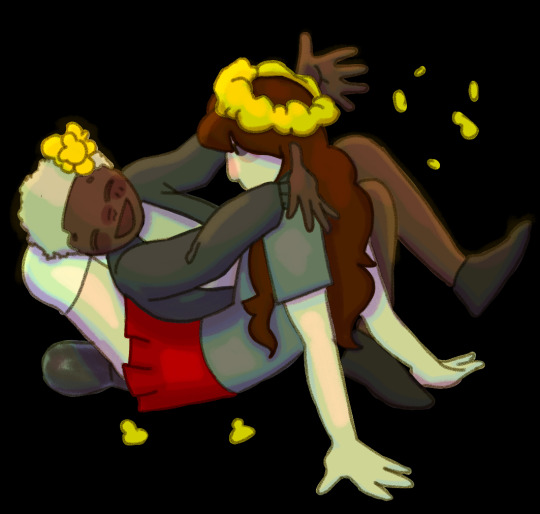
Cringetober day 7: pinterest art base. Original base under the cut!
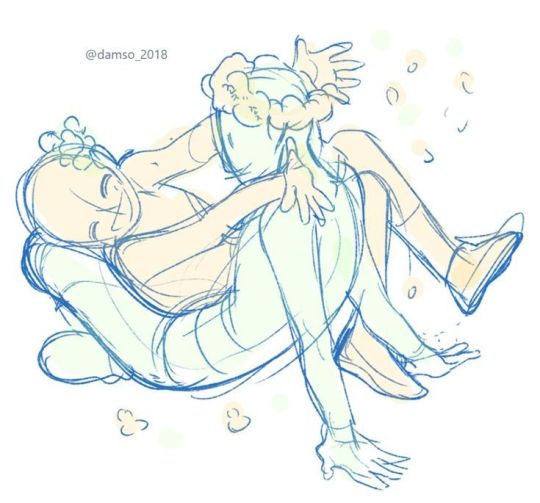
#AAAAAA#the shading turned out so cute omg im so happy#did this on my phone cus i was like 'oh im using a base! itll be a quick one!!' i was WRONG#it was not quick i spent like an hour (normal phone art takes me like. 10-20 minutes)#anyways this drawing is a reference to the original version of boiling over.#vanilla really adores kaths freedom and the way they wear the wild like a crown.#this was an even more prominent theme in the original 4 character version of the series#artinevee#art#oc#cringetober 2023#artists on tumblr#digital art#original character#my art#cute art#digital drawing#boiling over#vanilla#kath
8 notes
·
View notes
Text
I think the biggest issue with Naoto discussion is that there are so many intersecting perspectives with very strong feelings involved, and if a Persona 4 remake does happen, I fully suspect that Atlus is going to have their hands full figuring out how to handle the character in the modern day.
First there's the cultural context of misogyny in the workplace and especially in the legal and justice systems in Japan, which informs Naoto's character a lot. It is important to consider this, as this was a Japanese game made in 2008 at a time where queer visibility wasn't nearly as prominent, but that alone doesn't invalidate criticism to the arc's execution, regardless of creator intention.
A big point of contention is how the arc was handled. Specifically the way it uses talk of body alteration procedures, surgical equipment, and treats the idea of transition as scary. If you consider how draconian the laws behind legally transitioning in Japan are, you can perhaps make a case for why it might cause Naoto internal conflict as complete surgical transition/sterilization/diagnosis were all requirements at the time of the game's development and only recently were declared unconstitutional.
Though, as this excellent video pointed out, it's possible this was meant to be a reference to the story Flowers for Algernon, given the weapon you get if you return there later. However, even if that was the intent, transgender people exist in Japan and have since well before Persona 4, and anime such as The Dirty Pair aired in the 80's with very progressive takes on transness. It's very unlikely that the team behind Persona 4 was completely unaware of queer issues and symbolism, given that Persona 3 had that infamous transphobic joke in the original version's babe hunt.
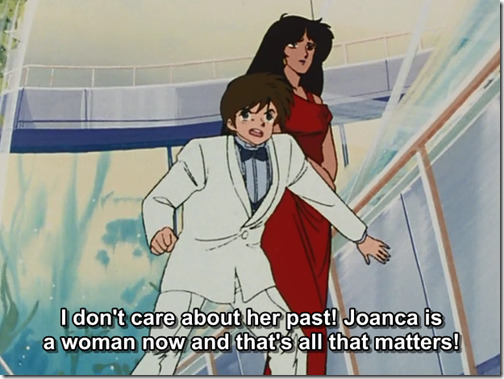
The Dirty Pair, a 1985 anime that was surprisingly progressive.
I think the issue, more than anything, is that the tropes at play don't exist in a vacuum and what comes after Naoto's dungeon raises a lot more red flags. Jokes about Naoto's chest size, the narrative framing Kanji's crush as only acceptable after the reveal, on top of the uncomfortable execution of the romance route in Naoto's Social Link. You get so much "Naoto is actually a girl" in a way where it's other characters talking about/over Naoto, which is what really makes the framing off putting to a lot of people, myself included.
And it's not even that you can't do an arc about a female character fighting against prejudiced preconceptions in the criminal justice field without controversy, because Persona 5 pulled this off far less contentiously.
Sae Niijima deals with many similar themes but doesn't seem nearly as contentious, and I think a large part of that is due to Sae openly presenting as a woman from the start. The game openly depicts the misogyny from Sae's superiors and coworkers, such as how she's unmarried and fighting an uphill battle for success in a male-dominated field. Persona has toyed with these ideas in the aftermath of Persona 4 and even when revisiting older titles.
Persona 2 went back and added the character of Shiori Miyashiro in the PSP release, a lady detective who has a lot in common with Naoto (e.g. knowingly endangering oneself to get the truth behind a supernatural case).
It's also astonishing that we have Lala Escargot in Persona 5, which also had that infamous gay couple that played into horrible stereotypes that were only slightly fixed in royal's international release. Lala, whether trans or a drag queen, is given surprising respect, and her identity is never called into question. A Persona 4 remake could learn from this and cut back on the characters asserting what Naoto feels, what Naoto "really is," etc, and let Naoto and Naoto alone decide.
Ultimately, Naoto means different things to different people, and these things can carry great personal weight and importance. Many trans and nonbinary Persona fans see themselves in Naoto. Others favor Naoto as some flavor of gnc or find Naoto embracing femininity and detective work empowering.
I think the problem is that when this topic comes up, there's a lot of hostility. Trans fans and people who favor trans Naoto get told to shut up at best, and at worst get hit with shit tons of transphobia and gross conduct. On the other hand, I don't think people who prefer more canon-compliant depictions of Naoto are inherently malicious. It's how they approach these discussions and treat people that makes a difference. Just because someone uses she/her for Naoto doesn't mean they're being intentionally transphobic, but I totally get people wanting to avoid material that uses those pronouns all the same.
I also don't think people are wrong to be uncomfortable with the resolution of Naoto's arc in canon. I think people who get upset when fanworks go with trans or NB interpretations of Naoto could stand to be more empathetic, as a lot of those fanworks come from people who connected to Naoto and want to explore what could've been. I don't think more canon-compliant fanworks are inherently malicious either, but no one is obligated to stick around works or spaces that make them feel uncomfortable.
Tbh, I'm just wondering what Atlus will do. Persona 3 Reload removed that one transphobic joke during the babe hunt in all languages. Persona 5 Tactica had male marriage fantasies for Joker. I think Atlus is trying to be more inclusive, but Persona 3 Reload also kept Toriumi's crush on the protagonist and Chihiro defending student-teacher romances, so it's really unclear how much of Persona 4's more divisive aspects will be retooled.
Because it's not just Naoto. Persona 4 has a lot of aspects that haven't aged well, like all the jokes about Kanji being predatory if he's attracted to guys, or Kashiwagi being creepy toward students, or the fatphobia with Hanako while Ebihara's past of being overweight is treated with more sympathy. I love Naoto and Persona 4, but I also think it's important to be able to criticize elements of the game that could be executed better.
#naoto shirogane#persona 4#persona discourse#discourse#persona#tw: transphobia mention#meta#can add additional tags if necessary!#tbh i wasn't sure what all i needed to tw for#sae niijima#long post
95 notes
·
View notes
Text
11 reasons why cap 4 should reintroduce Bucky Barnes as the love interest, an essay
to start this off, i am not writing this essay from a shipping place nor do i believe that this would have any influence at all over the upcoming movie. i expect nothing. this is simply something that i would personally like to see. (of course no hate to anybody who thinks differently)
here are 11 reasons why i think making Bucky into Sam Wilson's love interest in Cap 4 would be a good move for Disney.
-
1. on the Chinese film market - and why it's an irrelevant argument against the inclusion of homosexual themes in Cap 4
the Chinese film market is something that has been blamed for a lack of diversity in Hollywood films a lot lately. many people claim that this market with a lot of buying power has been responsible for the lack of gay and black representation in particular within Hollywood films.
and we have certainly seen Hollywood treating it as such, going so far as to cut gay scenes from movies for their Chinese releases, and vastly minimising John Boyega's (a black actor's) presence in the Chinese poster of Star Wars The Force Awakens.
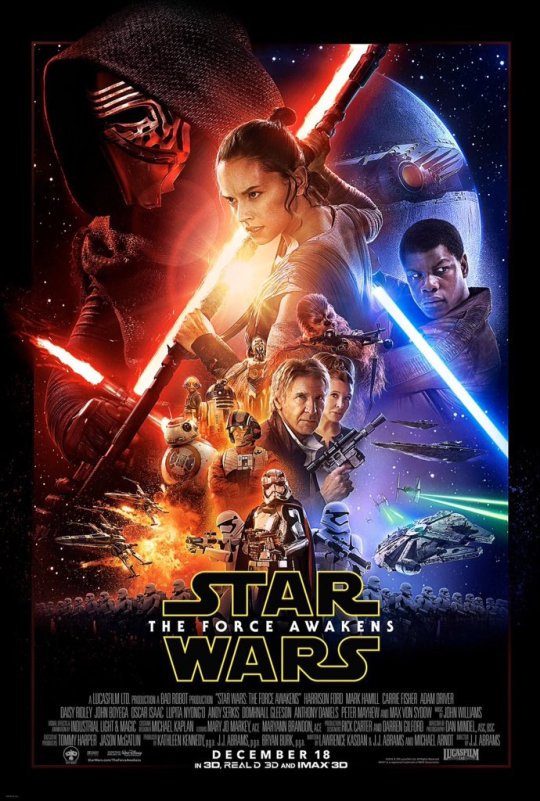

[image ID: on the left is an image of the American poster for Star Wars The Force Awakens, featuring John Boyega prominently on the right-hand side. And on the right is the Chinese poster for the same movie, in which John Boyega is barely visible.]
so we know at the very least that Disney believes this through their own actions and efforts to self-censor for the different markets.
but Captain America 4 is a black-led movie, don't you forget. and Disney can't minimise Sam Wilson/Anthony Mackie in the movie or the poster because it's his movie and his poster. and no amount of creativity in the editing room can change that (thank God!).
so if by their own argument the film is already going to be either banned, panned or slammed in China... then what do they have to fear from making it a gay movie too?
-
2. oh, the queerbaiting
queerbaiting is an unusual cultural idea. and sometimes i find myself thinking that the term is far too easily used, but then all of a sudden i will stumble upon a movie or show that is so quintessentially cruel and overt in it's... well... queerbaiting that i will start to wonder what the hell kind of a bizarre relationship all these straight people seem to have with their friends. take Troy and Abed from Community or John and Sherlock from Sherlock as the perfect examples of this. (in which my reaction to the show's creators saying the show wasn't gay was to ask so then why did you make it so gay?!)
i felt that Sam Wilson and Bucky Barnes in tfatws were getting quite close to this level of queerbaiting.
there was the field scene, the couple's counselling scene, the boat scene, the couple's counselling scene, Bucky going with Sam to face Karli when she told Sam to come alone, the couple's counselling scene, ALL the staring scenes, Sam checking out Bucky's ass here as they said goodbye, the "i would move in with him but" hidden scene, "Uncle Bucky" showing up at the cookout scene, the romantic walking off together into the sunset together ending scene, and the couple's counselling scene. did i forget anything? but i mean seriously, the couple's counselling scene!!! that thing they did with their legs and their crotches while staring deep into each other's eyes, would any straight guy willingly do that? do straight guys crotch-snuggle now?
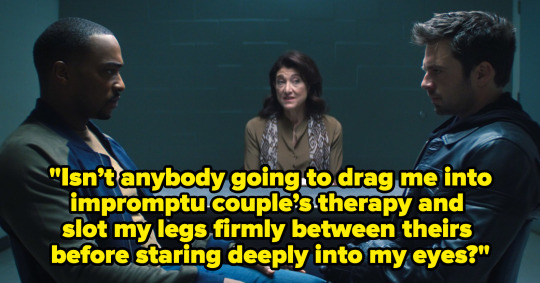
[image ID: an image of Sam Wilson and Bucky Barnes during the therapy scene with the quote, "Isn't anybody going to drag me into impromptu couple's therapy and slot my legs firmly between theirs before staring deeply into my eyes?"]
(yeah i stole this image from a buzzfeed article on the fan reactions to the couple's therapy scene. but given that they stole 80% of the content of that article from fandom tumblr, i think it's pretty even-steven.)
there's also the fact that people started talking about bisexual Bucky Barnes a lot after the tiger pictures line, and the lead writer Malcom Spellman responded to the talk of Bucky's bisexuality with "just keep watching". well we watched, Malcolm. but it's beginning to feel like you were just jerking us around.
-
3. the writing
seriously though, what else is Bucky Barnes doing right now in the MCU? his only remaining connection to anything going on right now is through Sam. there is literally nothing else established that's left for him to do that doesn't involve Sam. he moved to Louisiana to be closer to Sam (canonically), he hangs out with Sam's family (canonically), and Steve is presumably gone and is definitely not coming back for more adventures.
he has no villains or loose ends left. he has no other superheroes that he appears to be in contact with. he has no girlfriend or potential love interest, or even other friends or family. he is living in a tent that he has secretly set up in Sam's backyard and is mysteriously appearing from the bushes when it's time for dinner like a stray cat.
in my opinion there is no other meaningful and pre-established progression for Bucky's character that wouldn't just feel cheap.
plus, i don't think the general audience would be all that surprised if they kissed. i think a LOT of people picked up on all that tension. i think a lot of straight people picked up on all that tension too.
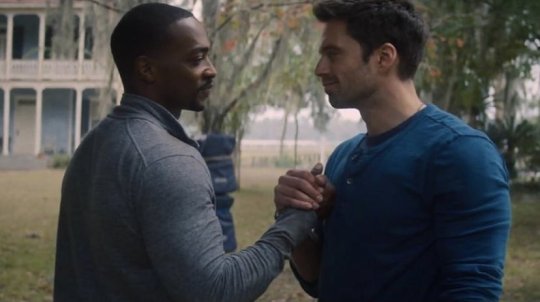
-
4. the chemistry between the actors & the chemistry between the characters
the original pitch for tfatws was essentially just this, it was the chemistry between Sebastian Stan and Anthony Mackie and their respective MCU characters of Bucky Barnes and Sam Wilson.
now obviously Anthony and Sebastian are simply friends, and i wouldn't mean to imply anything more. but they are also not their characters.
Sam and Bucky's scenes together before tfatws were both limited and short, and yet audiences still fell in love with the dynamic between the two characters.
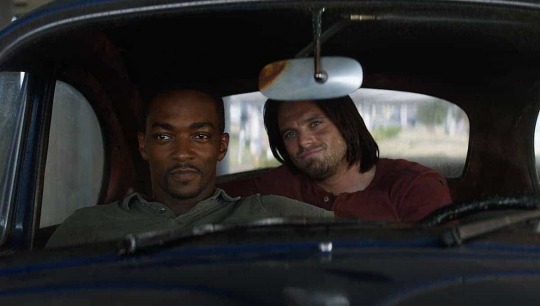
in interviews, these two actors are constantly slipping into character and flirting with each other and frankly it's adorable. plus it's really entertaining. i'd love to see that dynamic, unfiltered, in a movie.
because believe it or not the flirting is actually even more open in their interviews than it was in tfatws. and i'm leaving some links as proof.
this here is known as the "married" compilation
and here's a "lucky dip" selection of interviews - 1, 2, 3, 4, 5,
and here's Anthony trying to get Seb to take his jacket off.
i'm just saying, why not let their chemistry shine? these two are so talented and so entertaining, especially when you put them in a room together. and can you imagine how absolutely hilarious and brilliant it would be to watch them navigate being a couple?
(and for those who bring up the "friends would be uncomfortable pretending to be dating" argument, i'm not here asking for a sex scene or anything. i don't think anyone would expect them to show any more intimacy (physical or emotional) while playing a couple than what they've already shown together in say... tfatws or in their own interviews. not that i actually expect anything regardless.)
-
5. if they were a man and a woman they would've gotten together in tfatws
i have no more to add here. just that... yeah, they would've.
-
6. and i'm not talking about the comics here, i'm talking about the MCU.
i understand fully that none of what i'm saying here falls in line with these characters from the comics. but the mcu itself doesn't fall much in line with the comics either, and these two characters especially are very different from their comics counterparts.
i'm not asking for these two to get together in the comics. tbh i don't think that it would work.
but the mcu Sam and Bucky are different and closer than their comics counterparts. they've got different histories, different backstories, and a very different dynamic. please rest assured that i am only talking about them in the mcu.
-
7. Bucky Barnes is believably bisexual. and Sam Wilson has never been proven to be straight in the mcu, nor has he had a love interest.
(now please continue to keep in mind that these points only stand for the mcu versions of Bucky Barnes and Sam Wilson, and not at all for their comics counterparts.)
Sam Wilson has never had a love interest, which is crazy because have you seen that man! he has had two blink and you'll miss it moments of verbal expression of attraction to women, both in TWS. and that's the extent of it, through his entire history in the mcu.
Bucky Barnes has had a number of surface-level female love interests, but none of them even came close to the level of connection and chemistry that Bucky shares with Sam.
and i'm sorry SarahBucky fans, but i just don't think there's very much to their relationship either. i love Sarah, i really do. but it's Sam who shares all the meaningful moments and history and chemistry with Bucky. and i don't see what making her into a love interest would do for Sarah's character either, what would that add to her story?
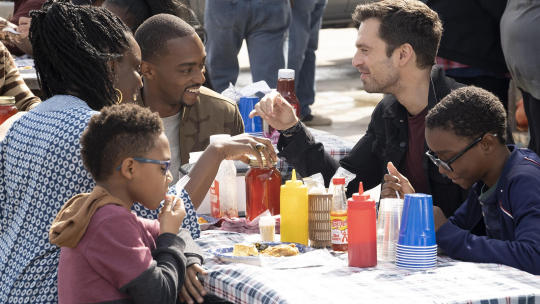
[Picture ID: Bucky at the cookout with Sam, Sarah, Cass and AJ. Bucky and Sam are looking at each other and smiling.]
and also there is the whole tiger pictures thing... again. which does strongly suggest that Bucky is bisexual whether this was intentional on behalf of the writers or not.
-
8. it's representation... AND it feels natural
marvel hasn't had a lot of queer representation that's been noticeably present in the MCU at the time of writing this.
there have been a lot of failures so far, from the bisexual erasure of Valkyrie in Thor Ragnarok to the wlw erasure in Black Panther.
there was queerbaiting almost identical to the bisexual Bucky baiting for Guardians of the Galaxy Vol 2. when asked if he had considered featuring a gay hero in gotg2, director James Gunn stated that "We might have already done that. I say, watch the movie." after the movie's release audiences were understandably confused about the lack of queer representation. To which the director followed up his comments with, "But we don't really know who's gay and who's not. It could be any of them."
there is also Loki, considered by most fans after the airing of his six episode series on Disney+ to be both a poor attempt at both genderfluid representation and bisexual representation. with both attempts being summed up fairly well by the term "blink-and-you'll-miss-it". (also it's just terribly written and Loki doesn't wear any interesting clothes! fanficcers are a Goddamn blessing in this hard time!)
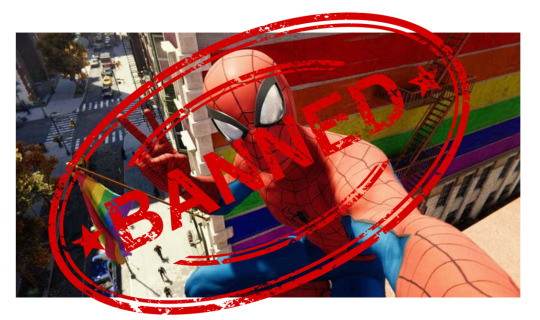
and let us not forget that Andrew Garfield was apparently FIRED for pushing for a bisexual spiderman. a bisexual spiderman within an interracial mlm relationship no less.
so for all these failures, marvel, why not allow us queer fans this? two brilliant and heroic men in a loving interracial relationship. two heroes that we can look up to.
now, one of the biggest detractions from the argument for representation is the idea of "forced diversity". and some poorly written characters certainly do end up feeling forced into the narrative. take Iceman in the comics for example, with Jean Grey just straight up suddenly telling him he's gay. like, marvel, sweetie, that's not how this works! and i don't know a lot of queer people who thought much of that "representation".
but the crux of the "forced diversity" argument is almost always that it feels unnatural within the story, right? and i don't think that anyone could say that about MCU Sam and Bucky ending up together, given these characters' existing chemistry and their history. they've both played characters in gay relationships before so we know that it's not outside of either actor's wheelhouse. and y'all know that Anthony and Seb can act, people. if it's in the script i believe that they'll make it seem like the most natural thing on earth.
-
9. it'd be a nice change
there's been an ongoing meme lately about "Disney's first gay character", the joke being that they continually announce gay characters without really ever including gay characters in their films.
this is to the point where Disney has formed a reputation amongst queer audiences of being homophobic.
if Sam and Bucky were to become a couple, then Disney could have its first actual gay character within a gay relationship. AND have him be in the lead of his own movie, no less.
it's also worth keeping in mind that there's likely an overlap between the people who were outraged by a Sam Wilson Captain America, and the people who'd be outraged by a gay Captain America. and if they were already not seeing the film, then i don't think much is gonna change that.
queer audiences would definitely love it, and the media attention would be guaranteed to be huge. i mean, simply look at the amount of media attention mere rumours of a character's queerness gets you and multiply that by a canon confirmation of said rumours.
but i'm pretty sure that Disney already knows this.
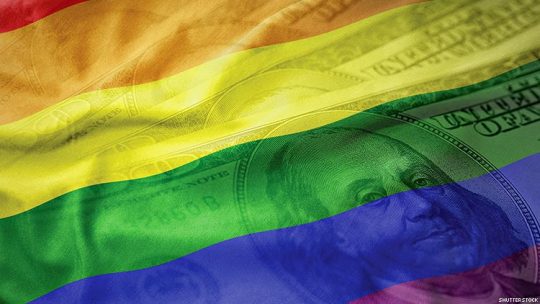
-
10. and yet, in truth, it's not about the representation
in truth i've never felt that i had any trouble relating to characters of any sexual orientation, race, gender, sex, body type, etc. (although that is not to throw any shade at all on people who do wish to see themselves represented) but for me, i think it's more about the story than the packaging.
and yet, a love story is still just a story. straight or queer, monoethnic or interracial. when two characters have chemistry and history and have sacrificed for each other time and time again, and they also can't keep their hands or their eyes off each other, then i'm pretty sure that that's a love story.

straight or queer, monoethnic or interracial, it shouldn't be about these simple labels. it should be about how well written the relationship is. it should be about chemistry, and history, and sacrifice.
because i'm fucking sick of all the hollow, forced romances in media no matter the genders of the participants. i'm sick of lazily written, shallow relationships where any two people sharing the same space for any extended period of time will simply fall in love. it's boring, it's repetitive, and as a writer myself it drives me up the wall!
romance stories suck! and everyone knows that romance stories suck. between twilight, and most of the entire YA genre, and love triangles (so boring), and romance used as poorly-written throwaway subplots in Hollywood movies, the world is in agreement that the romance in western media is simply dreadful. and yet we still want love stories. it's an entire genre that sits at the heart of the human experience (<3), and yet one which so few of today's best known writers seem truly able to capture.
i don't think that i'm the only one who feels this way, either. i suspect it's actually a large part of why fandom is so romance-centred in the first place, that we're all just starving for a good love story.
(btw i think fandom has a reputation for being something that as a whole that it is not. it has this reputation for straight up demanding things and harassing people until they get their way. while unfortunately there are a few people who do this, they're fucking annoying and i swear that they're far from the majority.
in my experience fandom is mostly about writing a five thousand word story at three am while drunk off your ass because it might make someone whom you've never met smile, editing it in the cold light of day, and then posting it. expecting nothing. sometimes getting nothing. and sometimes getting someone send you kudos or a comment so heartbreakingly wonderful that it makes you smile in return.)
-
11. so once again, it is all about the writing.
i want to see Sam and Bucky get together in the mcu, not because they would be a gay couple but because i genuinely believe that their story has potential to be an amazing love story.
and i know the mcu isn't about the romance. it's why in my personal opinion we haven't gotten a lot of good canon romances besides Peter Quill and Gamora. and i don't think that the mcu should be all about the romance either. i fucking love the action and the fighting scenes. i love the comedy. Captain America: The Winter Soldier had no romance and it was a fucking treasure, it was an amazing spy-action-thriller and it made my little gay heart dance. Thor Ragnarok had no romance, and it was an utterly brilliant comedic spectacle action film. not every movie needs romance.
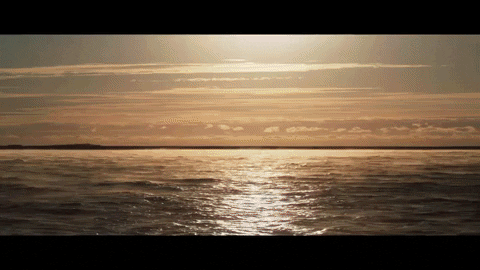
but mcu Sam Wilson and Bucky Barnes were doing couple's therapy and fixing a boat and walking off into the sunset together in tfatws. they were inseparable on the battlefield. they've got a dynamic. it's beautiful, it's romantic, and it's gold.
a budding relationship between them in the next movie would be a good way to explore both characters more without the narrative feeling too stilted and separate. at the end of tfatws, both Sam and Bucky fans found that their respective fave felt somewhat underutilised and that their characters were underexplored.
now, that problem would be even more difficult to remedy in a movie, because the plotline of a movie needs to be really tight to work (giggity). and we know that the central conflict of the movie is gonna be action-based (which is good), but we still need each character's personal journey and growth to tie into the main conflict. (which is another issue that some fans found with tfatws, that these characters didn't really feel connected to the action-based plot on a more personal level.)
if Sam and Bucky are already in a relationship, however, this whole dynamic changes. first, their relationship has already been set up for nicely since TWS and through tfatws and they would officially be the best-fleshed-out couple in the mcu. but most importantly, a relationship gives them a perfect vehicle to explore both of their pasts comparatively and connect them personally to the action-based plot.
do you want to establish that Sam is a little too trusting and naïve? then establish this through his relationship with Bucky, and through showing his placing his trust in Bucky. (rather than through having him sympathise with a villain who threatened to murder his sister and his nephews).
perhaps you want to show Bucky recovering from his trauma? show us how comfortable he is with Sam. they get along, they're enjoying each other's presence, we see more of Sam's life and of his family, and then let Bucky tell Sam something that's raw and dark and honest about his life as The Winter Soldier. something about a memory, one that he only just recalled. he's opening up. and maybe what he tells Sam is even something that sets up the future action-based conflict, to ground that in something real.
you want to explore that Sam has trauma too? do this through Bucky. he tells Bucky a story about his time in the military. in the form of a flashback, he shares his own story of loss to evoke before the audience the shared theme of feeling at fault even when you're simply a helpless bystander to an act of pure destruction.
then, action sequence! and it's directly connected to Bucky's time as the Winter Soldier. explore the grief of someone whose life the Winter Soldier tore apart manifesting into a villain perpetuating the cycle of pain. establish your villain.
Later, Sam is dragged into battle against this villain for protecting Bucky. But Bucky doesn't want Sam to protect him. He feels guilt for what he can't control and he doesn't want Sam getting hurt because of him. Bucky reminds Sam that he has a family, one who needs him and who loves him. He tells him to go home.
Sam reminds Bucky that he's a part of that family. And that sure Sam's a hero and his job is to protect anyone and everyone, but that he's doing it because he wants to. It's not simply to prove that he can, or to prove that he's not a bystander (this connects to Sam's trauma here), but that he's doing it to help people.
and this gets Bucky thinking about who he is and what he's doing here. is he a hero who stands by Sam's side? or is he an ordinary man who stands aside? or perhaps, does he stand alone? what does he stand for? Maybe Sam knows. But does Bucky?
Sam and Bucky fight off the villain again, and for the first time Bucky meets this adversary face to face. And Bucky recognises this villain, and has a flashback to the genuine pain that he inflicted upon them in the form of the Winter Soldier. Bucky freezes mid-fight, he almost dies, and Sam has to save him.
Sam chews Bucky out for almost getting killed because he was afraid for him. but Bucky takes this the wrong way and goes off to fight the villain alone, or perhaps to die alone, he's not quite sure.
He puts up a half-hearted fight. He apologises for what the Winter Soldier has done, and he waits for the killing blow, when Sam swoops down and he saves him. He asks Sam why he saved him and Sam calls him a moron. And then, Sam asks him what sacrificing himself would solve. He tells him that you can't choose your past but you can choose your future (connecting to his own experience of loss and guilt and grief). And that no matter what Bucky Barnes still has a future, whether that's as the Winter Soldier or the White Wolf or just some dork with a day job. And that he has a future as a part of Sam's family too.
Sam fights the villain, and it's toe to toe. He delivers a few good blows, but receives a fair few himself. And then the villain tears off his wings, first one and then the other, in a manner reminiscent of what the Winter Soldier did to him in TWS. Through Bucky's eyes there's a flashback to highlight the parallels. Sam gets back on his feet and he fights his best fight, but is now losing.
And then the heavily injured Bucky steps up and fights by Sam's side, and only together do they take down the villain.
"So... I inspired you, huh?" Sam teases with a smile, utterly exhausted. "With my heroism and-"
"You inspired me." Bucky said, equally exhausted. "Let's leave it at that."
Together, Sam and Bucky go back to the safety and warmth of their family. Sam fixes his wings. Sam goes back to being Captain America. And Bucky... he's around, but it's unclear what he's doing.
That is, until the very end. When Sam is in a fight, and suddenly Bucky shows up and helps him out.
"What are you doing here?" Sam asks.
"I've made up my mind." Bucky says. "I'm the Winter Soldier. But now I'll save lives, Sam. Now, like you, I'll be a hero."
Sam smirks. "So does this make you my sidekick, then?"
Bucky smiles. "C'mon, at least make me a partner." He says.
"How about co-workers." Sam says (in flashback, he remembers back to the death of his last on-the-job partner).
"How about friends." Bucky says, with a wry look.
"Bucky... I don't want to see you put your dumbass self in danger." Sam says.
"Oh, and it's ok for you to go running off into danger on your own all the time?" Bucky asks.
"Yes." Sam says stubbornly. "Absolutely it is."
"Why?"
"Because I'm not a dumbass?!"
"Sam, if you think I'm not gonna be watching your back for the rest of time... then you're the biggest dumbass I know. And I don't care if you need me or not, I will be there for you."
"Because Sam, you're more than Captain America. You're more than a good soldier. You're a good man. And I think sometimes, the world forgets what the difference is."
-
...or something like that.
(i only spent like 15 minutes on that. you know if i were actually writing this movie i would come up with something much better. and if anyone from marvel is seeing this, yes i can come work for you. i will make the time, let's do this thing right!)
-
finale
at the end of the day, whether or not the mcu chooses to make Sam Wilson and Bucky Barnes a couple, it's their decision. and they don't owe me anything.
i'm just some random person on the internet. who thinks that Captain America 4 should #givecaptainamericaaboyfriend
#givecaptainamericaaboyfriend#meta#analysis#captain america 4#caatws#fatws#tfatws#captain america#cap 4#sam wilson#bucky barnes#sambucky#marvel#mcu#mcu phase 4
338 notes
·
View notes
Text
SPOOKY SEASON! An ode to Mo Dao Zu Shi: one of the best BL story created!
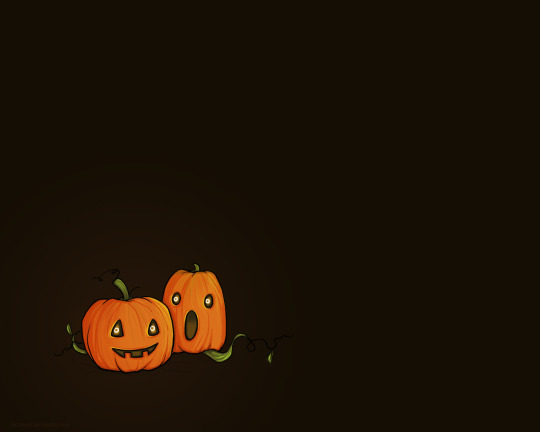
HAPPY HALLOWEEN!!!!!
One last Halloween post and it's about one of my favourite pieces of media in the world of BL, romance, and supernatural stories. Roll your eyes because once again I'm talking about Mo Dao Zu Shi (The grandmaster of demonic cultivation) I mean already with the demons, and cultivation is already hinting why this is Halloween themed, and trust me MDZ has much more than that: from zombies to ghosts, to magical instruments and weapons, and we love our fantasy cultivation sects and clans. Anyhoo, I am here to write a fun post another verdict/review on each of the adaptations available so far for MDZ, yeh you heard me I've listened, read and watched all versions of this masterpiece, and I'm here to tell you to go and do the same for Halloween. Also in case, you haven't heard MTX (the author of MDZ) has another show on its way TODAY! And that's the magnificent, the excellent and incredible Heaven's Official Blessing after marathoning MDZ do that too.
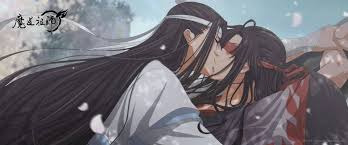
As always with my verdicts: we have ratings: From 1 to 5 (1 being least excited to watch, 5 being most,) how excited am I to delve into these again?
Country: China
Genre: Danmei, Supernatural, Action, Fantasy, Romance, Comedy, BL, Horror,

1.The Book
We begin with the one that started it all. The reason for my devotion and love for this world, for Wei Wuxian and Lan Wang Ji. My heart hasn't stopped loving this book experience. And at first, it wasn't easy to understand all the logic and terms needed to know for this world of cultivation and sects and clans, and magical skills. But once I got the hang of it (maybe after reading it three times I wonder how I had time to do this by the way), this is a book that I keep on returning to, crying to, and just breaking down into a mess too. This book is the most original source for the love story of Wangxian and to be honest its a masterpiece. Now onto the pros and cons, I guess about this adaptation.
Pro:
First, I would say that this is the most non censored version of MDZ, meaning China couldn't mute the romance or delete scenes because it's the original written story. The romance between Wangxian stands out and makes your heart go through a lot of emotions, from frustration at Wei Wuxian not realising how he feels for Wang Ji, to pain because of Wang Ji's perceived unrequited feelings for so long, to happiness when they're just together, to confusion at some drunk scenes and then to all-out shock as the story reveals its self to the villains, the background of Weiying's death and more.
The introduction to all these characters, all of them have a role in the story, all of them are important to keep an eye on, and they all grow and develop throughout the story as we find out more about their circumstances and their own perspective on Wei Wuxian.
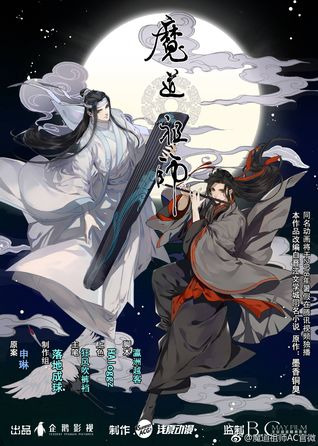
Cons but not actual cons
The book is longggggg. The first time I read it I wondered when we would finally get a resolution or hint that Wei Wuxian finally understands what he's been feeling for sooo long, but it took forever and to be honest even though this is a con to me, it also is a positive for those who love slowwwww burns, and slow reveal to the background and development of Wangxians feelings for each other. There are many missions although essential to the world-building and the actual plot/mystery that at first seem so useless and not needed, but they are there for a purpose, and they do help us find out more clues about what's been going on and why Wei Wuxian was brought back from the dead.
The book is the most non censored version of MDZ, and so there are many questionable moments/questions about Non-consent that occur during moments when Wangxian are drunk. Honestly, these scenes are so weird to me, because they hold so much truth and revelations to Wangji's feelings for Weiying. After all, he's drunk and the most authentic version of himself. There are so many moments (like stealing chickens or showing him the bunnies) that make you just want to cry at his love Weiying and the pain he had to endure when he thought he was never coming back. Still, at the same time, there are many moments where you're like oh wow that escalated, and you feel just a tad discomfort at the idea of the non-con. But like I said these scenes are required for these two to really like give into what they've both been trying to push away or ignore, and it's nice to see how Weiying reacts to his feelings becoming uncontrollable and more prominent.
There are some moments in the book where things seem vague or unexplained (which the other sources did their own thing with), some characters who are mentioned but not really given enough detail, some plot details where it's not fully understood. However, I do think that because the book is already so long, the most critical information needed was there and the reveal of the mysteries were all done well. I think though that it's better to see how it materialises visually hence the other media adaptations.
Ratings: 4/5 -It's not easy to pick up the book and read, but I have so much fun returning to it and laughing along with Wei Wuxian's thoughts and ideas about Wang Ji.
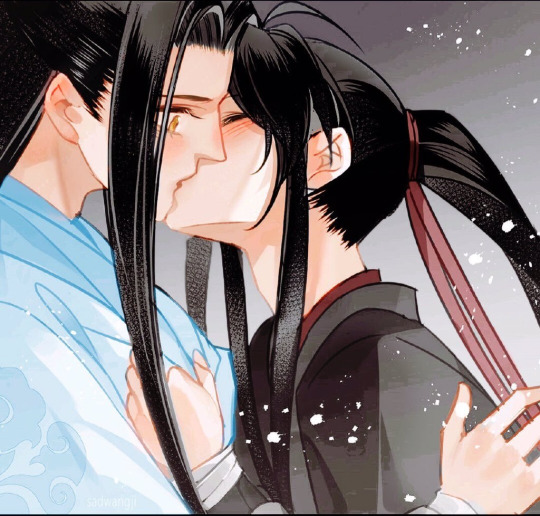
2.The Manhua
I was so shook when I found out MDZ has a manhua. Mostly because China wouldn't really make it easy for the book adaptation to be honestly portrayed visually. But the manga shocked me, it is censored, but the writers and the artists are all so obsessed with this book and this couple that despite having to remove or edit some scenes, they draw some additional scenes and post it online so that international fans can still get to see these moments visually. That is incredible, and I'm so grateful that we have a team of people who respect and love the piece as much as the fans do.
Pros:
With any graphic novel/manga the art of MDZ is fantastic to see, the characters are brought to life with colour and also the inclusion of chibi drawings to make a moment incredibly cute or funny. Weiying is very naughty, so a chibi drawing of him makes us see him like how he's acting a child. I enjoy the manhua of MDZ so much, and I love how they drew each of the characters and the world.
Cons but not really cons:
I think, however, there are better visual sources for MDZ available that is more detailed in terms of characters and includes more information about the world-building. The plot also has to be condensed as well because you can't draw everything from the book. The manhua is also still in the works so, its a very slow upload and it will take years for it to be completed. But this is understandable, and I can't wait to read the full completed copy. If you hate reading and can't stand words, I think the manhua version is for you!
Ratings: 3.5/5 -It’s the waiting that lowered the ratings for me and the fact that I prefer other sources but I’m so grateful for the manhua.
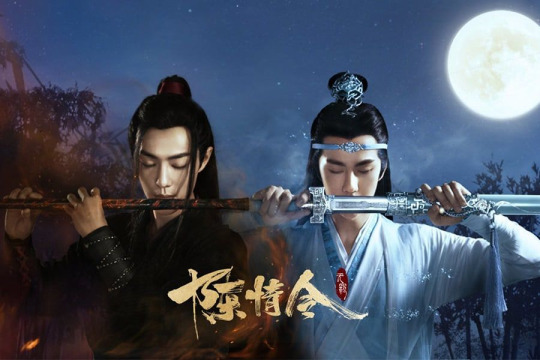
3.The Show
The one that brought international fans like swarms to this story. Untamed shocked all of us in the BL community as the first time we heard about it, sure it was nice to see that Yibo was cast as Wang Ji, but even then his acting wasn't that profound or praised so we didn't care, and Zhan also seemed like an interesting choice for out Weiying. I think there were an outrage and confusion when we heard this was going to be censored and a bromance. It felt like it made no sense because there's no way really to edit the relationship and love of Wangxian, so people went into the show resentful and worried. But after 20 episodes, the anger, worry and upset were erased. Untamed is a masterpiece, and it blows my mind how censored it is but still not really censored? It deletes the questionable moments in the book but adds the essential parts even where we get to see Wang Ji's feelings (Though obviously not mentioned as feelings but respect). We get to watch Weiying realise how much he cherishes whatever he has with Wang Ji and how much he misunderstood the latter, and how much Wang Ji cared for him. The show as Netflix says is not about just friends. Still, it emphasises the connection between these two using subtext clues and symbolisms, and visual metaphors to make sure the audience knows that these two are soulmates and are meant for each other. Here are the other pros and cons of the show:
Pros:
The acting is incredible, like so good and I can't think of two people who were more suited for Wangxian, Yibo shocked me as Wang Ji because although I knew him (because of Kpop), I didn't really think he would pull of stoic but still vulnerable Wang Ji. He was good at showing the emotions of love and longing that has been connected with Wang Ji. Zhan was an excellent Wuxian, he made me smile, he made laugh, he made me so happy because of his mischievous aura, but he also played serious and emotional and resentful Wuxian well as well. I keep crying every time I see the death scene in the show because it's just so done well.The directors and producers who didn't care about hiding the relationship between these two, they still wanted to be respectful to the writer and the source, and they still wanted to show as much as possible that these two loved each other. For that, I'm so grateful and they did a brilliant job with what they could. The character arcs and development and depth; Its the way they took the other characters from the book and fleshed them out giving each of them more depth, more understanding, more dimensionality and more story connecting to our plot, and it broke my heart how much I loved everyone in this show. The actors all performed so well, and some gave me goosebumps at how well they portrayed their characters (Xue Yang!!) like stunning and just a great cast.The storyline was also written in an innovative way, the flashbacks were first shown to the audience, how Wangxian became Wangxian and so the audience felt every single hurt and pain that Wang Ji was feeling. We understood why he acted the way he did. The flashbacks also provided plot structure to the mystery and the actual plot of the show, it left clues, and we watched the villains become villains (secretly), we saw how some characters grew. Each of the arcs in the book was told in a way that it flowed together and made sense. Due to this way of structuring the plot the show became so much more profound in the way it messed with our emotions, every death mattered, and every character had their own story and importance to the audience.
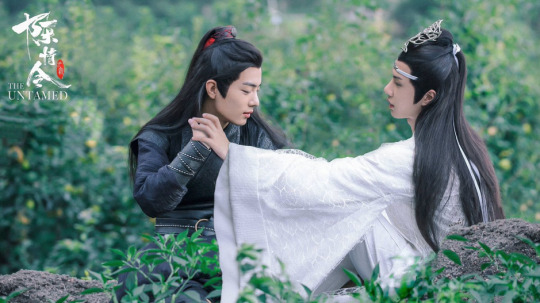
Cons:
The censorship. I've praised how they overcame it, but it's still there, the ending of the show was done this way because of censorship and to be honest I still think everyone should read the book because there are moments where the romance of Wangxian is fun and memorable to see (the confession scene whilst it was done okay in the show because of censorship it doesn't hold as much oomph as it did in the book. Mainly because the events that happened before it was already so filled with angst and drama and the results of the confession Wangxian clinging onto each other despite being in danger is a must-see, the censorship is annoying because it shouldn't be there, it's something that whilst it did help with some stuff, it still feels like an insult to the piece, and it still doesn't sit well with me that China censors their BL. So its a con.
Ratings 5/5 I think I could spend so much time breaking down why Untamed is a masterpiece BL show, but all I can say is despite 50 episodes (longgg) it is worth the time and effort and if you watch BL, go see it.
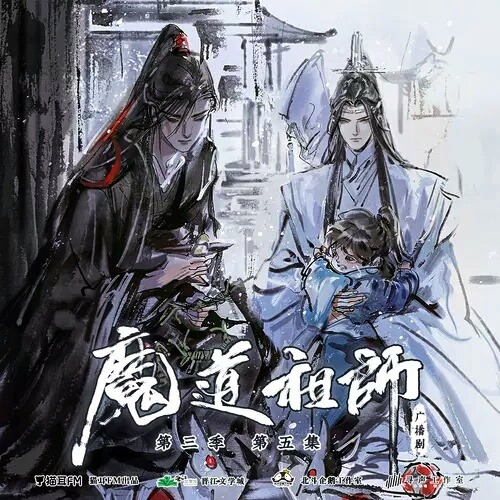
4.The Audio
The audio for the MDZ is like my favourite thing in the world. I love Chinese audiobook dramas; it's an incredible experience to listen to. With MDZ, this is what the show would be if it wasn't censored. The actors for the audio drama are amazing, and I love them so much. The audio drama is three seasons with some extra scenes and it's incredible if you don't want to read the book, then just watch and listen to the audio drama because its the same story but its brought to life by the acting and storytelling. Also though there are some scenes removed, I think the audio drama is the next uncensored gem of MDZ that shows Wangxian's romance the best way possible. I squeal, and I laugh, and again I cry at every single moment; their first kiss, the inn scene, the confession (i spend time pausing it just to cry at how good it is) and more. I just love it, and I prefer it to reading the book. Other pros and cons:
Pros:
The story is structured and told properly, follows all the arcs and events in the book and brings them life by voice acting, and the music is incredible. It's nice to listen to and hear Weiying's thoughts and to also listen to an audible version of the book. The audio drama has all the pros from the book as well.
Cons:
Nothing much to say about the cons. It is not easy to attain the audio drama in English subs, its hard to download and store it, but once you overcome that it's great. I think the audio drama is the most difficult to obtain.
Ratings: My favourite adaptation 5/5
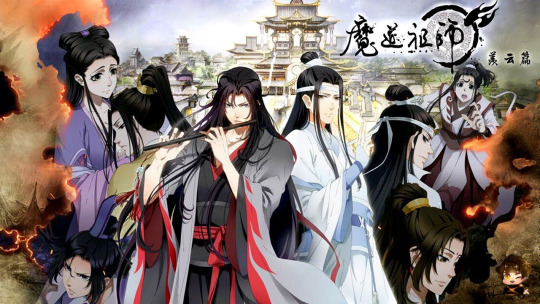
5.The Donghua
Lastly, we have the Donghua or the anime version of MDZ. What can I say about this, its brilliant, masterpiece, it's gorgeous. If you think the art for the manhua is good, the donghua takes it to a different level. The visuals are stunning, the animation is breath-taking, and the story is again following Untamed ways of censoring the story but making sure it doesn't remove the romantic connotations and symbolism to Wangxian. The donghua also follows Untameds way of starting with flashbacks to explain what happened to Weiying before it started. I have nothing else to say about how great this is. It's the same thing I've been saying about all these adaptations. The donghua though is the best visual masterpiece for MDZ, in my opinion.
Pros;
Packed full with symbolism and clues to the plot, it's detailed so well for the storyline and its an excellent way to tell this story. The music and ost for the donghua are also beautiful and gets me emotional each time I hear it.
Cons:
Censorship. That's it, that's what it always is. For me, I think the donghua is the most censored version of MDZ? Or maybe I just feel that way despite the subtext clues; I do feel irritated at the censorship in the donghua. Let's pray Heaven's official blessing overcomes that.
Ratings: 3.8/5 - I love it so much because of the visuals but apart from that I prefer other sources for MDZ. Still the best donghua that exists.

So here you have in an in-depth and messy conversation about one of my favourite media pieces to existing right now in BL. I think I will never stop singing praises at MXT for creating this story and I think there's nothing else I rather do than just spend times when I need a distraction watching, listening or reading this story again and again. What about you all. What do you feel about MDZ? What pros and cons do you have for each adaptation? Which is your favourite. And have you been able to get any rest when we know that Heaven's official blessing is out TODAY!! Let me know your thoughts. Happy Halloween, Enjoy it.
#mo dao zu shi#the untamed#mdzs#wrpup#FVete#october#halloween#wei ying#wei wuxain#lan wangji#mdzs donghua#wwx#lwj#chen qing ling#cql#bl series#danmei
55 notes
·
View notes
Text
Why Are Progressives So Illiberal?
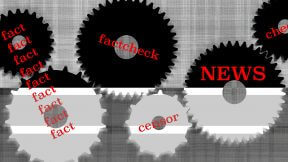
By Victor Davis Hanson January 31, 2021
Progressives adopted identity politics and rejected class considerations because solidarity with elite minorities excuses them from concern for, or experience with, the middle classes of all races.
One common theme in the abject madness and tragedies of the past 12 months is that progressive ideology now permeates almost all of our major institutions—even as the majority of Americans resist the leftist agenda. Its reach resembles the manner in which the pre-Renaissance church had absorbed the economic, cultural, social, artistic, and political life of Europe, or perhaps how Islamic doctrine was the foundation for all public and private life under the Ottoman Sultanate—or even how all Russian institutions of the 1930s exuded tenets of Soviet Marxism.
Pan-progressivism
To be a Silicon Valley executive, a prominent Wall Street player, the head of a prestigious publishing house, a university president, a network or PBS anchor, a major Hollywood actress, a retired general or admiral on a corporate board, or a NBA superstar requires either progressive fides or careful suppression of all political affinities.
According to the Center for Responsive Politics, 98 percent of Big Tech political donations went to Democrats in 2020. Censorship and deplatforming on Twitter, Facebook, and other social media companies is decidedly one-way. When Mark Zuckerberg and others in Silicon Valley donate $500 million to help officials “get out the vote” in particular precincts, it is not to help candidates of both parties.
Google calibrates the order of its search results with a progressive, not a conservative, bent. Grandees from the Clinton or Obama Administration find sinecures in Silicon Valley, not Republicans or conservatives.
The $4-5 trillion market-capitalized Big Tech cartels, run by self-described progressives, aimed to extinguish conservative brands like Parler. Ironically, they now apply ideological force multipliers to the very strategies and tactics of 19th-century robber-baron trusts and monopolies. Poor Jack Dorsey has never been able to explain why Twitter deplatforms and cancels conservatives for the same supposed uncouthness that leftists routinely employ.
Silicon Valley apparently does not believe in either the letter or the spirit of the First Amendment. It exercises a monopoly over the public airwaves, and resists regulations and antitrust legislation of the sort that liberals once championed to break up trusts in the late 19th and early 20th century. As payback, it assumes that Democrats don’t see Big Tech in the same manner that they claim to see Big Pharma in their rants against it.
Wall Street donated markedly in favor of Barack Obama, Hillary Clinton, and Joe Biden in their respective presidential races. Whereas conservative administrations and congressional majorities are seen as natural supporters of free-market capitalism, their Democratic opponents, not long ago, were not—and thus drew special investor attention and support from Wall Street realists.
The insurrectionist GameStop stock debacle revealed how “liberals” on Wall Street reacted when a less connected group of investors sought to do what Wall Street grandees routinely do to others: ambush and swarm a vulnerable company’s stock in unison either to buy or sell it en masse and thus to profit from predictable, artificially huge fluctuations in the price.
When small investors at Reddit drove the pedestrian GameStop price up to well over a hundred times its worth, forcing big Wall Street investment companies to lose billions of dollars, progressives on Wall Street and the business media cried foul. They compared the Reddit buyers to the mob that stormed the Capitol on January 6.
One subtext was: Why would nobodies dare question the mega-profit making monopolies of the Wall Street establishments? The point that neither the Reddit day-traders nor the hedge-fund connivers were necessarily healthy for investment was completely lost.
Surveys of “diverse” university faculty show overwhelming left-wing support, reified by asymmetrical contributions of 95-1 to Democratic candidates. The dream of Martin Luther King, Jr. to make race incidental to our characters no longer exists on campuses. Appearance is now essential. More ironic, class considerations are mostly ignored in favor of identity politics. “Equity” applies to race not class. The general education curricula is one-sided and mostly focused on deductive -studies courses, and in particular race/class/gender zealotry that is anti-Enlightenment in the sense that predetermined conclusions are established and selected evidence is assembled to prove them.
We are also currently witnessing the greatest assault on free speech and expression, and due process, in the last 70 years. And the challenges to the First and Fifth Amendments are centered on college campuses, where non-progressive speakers are disinvited, shouted down, and occasionally roughed up for their supposedly reactionary views—and by those who have little fear of punishment.
Students charged with “sexual harassment” or “assault” are routinely denied the right to face their accusers, cross examine witnesses, or bring in counterevidence. They usually find redress for their suspensions or expulsions only in the courts. What was thematic in the Duke Lacrosse fiasco and the University of Virginia sorority rape hoax was the absence of any real individual punishment for those who promulgated the myths.
Indeed in these cases many argued that false allegations in effect were not so important in comparison to bringing attention to supposedly systemic racism and sexism. In Jussie Smollett fashion, what did not happen at least drew attention to what could have happened and thus was valuable. It was as if those who did not commit any actual crime had still committed a thought crime.
Almost all media surveys of the last four years reflect a clear journalistic bias against conservatives in general. Harvard’s liberal Shorenstein Center on Media, Politics and Public Policy famously reported slanted coverage against Trump and his supporters among major television and news outlets at near astronomical rates, in some cases exhibiting over 90 percent negative bias during Trump’s first few months in office. Liberal editors can now be routinely fired or forced to retire from major progressives newspapers if they are not seen as sufficiently woke.
No major journalist or reporter has been reprimanded for promoting the fictional “Russian collusion” hoax—and certainly not in the manner the media has called for punishment, backlisting, and deplatforming for any who championed “stop the steal” protests over the November 2020 elections. The CNN Newsroom put their hands up and chanted “hands up, don’t shoot”—a myth surrounding the Michael Brown Ferguson shooting that was thoroughly refuted. Infamous now is the CNN reporter’s characterization of arsonist flames shooting up in the background of a BLM/Antifa riot as a “largely peaceful” demonstration. BLM, of course, has been nominated for a Nobel “Peace” Prize. After the summer rioting, one could better cite Tacitus’s Calgacus, “Where they make a desert, they call it peace”.
A George W. Bush or Donald Trump press conference was often a free-for-all, blood-in-the-water feeding frenzy. A Barack Obama or Joe Biden version devolves into banalities about pets, fashion, and food. The fusion media credo is why embarrass a progressive government and thus put millions and the planet itself at risk?
Andrew Cuomo’s policies of sending COVID-19 patients into rest homes led to thousands of unnecessary deaths. Still, the media gave him an Emmy award for his self-inflated and bombastic press conferences, many of which were little more than unhinged rants against the Trump Administration. Anthony Fauci’s initial pronouncements about the origins of the COVID-19 virus, its risks and severity, travel bans, masks, herd immunity, vaccination rollout dates—and almost everything about the pandemic—were wildly off. Yet he was canonized by the media due to his wink-and-nod assurances that he was the medical adult in the Trump Administration room.
It would be difficult for a prominently conservative actor or actress to win an Oscar these days, or to produce a major conservative-themed film. Bankable actors/directors/producers like Clint Eastwood or Mel Gibson operate as mavericks, whose films’ huge profits win them some exemption. But they came into prominence and power 30 years ago during a different age. And they will likely have no immediate successors.
Ars gratis doctrinae is the new Hollywood and it will continue until it bottoms out in financial nihilism. When such ideological spasms contort a society, the second-rate emerge most prominently as the loudest accusers of the Salem Witches—as if correct zeal can reboot careers stalled in mediocrity. Hollywood’s mediocre celebrities from Alec Baldwin to Noah Cyrus have sought attention for their careers by voicing sensational racist, homophobic, and misogynist slurs—on the correct assumption their attention-grabbing left-wing fides prevents career cancellation.
Hollywood, we learn, has been selecting some actors on the basis of lighter skin color to accommodate racist Beijing’s demands to distribute widely their films in the enormous Chinese market. Yet note well that Hollywood has recently created racial quotas for particular Oscar categories, even as it reverses its racial obsessions to punish rather than empower people of color on the prompt of Chinese paymasters.
Ditto the political warping in professional sports. Endorsements, media face time, and cultural resonance often hinge on athletes either being woke—or entirely politically somnolent. A few stars may exist as known conservatives, but again they are the rare exceptions. For most athletes, it is wisest to keep mum and either support, condone, or ignore the Black Lives Matter rituals of taking a knee, not standing for the flag, or ritually denouncing conservative politicians. Those who are offended and turn the channel can be replaced by far more new viewers in China, who appreciate such criticism directed at the proper target.
Again, what is common to all the tentacles of this progressive octopus is illiberalism. Of course, progressivism, dating back to late 19th-century advocacy for “updating” the Constitution, always smiled upon authoritarianism. It promoted the “science” of eugenics and forced race-based sterilization, and the messianic idea that enlightened elites can use the increased powers of government to manage better the personal lives of its subjects (enslaved to religious dogma or mired in ignorance), according to supposed pure reason and humanistic intent.
Many progressives professed early admiration for the supposed efficiency of Benito Mussolini’s public works programs spurred on by his Depression-era fascism, and his enlistment of a self-described expert class to implement by fiat what was necessary for “progress.”
Even contemporary progressives have voiced admiration for the communist Chinese ability to override “obstructionists” to create mass transit, high-density urban living, and solar power. Early on in the pandemic Bill Gates defended China’s conduct surrounding the COVID-19 disaster. Suggesting the virus did not originate in a “wet” market was “conspiratorial”; travel bans were “racist” and “xenophobic.” In contrast, had SARS-CoV-2 possibly escaped by accident from a Russian lab, in our hysterias we might have been on the brink of war.
So it is understandable that progressivism can end up as an enemy of the First Amendment and intellectual diversity to bulldoze impediments to needed progress. To save us, sometimes leftists must become advocates of monopolies and cartels, of censorship, or of the militarization of our capital.
The new Left sorts, rewards, and punishes people by their race. And some progressives are the most likely appeasers of a racist and authoritarian Chinese government and advocates of Trotskyizing our past through iconoclasm, erasing, renaming, and cancelling out. San Francisco’s school board recently voted to rename over 40 schools, largely due to the pressure of a few poorly educated teachers who claimed on the basis of half-baked Wikipedia research that icons such as Lincoln, Roosevelt, and Washington were unfit for such recognition.
Absolute Power for Absolute Good
There are various explanations for unprogressive progressivism. None are necessarily mutually exclusive. Much of the latest totalitarianism is simple hula-hoop groupthink, a fad, or even a wise career move. Loud progressivism has become for some professionals, an insurance policy—or perhaps a deterrent high wall to ensure the mob bypasses one for easier prey elsewhere. Were Hunter Biden and his family grifting cartel not loud liberals and connected to Joe Biden, they all might have ended up like Jack Abramoff.
More commonly, progressivism offers the elite, the rich, and the well-connected Medieval penance, a vicarious way to alleviate their transitory guilt over privilege such as a $20,000 ice cream freezer or a carbon-spewing Gulfstream by abstract self-indictment of the very system that they have mastered so well.
Progressives also believe in natural hierarchies. They see themselves as an elite certified by their degrees, their resumes, and their correct ideologies, our version of Platonic Guardians, practitioners of the “noble lie” to do us good. In its condescending modern form, the creed is devoted to expanding the administrative state, and the expert class that runs it, and revolves in and out from its government hierarchies to privileged counterparts in the corporate and academic world.
Progressivism patronizes the poor and champions them at a distance, but despises the middle class, the traditionally hated bourgeoise without the romance of the distant impoverished or the taste and culture of the rich. The venom explains the wide array of epithets that Obama, Clinton, and Biden have so casually employed—clingers, deplorables, irredeemables, dregs, ugly folk, chumps, and so on. “Occupy Wall Street” was prepped by the media as a romance. The Tea Party was derided as Klan-like. The rioters who stormed the Capitol were rightly dubbed lawbreakers; those who besieged and torched a Minneapolis federal courthouse were romanticized or contextualized.
Abstract humanitarian progressives assume that their superior intelligence and training properly should exempt them from the bothersome ramifications of their own ideologies. They promote high taxes and mock material indulgences. But some have made a science out of tax evasion and embrace the tasteful good life and its material attractions. They prefer private schooling and Ivy League education for their offspring, while opposing charter schools for others.
There is no dichotomy in insisting on more race-based admissions and yet calling a dean or provost to help leverage a now tougher admission for one’s gifted daughter. Sometimes the liberal Hollywood celebrity effort to get offspring stamped with the proper university credentials becomes felonious. Walls are retrograde but can be tastefully integrated into a gated estate. They like static class differences and likely resent the middle class for its supposedly grasping effort to become rich—like themselves.
The working classes can always make solar panels, the billionaire John Kerry tells those thousands whom his boss had just thrown out of work by the cancellation of the Keystone XL Pipeline. It is as if the Yale man was back to the old days when the multimillionaire and promoter of higher taxes moved his yacht to avoid sales and excise taxes and lectured JC students, “You study hard, you do your homework and you make an effort to be smart, you can do well. If you don’t, you get stuck in Iraq.”
There is no such thing as “dark” money or the pernicious role of cash in warping politics when Michael Bloomberg, George Soros, and Mark Zuckerberg, both through direct donations and through various PACs and foundations—channeled nearly $1 billion to left-wing candidates, activists, and political groups throughout the 2020 campaign year.
In sum, the new tribal progressivism is the career ideology foremost of the wealthy and elite—a truth that many skeptical poor and middle-class minorities are now so often pilloried for pointing out. Progressives have adopted identity politics and rejected class considerations, largely because solidarity with elite minorities of similar tastes and politics excuses them from any concrete concern for, or experience with, the middle classes of all races. The Left finally proved right in its boilerplate warning that the “plutocracy” and the “special interests” run America: “If you can’t beat them, outdo them.”
Self-righteous progressives believe they put up with and suffer on behalf of us—and thus their irrational fury and hate for the irredeemables and conservative minorities springs from being utterly unappreciated by clueless serfs who should properly worship their betters.
https://amgreatness.com/2021/01/31/why-are-progressives-so-illiberal/
6 notes
·
View notes
Text
Alastor Playlist and Soundtrack
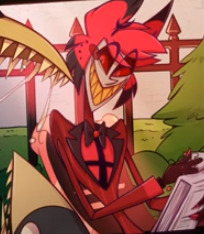
https://www.youtube.com/watch?v=SVGNjWPGVbA&list=PLWFYZb-mcJq3iLDvWh9xpnBNBVkDhXh-w
So many people have wondered what Alastor’s human life could’ve been like. There have been fan art, stories and several animations of Alastor when he was a radio host and serial killer. But surely there could be more clues as to what also occurred.
In fact there are, and they could very well be right in front of your eyes…or should I say, your ears.
Behold an official Alastor playlist.
Yes, Vivziepop herself made a playlist for Alastor a while back.
AlBirdVampPrince on YouTube thankfully provided it before it was lost to the web. When I listened to the cheery old time jazz intermingled with the catchy beats, I was instantly teleported into another time. For several moments, I was immersed in Alastor’s world, watching him dance with flapper ladies, exploring the woods, playing a variety of instruments, and yes, his radio show and murders as well. I couldn’t help but grin from ear to ear listening to the songs.
These songs shed a brand new light on a beloved popular character in Hazbin Hotel. Music is a central theme for the show and the personalities of the characters. Just look at Charlie and Alastor. Sometimes, all it takes is music and a song to delve into a character’s head.
Here is a list of sixteen songs that were shown on the list.
1 “Annie: You’re Never Fully Dressed Without A Smile”
Ah yes, the all-too familiar song from the classic Annie musical in 1982. The song is by Peter Marshall. The song was played during the Iodent toothpaste commercial scene. Mr. Warbucks goes on the radio and offers 50,000 dollars to anyone who claimed to be Annie’s parents. The orphan girls later sing it as they listen to the radio. The meaning of the song: no matter how you dress or what social class you come from, happiness is what makes people stand out. The song has been used in many remakes of Annie such as the 1999 and 2014 versions.
This song would be Alastor’s favorite. He even quoted it in the show, saying to Vaggie, “Smile my dear! You know you’re never fully dressed without one!” It is evident that Vivziepop enjoys Annie and many other musicals, hence all the references in the show and her art.
Ever since then, lyrics and music have been used in dozens of fan art and projects. Gabriel C. Brown, the singing voice of Alastor, even did a cover of the song on YouTube. Often times, the lyrics are displayed whenever Alastor’s mother is drawn. A popular theory suggests that Alastor’s mother told him that he was never fully dressed without a smile, as a way of cheering him up during tough times.
In Kathy Prior 42’s Human Alastor backstory, this song would be played as the intro song as fans immediately associate this song with Alastor. Alastor plays this song after every broadcast, the song that keeps him going every day. It would also appear in the ending credits. Alastor’s Creole mother Antoinette Moreau encourages a young Alastor to smile and stand tall when she sings this to him. For Alastor, it’s not just a fun song…it’s something that helps remind him of his mother and what his purpose is.
Lyrics:
(spoken) This is Bert Healy saying…
(singing)
Hey, Hobo Man
Hey Dapper Dan
You’ve both got your style
But brother
You’re never fully dressed
Without a smile
Your clothes may be Beau Brummelly
They stand out a mile
But brother
You’re never fully dressed
Without a smile
Who cares what they’re wearing
On Main Street
Or Saville Row
It’s what you wear from ear to ear
And not from head to toe
That matters
So, Senator
So, Janitor
So long for a while
Remember,
You’re never fully dressed
Without a smile
(Boylan sister)
Ready or not, here he goes
Listen to Bert
Tap his smilin’ toes
(Healy)
(spoken) Ah the lovely Boylan Sisters
(Boylan Sisters)
Doo doodle-oo doo
Doo doodle-oo doo
Doo doo doo doo
Doo doo doo doo
Your clothes may be Beau Brummelly
They stand out a mile
But brother
You’re never fully dressed without an
(Connie): S
(Bonnie): M
(Ronnie): I
(Connie): L
(All three): E. Smile darn ya smile.
2 “Smile”
Here we have another song about smiling, but this one has a different tone than the previous one. This song was originally sung by Nat King Cole, charted in 1954, composed by Charlie Chaplin. “Smile’ was used as a soundtrack in the 1936 movie “Modern Times.”
Lyrics of this song are shown on old Alastor Zoophobia art by Vivziepop. The art shows an old version of Alastor wearing a black suit doing a magic trick and singing the first few lines of the song.
In Kathy Prior 42’s Human Alastor backstory, Alastor’s mother sings this song to him after he deals with both bullying from his classmates and the constant abuse from his father. It is a song to remind him that smiling is a sign of strength to get through the hard times. Alastor is stunned to find that his mother smiles through the hits and bruises that his father gives her. Even daily discrimination at work doesn’t stop her from doing it. Alastor takes this lesson to heart and makes it into a life-long habit...even after death. Though he smiles all the time, the burden of hiding his feelings inside is only evident to him. In addition, Alastor sings a lament of this song after his mother’s death via the Spanish Flu and Mimzy’s accidental death by poisoning. The song gives out mixed messages: for while it helped Alastor remain confident throughout his life and afterlife, it also conforms to the masculinity message of “boys and men don’t cry.” Sadness is a natural human emotion and there are times when it cannot be repressed.
Lyrics:
Smile, through your heart is aching
Smile, even though it’s breaking
When there are clouds in the sky
You’ll get by…
If you smile
Through your fear and sorrow
Smile and maybe tomorrow
You’ll see the sun come shining through for you
Light up your face with gladness
Hide every trace of sadness
Although a tear may ever be so near
That’s the time you must keep on trying
Smile, what’s the use of crying
You’ll find that life is worthwhile
If you just smile
That’s the time you must keep on trying
Smile, what’s the use of crying
You’ll find that life is worthwhile
If you just smile
3 “Let’s Misbehave”
Anyone else notice the title on one of the Hazbin Hotel thumbnails of Alastor in static? Yes, it is an actual song. The song was written by Cole Porter in 1927. It was a 1928 hit for Irving Aaronson and his Commanders and has been used in several films.
In “Smiling Man” by MuseValentine, a human Alastor says “Let’s misbehave” to a human Charlie before they make love behind Lucifer’s back.
In Kathy Prior 42’s Alastor Human backstory, Alastor was born in 1896, thus in 1928, he is in his early thirties. Alastor and Mimzy get into trouble, they cuddle in a hotel room and almost have sex. Alastor holds back because he doesn’t want to get intimate with anyone, much to her disbelief and sadness. This was before her death. Alastor berates himself for being so careless and begins to question his own sexuality, (which is perceived as abnormal by society and everyone else).
Lyrics:
We’re all alone
No chaperone
Can get our number
The world’s in slumber
Let’s misbehave
There’s something wild
About you, child
That’s so contagious
Let’s be outrageous
Let’s misbehave
When Adam won Eve’s hand
He wouldn’t stand
For teasin’
He didn’t care about
Those apples out of season
They say the spring
Means just one thing
To little lovebirds
We’re not above birds
Let’s misbehave
Let’s misbehave
Let’s misbehave
If you’d be just so sweet
And only meet
Your fate, dear
‘Twould be the great
Event of nineteen twenty eight
Dear!
Let’s misbehave
Let’s misbehave!
4 “You Rascal You”
This song was sung by Cab Calloway in 1931, published in 1929. The lyrics take the form of threats leveled against a man who runs off with the singer’s wife, after the singer was kind to him.
Alastor’s Human backstory has a couple scenes for this song. The first scene is when Alastor finds out that his father had been sleeping with other women behind his mother’s back. Alastor had tried to reason with his father, but he eventually snapped. Alastor has angry thoughts about killing his father, which he eventually does.
The second scene is less prominent. Although Alastor was not in love with Mimzy, he got possessive when other men tried to flirt with her. One racist horny man goes off with Mimzy leaving Alastor by himself. His good friend had been taken from him, after Alastor had been kind to both of them. So what does he do? Hunts down the man and kills him, of course.
Lyrics:
You sure is a rascal
I’ll be glad when you dead, you rascal you!
I’ll be glad when you dead, you rascal you!
When you dead in your grave
No more women will you crave
I’ll be glad when you dead, you rascal you!
I trust you in my home, you rascal you
I trust you in my home, you rascal you
I trust you in my home
You wouldn’t leave my wife alone
I’ll be glad when you dead, you rascal you!
I fed you since last fall, you rascal you
I fed you since last fall, you rascal you
I fed you since last fall
Then you got your ashes hauled
I’ll be glad when you dead, you rascal you!
You asked my wife to wash your clothes, you rascal you
You asked my wife to wash your clothes, you rascal you
You asked my wife to wash your clothes
And something else I suppose
I’ll be glad when you dead, you rascal you!
You know you done me wrong, you rascal you
You know you done me wrong, you rascal you
You know you done me wrong
You done stole my wife and gone
I’ll be glad when you dead, you rascal you!
You asked my wife for a meal, you rascal you
You asked my wife for a meal, you rascal you
You asked my wife for a meal
And something else you tried to steal
I’ll be glad when you dead, you rascal you!
Please don’t let me find you, rascal you
Please don’t let me find you, rascal you
Please don’t let me find you
‘Cause you’ll leave this world behind you
I’ll be glad when you dead, you rascal you!
Ain’t no use to run, you rascal you
Ain’t no use to run, you rascal you
Aint no use to run
I done bought a Gatling gun
And you’re still having your fun, you rascal you!
I’m gonna kill you just for fun, you rascal you!
I’m gonna kill you just for fun, you rascal you!
I’m gonna kill you just for fun
The buzzards gonna have you when I’m done
I’ll be glad when you dead, you rascal you!
You done messed with my wife, you rascal you
You done messed with my wife, you rascal you
You done messed with my wife
And I’m gonna take your life
I’ll be glad when you dead, you rascal you!
5 “I ain’t gonna tell nobody”
This song was made in 1923 by Richard M. Jones. King Oliver and his Creole Jazz band recorded it in 1923…it was likely one of the many songs that Alastor heard and enjoyed. One of the songs that inspired him to be a jazz band leader.
6 “The Charleston”
Ah the Charleston, the popular dance style from the 1920s. The dance used in so many fanfictions and art with Alastor and Charlie in it. And the inspiration for the “Charlastor” shipping name for Alastor and Charlie in the fandom. “The Charleston” was by James P. Johnson and it was in the 1923 Broadway show Runnin’ Wild. A melody of it was made by Arthur Gibbs.
In Alastor’s human backstory, Alastor dances the Charleston with Mimzy in 1923 during the Roaring 20s at the peak of his life and career. He later dances with Charlie at the Hazbin Hotel in Hell.
Lyrics:
Carolina, Carolina, at last they’ve got you on the map,
With a new tune, funny blue tune, with a peculiar snap!
You may not be able to buck or wing
Foxtrot, two-step, or even sing
If you’ve not got religion in your feet
You can do this prance and do it neat
Charleston! Charleston! Made in Carolina!
Some dance, some prance,
I’ll say there’s nothing finer than the
Charleston, Charleston, gee how you can shuffle
Every step you do leads to something new
Man, I’m telling you, it’s a lapazoo!
Buck dance, wing dance will be a back number,
But the Charleston, the new Charleston,
That dance is surely a corner
Sometime, you’ll dance it one time,
That dance called Charleston,
Made in South Caroline!
7 “Runnin’ Wild”
The song is by Duke Ellington, and was made in 1922.
In Alastor’s human backstory, this song that Alastor sings describes the fun care-free moments that Alastor had in his youth. The events included feeding alligators in the bayou, exploring the woods, seeing animals and being outside.
The second scene with this song is in 1922 when Alastor gets tired of Mimzy being clingy. Alastor doesn’t love anyone in a romantic way…he had lost the one person he loved many years ago. Due to past trauma, he puts on a persona but doesn’t trust people enough to let them in fully into his life. Not wanting to meet her expectations of being a perfect man, Alastor longs to be himself and be free again. Alastor and Mimzy try to reconcile at a bar, only for her to die later on. Alastor kills people to vent his frustrations. The song is a reflection of Alastor becoming a villain.
Lyrics:
My gal and I, we had a fight
And I’m all by myself
I guess she thinks now that she’s gone
I’ll lay right on the shelf
I’m gonna show her she’s all wrong
No lonesome stuff for me
I won’t sit home, all alone
She’ll soon find that I’m
Runnin’ wild, lost control
Runnin’ wild, mighty bold
Feelin’ gay, reckless too
Care free mind all the time, never blue
Always goin’ don’t know where
Always showin’ I don’t care
Don’t love nobody, it’s not worth while
All alone, runnin’ wild. Runnin’ wild.
When I first met that gal of mine
It seemed just like a dream
But when she thought she had me right
She started acting mean
Like Mary led her little lamb
She led me all the time
Until the worm had to turn
That’s the reason I’m
Runnin’ wild, lost control
Runnin’ wild, mighty bold
Feelin’ gay, reckless too
Care free mind all the time, never blue
Always goin’ don’t know where
Always showin’ I don’t care
Don’t love nobody, it’s not worth while
All alone, runnin’ wild. Runnin’ wild.
No gal will ever make a fool of me
No gal! I mean just what I say
I ain’t the simpleton I used to be
Wonder how I got that way
Once I was full of sentiment, it’s true
But now I got a cruel heart
With all that other foolishness, I’m through
Gonna play the villain part
Runnin’ wild, lost control
Runnin’ wild, mighty bold
Feelin’ gay, reckless too
Care free mind all the time, never blue
Always goin’ don’t know where
Always showin’ I don’t care
Don’t love nobody, it’s not worth while
All alone, runnin’ wild. Runnin’ wild.
8 “I’m Sitting on Top of the World”
A song by Al Jonson in 1928. Alastor would sing this song as he talks about his new rich life as a radio host. He likes the money but he also likes Mimzy and other women.
Lyrics:
I'm sitting on top of the world,
I'm rolling along,
I'm rolling along.
I'm quitting the blues of the world,
Just singing a song,
Just singing a song.
Glory hallelujah, i just phoned the parson,
Hey, par, get ready to call.'
Just like humpty dumpty,
I'm going to fall.
I'm sitting on top of the world,
Just rolling along,
Just rolling along.'
Some people have diamonds
And beautiful pearls,
While others have children,
Just kiddies with curls.
Keep all of your fortunes,
Keep all of your fame,
I just found a sweetie
Who's changing her name.
:
I'm sitting on top of the world,
Just rolling along,
Just rolling along.
I'm quitting the blues of the world,
Just singing a song,
Just singing a song.
Glory hallelujah, i just phoned the parson,
Hey, par, get ready to call.'
Just like humpty dumpty,
I'm going to fall.
I'm sitting on top of the world,
Just rolling along,
Just rolling along.'
Don't want any millions,
I'm getting my share.
I've only got one suit,
That's all i can wear.
A bundle of money won't make you feel gay.
A sweet little honey is making me say:
I'm sitting on top of the world,
Just rolling along,
Just rolling along.
I'm quitting the blues of the world,
Just singing a song,
Just singing a song.
Glory hallelujah, i just phoned the parson,
Hey, par, get ready to call.'
Just like humpty dumpty,
I'm going to fall.
I'm sitting on top of the world,
Just rolling along,
Just rolling along.
9 “Criminal” (American Horror Story)
This song might reference Alastor’s general life as a criminal...or perhaps Mimzy’s dark thoughts regarding her feelings for Alastor.
Lyrics:
I've been a bad, bad girl
I've been careless with a delicate man
And its a sad, sad world
When a girl will break a boy
Just because she can
Oh, help me
But don't tell me to deny it
I've got to cleanse myself of all these lies
'Till I'm good enough for him
I got a lot to lose, and I'm bettin' high
So I'm beggin' you:
Before it ends, just tell me where to begin
Ooh, What I need is a good defense
'Cause I'm feelin' like a criminal
And I need to redeemed
To the one I've sinned against
Because he's all I ever knew of love
Yeah, What I need is a good defense
'Cause I'm feelin' like a criminal
And I need to redeemed
To the one I've sinned against
Because he's all I ever knew of love
10 “Blood” (My Chemical Romance)
Yes. Vivziepop adores My Chemical Romance. It is obvious from the many MCR songs that she provides to her characters. (“Sing” for Charlie, “Na Na Na” for Cherri Bomb, “Mama” for Angel Dust, etc.) This one called “Blood” undeniably relates to Alastor’s murder and cannibalism activities. (Let’s face it, Vivzie loves musicals so much, Hazbin Hotel is one giant musical, with nearly every character knowing how to sing and play a variety of instruments! Hazbin Logic.)
Lyrics:
Well they encourage your complete cooperation
Send you roses when they think you need to smile
I can't control myself because I don't know how,
And they love me for it honestly, I'll be here for a while
So give them blood, blood, gallons of the stuff
Give them all that they can drink and it will never be enough
So give them blood, blood, blood
Grab a glass because there's going to be a flood
A celebrated man amongst the gurneys
They can fix me proper with a bit of luck
The doctors and the nurses they adore me so,
But it's really quite alarming cause I'm such an awful fuck (oh thank you)
I gave you blood, blood, gallons of the stuff,
I gave you all that you can drink and it has never been enough
I gave you blood, blood, blood,
I'm the kind of human wreckage that you love
11 “Doctor Jazz”
“Doctor Jazz” was made written by Joe King Oliver in 1926 and recorded by Jelly Roll Morton.
This is one of many songs that Alastor sings in his backstory. This song plays when Alastor loses himself in the blissful moments playing trumpets, saxophones and singing onstage. Music and jazz helped Alastor out during hard times of discrimination and him witnessing police brutality against African Americans and disadvantaged individuals. In music, Alastor felt safe, confident, invincible.
Lyrics:
Everybody gets the blues now and then, and don’t know what to do
I’ve had it happen many times to me before and so have you
But those days have gone and past, I found out what to do at last
When I feel down and out, you will hear me shout:
Hello central, give me Doctor Jazz
He’s got what I need, I’ll say he has
When the world goes wrong and I’ve got the blues
He’s the guy who makes me put on both my dancin’ shoes
The more I get, the more I want it soon
I see Doctor Jazz in all my dreams
When I’m in trouble, bounds are mixed
He’s the guy who gets me fixed
Hello central, give me Doctor Jazz
12 “Main Title and Anatomy of a Murder”
The song comes from a 1959 courtroom drama film by Duke Ellington. This song gives off a “sneaky, spy” like vibe, a tension of “who done it,” in the music. This track would play during the mention of the mysterious “Louisiana Lunatic” in the newspapers, plus Alastor’s broadcasts of all the deaths he caused.
13 “God Moves On The Water”
This song is by Billie Willie Johnson in 1929. This song describes the sinking of the Titanic in 1912 (the year of Baxter’s death). It was an event that Alastor wasn’t involved in, but presumably found entertaining like the 1929 Stock Market Crash.
This song could relate to the many hurricane disasters that went on in Alastor’s life in Louisiana but was lucky enough to survive in. The song could also reference the distress and helplessness that people of color, women and other minority groups felt in the clutches of a dominant white society.
Lyrics:
Ah, Lord, ah, Lord
Year of nineteen hundred and twelve, April the fourteenth day
Great Titanic struck an iceberg, people had to run and pray
God moves, moves, God moves, ah, and the people had to run and pray
The guards who had been a-watching, asleep 'cause they were tired
When they heard the great excitement, then a gunshot was fired
God moves, moves, God moves, ah, and the people had to run and pray
Captain Smith gave orders, women and children first
Many of the lifeboats piled right up, many were liable to crush
God moves on, God moves, God moves, ah, and the people had to run and pray
So many had to leave their happy home, all that they possess
Lord Jesus, will you hear us now, help us in our distress
God moves, God moves, God moves, ah, people had to run and pray
Women had to leave their loving ones, see 'bout their safety
When they heard the liner was doomed, hearts did almost break
God moves, God moves, God moves, ah, and the people had to run and pray
A.G. Smith, mighty man, built a boat that he couldn't understand
Named it a name of God in a tin, without a "c", Lord, he pulled it in
God moves, ah, God moves, God moves, ah, and the people had to run and pray
Well Ah, ah, Lord
14 “Minnie the Moocher”
“Minnie the Moocher” by Cao Calloway is a vocalizing catchy song about a beautiful woman named Minnie. This song could possibly relate to rumors about Mimzy and her famous wealthy life.
Lyrics:
Folks, here's a story 'bout Minnie the Moocher
She was a red-hot hoochie-coocher
She was the roughest, toughest frail
But Minnie had a heart as big as a whale
Hi-dee hi-dee hi-dee hi (hi-dee hi-dee hi-dee hi)
Whoa-a-a-a-ah (whoa-a-a-a-ah)
Hee-dee-hee-dee-hee-dee-hee (hee-dee-hee-dee-hee-dee-hee)
He-e-e-e-e-e-e-y (he-e-e-e-e-e-e-y)
She messed around with a bloke named Smokey
She loved him though was cokey
He took her down to Chinatown
And he showed her how to kick the gong around
Hi-dee hi-dee hi-dee hi (hi-dee hi-dee hi-dee hi)
Whoa-a-a-a-ah (whoa-a-a-a-ah)
He-e-e-e-e-e-e-y (he-e-e-e-e-e-e-y)
Oh-oh-oh-oh (oh-oh-oh-oh)
She had a dream about the King of Sweden
He gave her things that she was needin'
He gave her a home built of gold and steel
A diamond car with a p-la-ti-num wheel
Hi-dee hi-dee hi-dee hi (hi-dee hi-dee hi-dee hi)
Ho-dee-ho-dee-ho-dee ho (ho-dee-ho-dee-ho-dee ho)
Skip-de-diddly-skip-de-diddly-diddly-oh (skip-de-diddly-skip-de-diddly-diddly-oh)
Bour'rrigy-bour'rrigy-bour'rrigy-oh (bour'rrigy-bour'rrigy-bour'rrigy-oh)
He gave her his townhouse and his racing horses
Each meal she ate was a dozen courses
She had a million dollars worth of nickels and dimes
She sat around and counted them all a million times
Hi-dee hi-dee hi-dee hi (hi-dee hi-dee hi-dee hi)
Whoa-a-a-a-ah (whoa-a-a-a-ah)
He-e-e-e-e-e-e-y (he-e-e-e-e-e-e-y)
Whoa-a-a-a-ah (whoa-a-a-a-ah)
Poor Min, poor Min, poor Min
15 “Crazy Rhythm”
This song was made by Whispering Jack Smith in 1928.
Perhaps this song is a reference to Alastor having to put aside his free music playing time at the cost of being a famous radio host. Although, Alastor had risen to fame, his former innocence had been lost.
Lyrics:
I feel like the Emperor Nero when Rome was a very hot town
Father Knickerbocker, forgive me, I play while your city burns down
Through all its night I fiddle away
It’s not the right life but think of the pay
Someday I will bid it goodbye, I’ll put my fiddle away and I’ll say
Crazy rhythm here’s the doorway
I’ll go my way, you’ll go your way
Crazy rhythm from now on we’re through
Here is where we have a showdown
I’m too high-hat, you’re too low-down
Crazy rhythm here’s goodbye to you
They say that when a high-brow meets a low-brow walking along Broadway
Soon the high-brow has no brow
Ain’t it a shame, and you’re to blame
What’s the use of Prohibition (banning alcohol)
You produce the same condition
Crazy rhythm I’ve gone crazy too
Every Greek and each Latin, the Russians and Prussians as well
When they seek the lure of
Manhattan, are sure to come under your spell
Their native folksongs they soon throw away
Those harlem smoke songs they soon learn to play
Can’t you fall for Carnegie Hall
Oh Danny, call it a day and we’ll say
Crazy rhythm here’s the doorway
I’ll go my way, you’ll go your way
Crazy rhythm from now on we’re through
Here is where we have a showdown
I’m too high-hat, you’re too low-down
Crazy rhythm here’s goodbye to you
They say that when a high-brow meets a low-brow walking along Broadway
Soon the high-brow has no brow
Ain’t it a shame, and you’re to blame
What’s the use of Prohibition (banning alcohol)
You produce the same condition
Crazy rhythm I’ve gone crazy too
16 “My Shiny Teeth and Me”
Another smile song, by Nate Wants To Battle, this one about how a guy admires his shiny teeth. A reference to Alastor’s self-centered ego. In sheer irony, Alastor has yellow teeth in Hell. Deer man needs to brush his teeth!
Lyrics:
When I'm feelin' lonely - sad as I can be..
All by my self in an uncharted island in an endless sea..
What makes me happy, fills me up with glee:
Those bones in my jaw that don't have a flaw.
My shiny teeth and me.
My shiny teeth that twinkle just like the stars in space,
My shiny teeth that sparkle addin' beauty to my face,
My shiny teeth that glisten just like a Christmas tree.
You know they'll walk a mile just to see me smile...
Woo!
My shiny teeth and me!
Yes they're all so perfect; so white and pearly.
Brush, gargle, rinse - A couple breath mints...
My shiny teeth and me!
My shiny teeth so awesome, just like your favorite song.
My shiny teeth I floss em' so they grow to be real strong.
My shiny teeth I love them and they all love me,
Why should I talk to you when I got 32!
Woo!
My shiny teeth and me,
My shiny teeth and me!
My shiny teeth that twinkle just like the stars in space,
My shiny teeth that sparkle addin' beauty to my face,
My shiny teeth that glisten just like a Christmas tree.
You know they'll walk a mile just to see me smile...
Woo!
My shiny teeth and me.
My shiny teeth and me.
My shiny teeth and me!
17 “The Radio Demon”
An official soundtrack in the pilot episode. The circus music that turns dark with organs playing. It plays when Vaggie tells of how Alastor got into power. This song plays after Alastor’s death and during the ending credits in the backstory. It serves as a transition to Alastor arriving in Hell, the next act in the character arc.
24 notes
·
View notes
Link
An old saying goes that a hero is only as good as their villain, but in the realm of horror, the villain tends to overshadow the hero. This isn't the case quite as much in horror video games, as both heroes and villains can truly manage to be equally as appealing.
RELATED: 10 Scariest Games You Can Play On Switch Right Now
With all that being said, sometimes really good villains from the realm of horror games tend to get overlooked, with there being a cornucopia of excellent examples. In fact, some of them are so sinister, they have somehow managed to overshadow literal demons with their particular brand of villainy.
10 Calypso (Twisted Metal: Black)
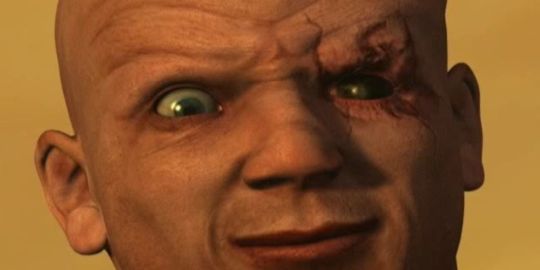
Out of all these games, Twisted Metal: Black is the least strict in terms of horror, but it manages to be scarier than most traditional horror games. Unlike the previous games, where Calypso was a flamboyant character who spoke eloquently, Calypso is silent in Black, with a design more in line with the game's less comical tone.
Portrayed as a creepy, hairless man with a black glass eye who sits upon a throne of damaged cars, Calypso is a bit fairer in this game, but very rarely do the competitors of the Twisted Metal competition get what they want when they approach him. In fact, the only person who can truly defeat him is someone far eviler than he is.
9 Betruger (Doom 3)
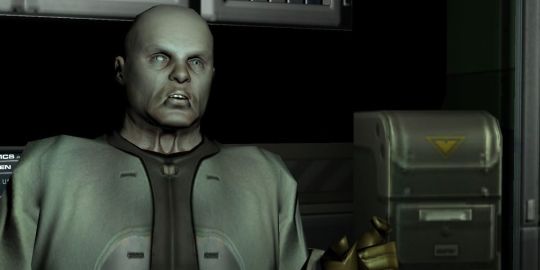
Speaking of bald men with unique eyes, Doom 3's Malcolm Betruger is so creepy he manages to outdo actual demons. The head of the research division on the UAC's Mars Base, Betruger's unorthodox experiments causes his subordinates to be scared of him, which leads to the UAC stepping in and investigating his activity.
It's revealed that Betruger opened up a portal to Hell, leading to an armada of demons taking over the base, with only the infamous Doom Guy being able to stop them. Throughout the game, Betruger taunts Doom Guy, which ends when the villain is turned into a winged demon known as the Maledict, which leads to a terrifying boss fight.
8 Wendy (Rule Of Rose)
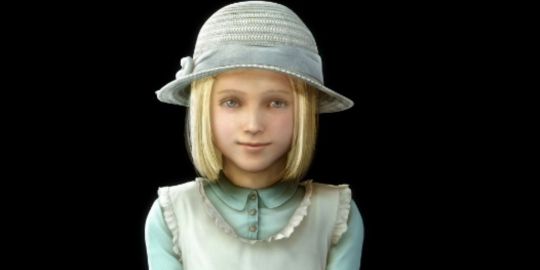
If the game played out like the fairy tales that inspired it, perhaps Rule of Rose would see Wendy and main character Jennifer living happily ever after, but that isn't the case. The founder of The Red Crayon Aristocrat Club, Wendy soon befriends Jennifer and the two fall in love.
RELATED: 10 Horror Games That Would Make Amazing TV Shows
Unfortunately, this love story ends in tragedy, as Wendy becomes jealous when Jennifer shows more affection towards her new dog Brown, so she orchestrates events that lead to Brown being beaten to death. What follows is a series of events that lead to Wendy, along with the rest of The Aristocrat Club, being brutally murdered and Jennifer being left all alone.
7 Lionel Starkweather (Manhunt)
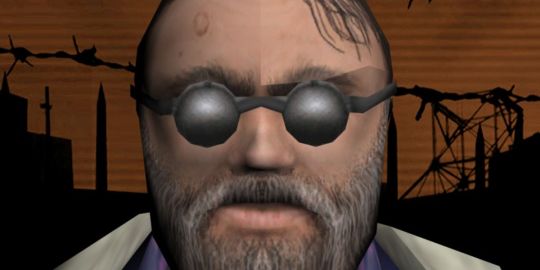
Voiced by the legendary Brian Cox, Lionel Starkweather was once a prominent filmmaker, but a series of flops sent him down a path that led to him making elaborate snuff films. In Manhunt, Starkweather frees convicted murderer James Earl Cash to make him the star of his latest vile venture.
After slaughtering gangsters, hate group members, deranged psychopaths, and a deranged man in a pig suit, Cash murders his way through Starkweather's empire before slicing his head off with a chainsaw. It goes without saying that Starkweather succeeded in making Cash an even colder killer, but he may have done so a bit too well.
6 Walter Sullivan (Silent Hill 4: The Room)

The town of Silent Hill is a scary enough villain as it is, so that should make the idea of any of the games having a true villain almost perfunctory. Regardless, the divisive fourth entry proves that it can be done with serial killer Walter Sullivan.
A murderous religious zealot who feels that it is his mission to murder 21 people in order to complete the "21 Sacraments," Walter Sullivan is a terrifying presence throughout the game. What makes him scarier is how his victims become horrifying monsters that will haunt the dreams of many players.
5 The Xenomorph (Alien: Isolation)

A masterclass in terror, it seems as if Creative Assembly's Alien: Isolation has been somewhat forgotten about. This is a shame, especially since the game recaptured the terror of the original film from 1979, with the Xenomorph being more terrifying than ever. After years of being a bit of a joke, Isolation's portrayal of the creature that laid siege to The Nostromo was a shot in the arm.
RELATED: Alien Isolation: 5 Reasons It's The Perfect Alien Sequel (& 5 Where It Falls Short)
What makes this version of the Xenomorph so terrifying is that its AI is near-perfect and it can show up at any time, attacking Ellen Ripley's daughter Amanda from out of nowhere. The Xenomorph isn't the only antagonist in the game, but it is certainly the scariest.
4 SHODAN (System Shock 2)
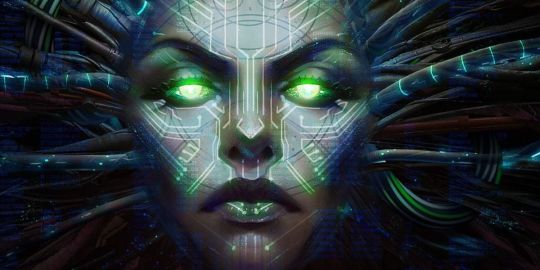
As time has gone by, SHODAN, the main villain of the underappreciated System Shock series, has received a cult following in her own right. While her presence in the first game is memorable, it's the more horror-centric sequel System Shock 2 that gives SHODAN her time to shine.
When the military spaceship Von Braun becomes overrun by an infection that turns the crew into The Many, a survivor named Polito leads an unnamed, amnesia-stricken soldier throughout the madness. Obviously, SHODAN is involved, with her reveal coming in one of the most shocking moments in gaming history.
3 Daniella (Haunting Ground)
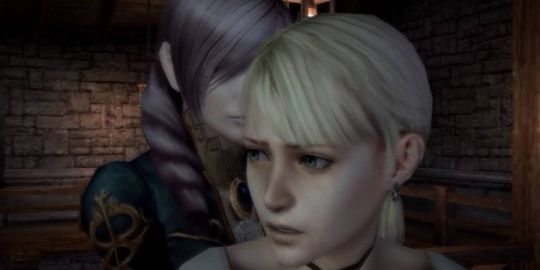
Haunting Ground is one of the most disturbing games ever made, with the game dealing with heavy themes including voyeurism and incest, which are themes that will get under most players' skin. Of the four villains in the game, Daniella is the most chilling, with her inhuman perfection making her highly creepy.
On the surface, Daniella, the maid of the castle that Fiona, the main heroine, is trapped in, seems like a perfect human being. However, this comes at the cost of being able to feel or enjoy anything, causing her to lash out towards Fiona out of jealousy.
2 Scissorman (Clock Tower)
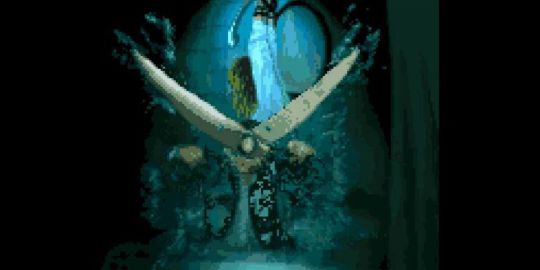
Scissorman, the main villain from the first two Clock Tower games is uniquely terrifying. A persona attributed to the demonic Barrows brothers, the killer that made his debut in a Japanese-exclusive SNES game called Clock Tower, is heavily reminiscent of slasher villains, such as Jason Voorhees and Michael Myers.
RELATED: Clock Tower & 9 Other Forgotten Video Games That Would Make Great Movies
Much like the Xenomorph from Alien: Isolation, Scissorman will appear randomly and can attack the main character, Jennifer Simpson, at any point. Both incarnations of Scissorman take sadistic pleasure in murdering people, which gives them a terrifying prescience that makes up for their small size.
1 AM (I Have No Mouth, And I Must Scream)

Based on the novella written by Harlan Ellison, I Have No Mouth, and I Must Scream is a well-crafted reimagining of a rather dour story. AM, who is actually voiced by Ellison, is a supercomputer created by America, Russia, and China which gained sentience and destroyed all life on Earth, killing everyone, save for five unfortunate souls.
AM, being particularly cruel, made these people invincible and tortured them for 109 years before putting them into a terrifying game. Placing each person in their own scenario that calls upon their distinctive failings, AM is a haunting vision of what the state of the world could turn out to be.
NEXT: 10 Best Vampire Video Games To Sink Your Teeth Into
10 Most Underrated Horror Game Villains, Ranked | ScreenRant from https://ift.tt/2QQt4yi
2 notes
·
View notes
Note
What are your favorite movies and TV shows outside of SW? I’m looking for new things to watch since SW was so disappointing
My tastes are pretty eclectic, so I will stick to just things that are either similar to sw or are in the reylo-esque romance wheelhouse and have happy endings:
Chuck. It is a goofy, light-hearted action-adventure show with extremely endearing characters and a very prominent central romance (seriously, heavy romance and there is a lot of payoff for it, you will be FED- it's kind of slow burn but also shockingly NOT slow burn, they are deep into it pretty much immediately). The main couple is the classic Stoic Badass gradually softened by an innocent they have to protect who is a liability in battle but full of the Power of Heart. Chuck is The Heart btw. He is of that vanishingly rare male Beauty (of B&tB) type. He's incredibly generous and open, Sarah is prickly and closed-off. It is Quality. Very much a gender-swap of your typical cliche anime couple lol. I would recommend stopping at the mid-season finale in season 4, because it's downhill from there. The beginning of season 3 is very rough, but it's definitely worth it to stay for the back half, imo. There are several great endings to choose from before things go to shit, so we don't need to talk about the finale. Probably the most tonally similar to SW thing possible without being high/space fantasy. More humour, more silly, but definitely has a spiritual kinship. Has the best THE BEST 'secret revealed' scenes I have ever seen in anything. If you're into that and were hoping for that in ep IX, you need to watch Chuck.
The Shop Around the Corner. 1940 romance/drama film. You've Got Mail is a remake of it. Jimmy Stewart being profoundly adorable, Frank Morgan (aka the Wizard of Oz), various amusing side characters, and an absolutely deathless double blind 'secretly in love with the workplace nemesis' plot that can and probably has been a great reylo AU.
Mirromask. Fantasy/coming-of-age film. Touted as a 'spiritual successor' to Labyrinth by the filmmakers (one of whom is Neil Gaiman) and let me tell you, that is extremely apt. Beautiful, magical, laden with symbolism and Mask Discourse, and has a great ship. I quote it regularly.
Speaking of which, I'm sure you've seen Labyrinth? If you haven't seen Labyrinth, drop everything and watch Labyrinth.
Legend (the Ridley Scott director's cut, not the theatrical cut). Sumptuous fairy tale, runs on proper fairy tale logic, stunning to look at and overall captivating. Tim Curry. Tim Curry as a lonely tragic lord of darkness who tries to seduce the heroine and has drippingly overwrought monologues.
Howl's Moving Castle. Fairy tale adventure/romance film. Beautifully animated, has the ending you want.
The Silence of the Lambs. Thriller/drama film. Actual masterpiece. Use it as a gateway drug to read the books and rejoice that Clannibal is canon and it is spectacular. Just SotL and Hannibal, you don't need to read the other two. Stan Clarice Starling and revel in that ending. Most triumphant 'villain'/heroine ship of all time (he is not technically a villain but for shorthand's sake).
The Adventures of Baron Munchausen. Terry Gilliam 1988 fantasy/adventure film. THE TRIUMPH OF IDEALISM OVER CYNICS I CANNOT STRESS ENOUGH HOW HEALING IT WAS TO WATCH AFTER THE TROS BULLSHIT HIT. Jonathan Pryce's spiritual villain is basically Chris Terrio and it is cathartic to see imagination and sentiment conquer him.
Sabrina. 1995 romance film. Modern fairy tale with Harrison Ford. Rejecting what you thought you wanted all your life for the thing you actually need, growing up but still believing in magic, beautiful character development across all the leads. Could be (and is irrc) a fantastic reylo AU.
The Scarlet Pimpernel. 1934 adventure film. High romance, secret identities, play-acting, people who aren't at all what they appear to be, falling in love with your own spouse, Big Heroism, guile and wit and audacity. It makes me do little kicks like a happy baby. This is one of the 3-5 films constantly tied for my favourite film of all time. There is a good quality rip free on youtube. Watch it and fall in love with Leslie Howard (this is possibly my favourite acting performance of all time).
Oh, related note. Pygmalion 1938 or My Fair Lady. (The musical is based on this film and borrows from it heavily, including its much more romantic ending compared to the original play.)
The Mummy. 1999 action/adventure/romance film. Very tonally similar to sw. A fucking great time, A+ characters.
EVER AFTER. 1998 romance film. The flawless and perfect and best ever Cinderella adaptation. This is the most satisfying film in history, maybe, the ending is so good it is amazing it exists. Also, it has Richard O'Brien being slimy. Huge selling point. Grapples with identity and stewardship, is brilliant.
Fruits Basket. drama/romance anime. I haven't watched the new version yet, but it's following the manga so I know the story. The original anime didn't do the whole plot (because they caught up with the source material) but it's wonderful and I still recommend it. The central ship is (spoiler.........) a B&tB type where we eventually discover the main love interest both feels like a figurative monster and turns into a literal monster. He has an incredible speech about his relationship with people's fear, it makes me weep. I called the endgame from the first episode and always thought it was obvious, but there is a red herring love triangle dynamic. It's really not annoying, though, because it is a red herring. (I hate love triangles)
I am Dragon. Russian monster romance film. Beautiful, simple fable with a really great heroine.
Jane Eyre. 1943 Gothic Romance film. It's Jane Eyre, byronic hero x sensible heroine love story with much atmosphere and Gothic drama. I stan this version because I am an Orson Welles fangirl and I'm also not convinced it can be improved upon. Elizabeth Taylor's film debut btw.
Hellboy. 2004 action/adventure/romance film. Defying destiny, reconciling identity, monster romance. The complete package and a great time. Tonally similar to SW and probably thematically closest to it out of this whole list. Don't watch the sequel.
Beauty and the Beast 1987 tv series. Exactly what it says on the tin. Deals with the classic B&tB themes, but in a different way. He's not cursed and will never transform into an ordinary man. The first season is very episodic and 'case of the week', but the second season gets more into character drama. It's dated, but if you give it a chance you can get past some of the cheese factor and it's really a unique experience. Its concerns are SO atypical that it feels like something fandom would make rather than a mainstream network show. It was so massively, insanely popular with women at the time that a record of Vincent (the beast) reading poetry topped the album charts. Also Ron Perlman and Linda Hamilton. Stop at season two. Point of interest: George RR Martin wrote for this show.
Stargate (the movie not the series) sci-fi fantasy about a nerdy guy who accidentally a hero.
Possession. 2009... mystery/supernatural/romance. Okay. This is a whole thing. Lee Pace and Sarah Michelle Gellar. It's based on a Korean film I've never been able to find for some reason, but being Hollywood they ruined the romanticism and nuance of the original in the theatrical cut to make a shitty punative ending. However. If you buy it on dvd and go to the alternate ending (which follows the original story) with around 20 minutes left (scene after Lee Pace's character wakes from a bad dream-go to deleted scenes and select the alternate ending), you will get a very, very interesting character study/thriller/redemption about sincerity within deception, compassion, and a major question about second chances with a positive answer. It's kind of dark and kind of astonishingly idealistic at the same time. The heroine makes a very powerful choice, twice over. It's fascinating. If you're into the conflicted and uncertain period in reylo, the part where he is most ambiguous, and you wanted more of that and much darker shades to it, you might be really into this. Also, it should be noted, there is a MASSIVE height difference and they show it off. The film is flawed (and the seams show on the Hollywood rewrite) but idk, it's fascinating. Shocking to me that they even got to shoot the original ending. It is pretty balls to the wall with its themes on forgiveness.
I would recommend getting into kdramas because there is a wealth of female-gaze tropey amazing content, but always check the ending before getting invested. My all-time fave is the 1st Shop of Coffee Prince, but it's not sw related at all lmao. It has a happy ending with all the elements you'd want, but it's not satisfying in execution, so that's it's major flaw and I find that pretty common with kdramas. One that is maybe more relevant is My Love from Another Star, which has a hero who is a little bit like Ben in personality. The heroine isn't my favourite, though. It does have a decent ending.
Oh yeah- brain fart. Kurosawa films and classic westerns were both very influential on SW. Or you can combine both and watch The Magnificent Seven.
#this somehow ended up a wall of text??? I'm so embarrassed#anyway it should be fixed now#recs#anyway 40s movies are fantastic they used to CHURN OUT rom coms and even the bad ones are entertaining#and they were not in the romance ghetto they had prestige actors and directors#I don't know what happened and why this isn't done now because that shit was profitable#another edit:#I messed up my directions on Possession bc I first saw the alt ending on YouTube from the fridge point#but actually the full thing starts way earlier and covers more of the loose ends than I remembered#so I've fixed that now as well#(because I just rewatched it after writing this rec) and serious SERIOUSLY someone watch this movie and scream about it with me#I can't stress enough how important it is you switch to the alt ending and watch that INSTEAD of the theatrical cut but but but#If you do - OMG the ending is incredible#the coded conversation the subtle optimism#it is a meeting place where we Soft Reylos and the edgier villain/heroine stans can meet in the middle
39 notes
·
View notes
Text
Home is where the heart is

This is where Ironwood's loyalty to the Oz collective begins to waver and falls deeper into his Atlas brainwashing.
As stated before Ironwood more or less idolized Oz because of him being one of his heroes reincarnated. Specifically the Warrior King of Vale who from his POV had returned from the death to ask for his help.
Now Ozpin’s predecessor; the in between soul was the Oz that Ironwood knew and called Mentor and even friend. As well as the one who had set Ironwood down the path to power for his own agenda with Salem. In other words Ironwood is in a position of power because of Oz. Now obviously we would be loyal or at least respectful towards the people that have helped us achieve such great heights in society. Now what happened that caused Ironwood to lose respect and loyalty to Oz?
The answer: The Oz he knew died and Ozpin wasn’t him.
As discussed in a earlier section there have been at least 4 different versions of Oz whose action have affected the current events of the story; Their relation to Ironwood can be interpreted as this;
The Warrior King; Childhood hero
Ozpin's predecessor; Very Close friend and Mentor/Benefactor
Ozpin; An anomaly and disappointing mistake
Oscar Pine; 2nd chance for his mentor and friend to return properly
From this we know that Ironwood was closer to the 2nd Oz than Ozpin or Oscar. Due to the fact that the 2nd was the one who had elevated him to positions of power as well as feeding his ego and pride about being a chosen one. And given from specific dialogue Ironwood has said about Oz, it is quite possible that Ironwood has molded himself after his former mentor. This quote for example;
“I refuse to believe that a man that I've trusted for so long would act so... passively.”
—Ironwood, to Glynda Goodwitch in regards to Ozpin
Might tell us what kind of man the 2nd Oz was before becoming the passive Ozpin that Ironwood argues with. This quote and several other lines from Volume 7 tells us that Ozpin's predecessor was more active, straight forward, and demanding than Ozpin ever was. If this is true then Ironwood has tried his best to be and emulate the 2nd Oz for 1 of 2 reasons
He believes this to be who his hero was as he only met the second and doesn’t know what the king was like and assumes the 2nd is the overall default when it comes to handling the Salem threat.
He saw this as the most efficient Oz given the circumstances and the results surrounding the 2nd.
Either way it shows just what kind of bond these two had before the 2nd becomes Ozpin. And as even the series has gone out of its way to show Mentors have a long lasting impression on the students. Examples being;
Student/Mentor
Ruby Rose/Qrow Branwen; Shepherd of right and wrong
Blake Belladonna/Adam Taurus; Need for redemption
Weiss Schnee/Winter Schnee; Break your chains and be free
Jaune Arc/ Pyrha Nikos; Motivation to be better
So yeah the show does have some sort of narrative theme for its student/mentor dynamics. As for Ironwoods and the 2nds dynamic can more or less be summed up by something like this; Duty before self. Not a great dynamic but it was there dynamic. But what exactly changed this one has to wonder?
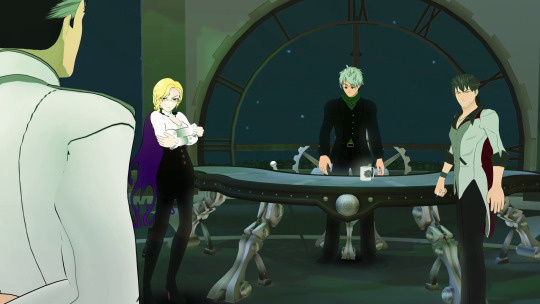
Ozpin.
Basically sometime after Ironwood's graduation in 29/26? B.F.B and before Team STRQ’s first year at Beacon in 23 B.F.B. the 2nd Oz has most likely died and reincarnated into Ozpin. The reason I say the 2nd has died by this point is from dialogue by Raven which makes it clear that Ozpin has already become the next man with 2 souls by the time strq attends beacon. This is further supported by Ironwood’s line in A New approach;
“That's never happened before.”
This tells us that Ironwood has already witnessed the reincarnation cycle in the case of the 2nd becoming Ozpin. There's an estimated 3-6 year gap for this event to happen, and by the time Ironwood has found his Old friend/Mentor he is more or less shocked. Not because his friend is back from the dead(again) but because he is changed and not what Ironwood expected of Ozpin.
Imagine this scenario;
You are set forward on the path of power so you and your mentor can better efficiently combat a malevolent force of evil. The mentor has practically given you everything you need to achieve this high position of power with the benefits that come with this newfound status. Things are looking well. Then all of a sudden the mentor dies. You now hold onto the hope that he would come back as he probably said he would, but you're a little skeptical of whether or not he would or could come back. Some time passes and you do find him again. Only to your surprise is he changed. Changed from the Active and efficient leader he knew to the passive, and lax anomaly that is Ozpin.
Now the way Ironwood talks about Ozpin’s predecessor in comparison to his onscreen interactions with Ozpin shows a great divide in their relationship. Ironwood saw Ozpin as this pale shadow of his former friend while he saw his predecessor as the ideal leader that he was loyal to. Once that was made clear Ironwood saw Ozpin as an ineffective leader and left Ironwood wondering what had happened to his proactive leader and mentor. And to Ironwood the problem was Ozpin and as such he blames Ozpin for not either merging properly with his predecessor or for being a falsely chosen vessel for his hero. Either way he did not have much faith for Ozpin.
As volume 6 had shown us each Oz was different in one way or another. Some were depressed and gave up, others were hopeful and continued onward and each one had their own way of doing things. For example the King Oz before the War you can say was more relaxed and diplomatic like Ozpin while the 1st Ozma reincarnation was more like Oscar wondering WTF is going on with this soul in his body and just goes along with it. With this in mind its different bodies with the same soul and memories but new ideas that are being explored in accordance with the current vessel's personality. As such we can guess the guy after the King was heavily affected by the great war either during or after it. Once the King had died and reincarnated into this new Oz he was more or less a mix of the idealistic Ozpin, and the Realistic Ironwood. Once he become Ozpin he leaned towards the idealistic side while Ironwood favored the realistic side
As the show clearly defines, Ozpin and Ironwood didn’t exactly have the best working or good relationship. Especially in comparison towards the other current known members of the Oz gang like Qrow, Glynda, Theo, etc. This is because Ozpin was more for living and enjoying life as opposed to Ironwood’s service before everything else mantra that he mistakenly got from the last Oz.
So yeah that swift in loyalty is pretty apparent. And it further grew and festered as Ironwood focused on the progress of Atlas. While Ozpin again was rebuilding his world status as the youngest headmaster of Beacon and as well as recruiting team STRQ to the cause. While the Wizards away the soldiers will play or in Ironwood’s case descend further into the toxic ideology of Atlas.
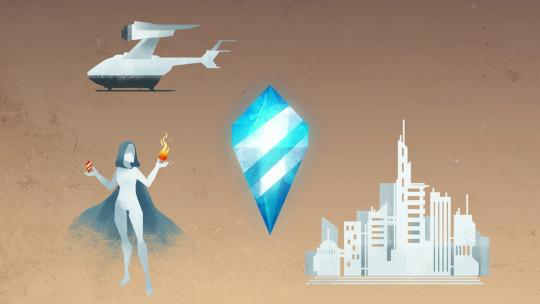
Now we go into what this section was originally meant to be about. How Ironwood grew to value Atlas above all else and how he eventually became the embodiment of Atlas itself. Carrying on the plans of the last Oz, Ironwood continued in the pursuit of power and control over Atlas as the figurehead in order to counteract Salem. Keep in Mind Ironwood was most likely a young officer with possible rank of a 1st/2nd Lt when Oz died and reincarnated into Ozpin. In other words without his only source of influence outside of Atlas Ironwood was left alone to achieve this goal. While being surrounded by the Atlatian superior man philosophy and authoritarian Ideology which he was already affected by during his youth. Now without Oz’s influence, he was further consumed by the inhuman influence of Atlas. Which had led to the blunt, arrogant and paranoid Ironwood that we see in the show.
With Oz’s plan in motion Ironwood would prosper among the ranks of Atlas and become the prominent leader of Atlas. Now it's likely that the whole world isn’t aware of Oz’s manipulation of Ironwood's career so most likely they assumed that Ironwood's success was due to his own ability, thus giving him praise for it. With this false sense of accomplishment most if not all of the Military were impressed and began to Idolize Ironwood. Now it's quite clear that the Atlas Military is loyal and respectful towards Ironwood to the point that they see him as a Divine Savior. Evidence by character interactions with him such as the Ace-Opts or WInter who have made it quite clear they side with Ironwood.
As well as his Character card from the semi canon(?) game app amity arena which is a in -universe app that is developed by Atlas scientists that specialize in combat research and analysis. Who seem to have an unhealthy obsession for Ironwood as evidenced by his card in the game.(Side note I wouldn’t trust whoever these guys are given some of their research and assumptions are questionable)
Below are a few lines from Ironwood’s Amity Arena card That highlight Ironwood's false divinity.
General Ironwood. The hero of our time and Atlas' greatest protector. Under the general, we have advanced to incredible heights, discovered new technologies, and created the world's first artificial intelligence.
Though horrifyingly revealed at Amity Arena, Penny is our proud foray into sentient AI, and Ada is the culmination of the machine learning we have long developed in our labs.
We say Atlas is the greatest, the mightiest... the city in the clouds, but what is first place when there is no competition? Yet, our kingdom and our General... we're the best chance that humanity's got... which scares us to death.
Basically the Military, the scientists etc all hold Ironwood in such high esteem that he might as well have been the god of the military to them due to his accomplishments. And see that the only reason why they have progressed and prospered as much as they have was due to Ironwood leadership. As discussed in earlier sections if we combine Ironwood’s Glory hound ambition along with his false sense of being chosen one hero and his unethical upbringing we can agree upon that the reason Atlas is the way it is now was due to Ironwood as a way or means to further his own agenda in his assumed winnable war against Salem with Oz.
It does seem very unlikely that Ironwood is responsible for everything that Atlas has become however seeing how the Ace-opts Winter those arena scientist and even how he believes that he can use his influence to declare martial law without the consent of the council it's quite clear that Ironwood can put his money where his mouth is if asked if he is responsible for the prosperity of Atlas and will take great pride in it. And this has been shown in the show actually.
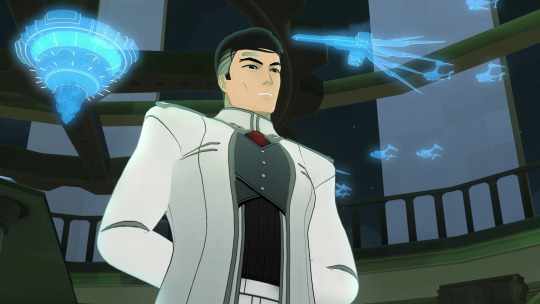
As Ironwood is known to be proud of the advancements in technology developed by his nation, (or to be more accurate his own accomplishments) believing in only using the best and most efficient means of protecting (Warmongering) not just the people of Atlas, but the entire world as well.(More like control)
This is even seen in how he ensured that when Yang Xiao Long was given a specially designed prosthetic arm, only the finest resources available were utilized to make sure that the young Huntress was able to return in full force as soon as possible.(This might as well be manipulation and illegal recruitment but hey who wouldn’t want the rwby equivalent of a super saiyan on their side?)
He was also seen boasting through a holographic display of the advancements of the Atlesian Knights and Paladins and their capabilities, showing his belief in constantly advancing the means to protect the people to meet the constantly evolving threats of their enemies.(Welcome to the future people technologys great and everyone uses it, to kill each other and you have me to thank for it.)
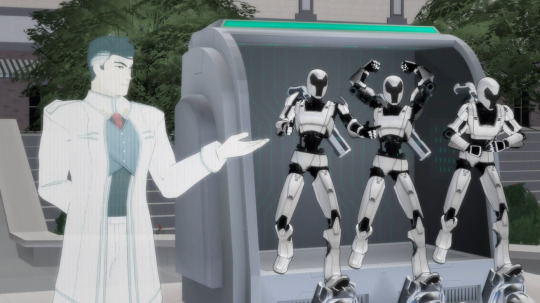
Okay It's pretty clear that Ironwood has taken pride in his accomplishments and views himself as the main benefactor of his kingdom. And his kingdom in turn has saturated his ego to the point that Ironwood can view the City of Atlas as a monument to his glory. This is sorta similar to how the city of Volgograd was renamed to Stalingrad in honor of Joseph Stalin’s accomplishments in its defence against the White Army between 1918 and 1920. To better clarify this reasoning it has been stated in the by Ironwood himself in V7 episode 4 that by framing him for murder it would also by extension be framing Atlas as well.
“Slow success builds Character, but fast success builds Ego.”
For Ironwood he had put his heart and soul into the thing he valued the most and prided himself from; His Home Kingdom of Atlas and he would sacrifice anything to secure his legacy and glory no matter the cost.
Paranoia over reason
#rwby#james ironwood#general ironwood#rwby ironwood#world of remnant#rwby ozpin#rwby ozma#rwby qrow#qrow branwen#professor ozpin#headmaster ozpin#rwby atlas#rwby atlas soldier#rwby mantle#Ironwood analysis
11 notes
·
View notes
Text
Fan Interactions: Then and Now
Professor Rachel Grozanick’s ENGLIT 0512 Narrative and Technology class visited Archives & Special Collections during the Spring 2020 term. Students had the opportunity to closely examine collections around the themes of constructing the canon, inclusivity, alternative formats, and fandom. Students examined artists’ books, comics, pop-up books, Modern Language Association editions, and Clifton Fadiman.
Today it is easier than ever to find and participate in communities centered around any niche media series or hobby imaginable, but that was not always the case. Before the age of the Internet, it was much harder for the earliest fans to connect and correspond with each other. One of the earliest ways these gaps were bridged was through the creation and limited publication of fan made magazines, often abbreviated to fanzines or simply zines. Small audiences developed around these independent projects, and over time the focuses of many of these once tiny and relatively unknown groups have grown to be parts of the mainstream consciousness. This growth is largely due to the widespread and increasingly accessible virtual communication platforms and social media. Despite the differences in format, platform, etc, there are striking similarities between old fan interactions in fanzines and modern fan interactions online.
The lightning fast response times of internet forums today may be taken for granted now, but decades ago discussions around media and fandom depended on the postal systems to flourish. This is often lamented in The Invisible Fan #7, an issue of a zine containing a debate relating to feminism, inclusion, and the effectiveness of feminist groups comprised entirely of men, as the editor, Avedon Carol, occasionally mentions her annoyance with having to maintain and truncate an active mailing list along with the slow response time of those writing to respond to her (Carol 13, 21). These responses took the form of a "loc", or letter of comment, which subscribers would write in to the publishers or creators to give their thoughts on the topics discussed or the quality of the zines themselves (Southard 27). This particular issue of The Invisible Fan also contained a number of these referring to previous issues, which revolved around similar topics, specifically women and writing science fiction (Carol 18-19). This entire issue is almost like looking at a transcription of an internet forum discussion, especially in the case of the locs, as many of these have a bit of a dialogue between the fans and Carol.
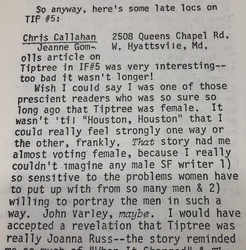
Figure 1: An excerpt from one of the many locs from The Invisible Fan #7 (Carol 18).
While originally these dialogues consisted only of fans themselves, overtime industry professionals and creators began to get involved directly as well. This is not solely due to the rise in social media and instead has roots in zines themselves. In his book detailing the history of zines, New York University Gallatin Professor of Media and Culture Stephen Duncombe notes that science fiction zines were integral in pushing for more interactivity between fans and media producers, as well as between fans and other fans (Duncombe 114). Originally, fans simply wrote in letters with concerns or requests to the relevant publishers as well as to each other, and it was this active participation, Duncombe argues, that eventually allowed fans to play a part in shaping the final products as opposed to just consuming them (Duncombe 114). A more fully realized version of this relationship can be seen today with fans reaching out to companies and individual creators on social media platforms, where they can discuss their favorite franchises with the people responsible for them. Because some of these platforms have millions of users, in the past there have been instances where enough of them have formed collective pushes towards these companies to elicit changes they deem necessary. A recent example would be the delay of the movie Sonic the Hedgehog, as after initial trailers were uploaded fans were so outspoken in their dislike of the main character’s design that the movie’s release date was pushed back in order to update it. Clearly modern fandoms have a much larger impact than a handful of letters.
That isn’t to say that fans and zines never had any interactions with those working in the industries before the Internet. Another zine, Incognito, which was centered around Marvel and DC comics, published an issue that contains an interview between one of its editors, Rick Jones, and the late Marvel Comics Writer Stan Lee, who is responsible for many of the superheroes in mainstream culture today (Jones et al. 4). It’s more common now because it’s much easier to reach out to the people behind shows and movies directly. Creators and companies themselves have also taken steps to involve fans by hosting promotional question and answer sessions on Twitter or Reddit before upcoming releases, among other things. This, along with the added level of anonymity online usernames provide that may make others more comfortable in participating, ensures that discussions are open and available to everyone.
Some other avenues of fan discussion and discourse include the sharing of related pictures and fan made art. Because resources were often limited while making these zines, some took it upon themselves to recreate officially produced artwork via copying or tracing the official art as best they could, like in figure 2. Alternatively, some took to creating their own original artwork instead of or in addition to tracing. In the current year, we still often circulate and share images or memes of our favorite shows, and it's never been easier to find high resolution reference material, images or otherwise, via Google or similar search engines.

Figure 2: Doctor Strange characters traced by Bill Schelly in order to provide simple visual aids (Jones et al. 9).
What may be lost today, however, is the amateurish charm of yesteryear due to the advances and availability of better tools and technology. Both The Invisible Fan and Incognito contain some sort of spelling errors or printing errors, which can be seen in figure 3. While this may hurt any professionalism they may have aspired for, it could also be argued these mistakes add to the charm, as these projects were usually the work of small but dedicated teams or even single individuals. They might not be incredibly polished, but the passion shines through regardless. Currently, with the prominence of word processors with automated spell checking software, unintentional spelling mistakes are almost always seen negatively due to how easy they are to fix. This luxury was not a feature of the typewriters the original zines were written on. There is also a seemingly endless supply of such high quality fan art now due to the increasing availability of professional software. That doesn’t mean that the artists and fans of today don't have the same levels of dedication as those in the past. In fact, as these fan made pieces grew in elaboration, the time and technical skill required to produce them grew as well. Regardless, these works are still shared far and wide with others, but through the Internet instead of the mail or in person.
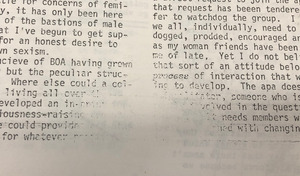
Figure 3: A particularly gruesome printing error. A spelling mistake is also visible in the top right corner (Carol 5).
The fans of today are still largely doing what the original fans accomplished through their zines decades ago except now there’s a much wider audience. The large communities of today are so expansive that the feeling of being a part of a small, tight-knit group might be lost. For example, it would be impossible to know every single individual personally today, due to some communities being so expansive they encapsulate millions worldwide. What may have felt like a special and even exclusive club back then now has the door bolted open for anyone and everyone to participate in. That’s not necessarily a bad thing, and in fact on the whole it’s more beneficial for those who want to get involved and participate. It's now possible for everyone to be an active participant, fan content producer, or just an observer, in the current cultural climate. The activities are largely the same, it's simply the avenues of distribution and communication that have changed.
- Derek Halbedl, undergraduate, University of Pittsburgh
Works Cited
Carol, Avedon. “The Invisible Fan.” The Invisible Fan, 1978, pp. 1–21.
Duncombe, Stephen. Notes from underground: Zines and the politics of alternative culture. Microcosm Publishing, 2014, pp. 114
Jones, Rick, and Billy Schelly. “Incognito.” Incognito, Sept. 1965, pp. 1–17.
Southard, Bruce. “The Language of Science-Fiction Fan Magazines.” American Speech, vol. 57, no. 1, 1982, pp. 19–31. JSTOR, doi:10.2307/455177. Accessed 2 Feb. 2020.
10 notes
·
View notes
Text
So I’ve just finished reading the Dragon Age Tevinter Nights anthology, and short reaction: enjoyably hit and miss right up until that final extremely thorough direct hit, thank you Patrick Weekes.
Much, much longer version:
1. I don’t know how reasonable it is to try to extrapolate about what’s going to be in the next game based on a random short story collection, but hey, the novels that came out before DAI were about the mage rebellion, the Orlesian civil war, and eluvians, so.
So things I’m now expecting to see in the next game, aside from the Tevinter-Qunari conflict and Solas of course: Nevarran necromancy, Antivan Crows, Wardens who are struggling with decimated numbers after DAO and DAI (would be the perfect time for Razikale and Lusacan to both wake up at once really), and the Lords of Fortune, a never-before-mentioned Rivaini treasure hunting organization which appeared in I think three different stories here.
Plus a few stories were very much signalling This Specific New Character Will Be Showing Up Again, whether in the games or elsewhere; I'll be shocked if Lucanis the “Demon,” reluctant heir apparent of the Antivan Crows who just got into a cliffhanger conflict with a Tevinter magister, doesn’t have more to do.
2. THERE IS A MAP, there is a great big fantasy map surrounded by nifty little illustrative details to poke at.
There’s a label reading “White Spire,” not in Val Royeaux, but on a mountain beyond the Arlathan Forest. Is that an error or is there really a White Spire mountain? If not an error, has it always been named that or is that new, possibly a new center for the mages after the war, after the original Spire fell? At no point is either Spire mentioned in this book aside from this map.
Lots of astrological sun and moon patterns prominently featured around the edges. Is that one moon chart depicting moon phases or an eclipse? Is it too conspiracy theory of me to be counting the nine dark moons (or spheres? like in that DA4 idol illustration’s seven slots?) on the dragon’s wing? Probably. Or are those spheres a reference to the second moon that never seems to actually be visible, is that missing moon actually deliberate.
Most of the astrological charts are fairly straightforwardly showing sun/moon phases but what is the crowned figure in the one on the lower right meant to represent? The Maker? What’s going on with the horizontal lines passing through it/behind it? The two moons beneath it - is that an illustration of the moon in two phases or being separated into two (metaphorical moon in that case, presumably), do those horizontal lines also indicate separation, do I need to move on from the astrological depictions here, definitely.
Love the big horseshoe crab sea monster.
3. Patrick Weekes’s first story in the collection: halla shapeshifting! An elf named Strife who I fully expected to be revealed as an agent of Fen’harel mimicking ancient elven names like Sorrow and Pride, though I was wrong - would it be charming or just annoyingly unsubtle if that became a thing among his agents. An ancient forest guardian with lyrium blades who hunts magic in a way that struck me an awful lot like a forest-themed equivalent of a golem, though I may be wildly off base with that one.
4. Nevarran necromancy story. An odd bit of the chant to highlight for a funeral: “And the Maker, clad in the majesty of the sky, set foot to earth, and at His touch all warring ceased.” I continue to squint suspiciously at overlaps between Maker and elven god imagery. Also, evidently mortalitasi believe that when someone dies, an inhuman spirit is pushed out from the Fade into the physical world, and that’s part of the reason behind their housing spirits in bodies - neat! The existence of Curiosity spirits, also neat!
5. Is Ghilan’nain’s horrible body horror place supposed to be spelled Hormak like in the title and previous canon references, or Hormok like throughout the text here? I know this was just a mistake but maybe I’ll use this to say that in-world there’s multiple ways of transliterating Dwarven.
6. Lukas Kristjanson story #1, the one featuring approximately a million minor Inquisition character cameos and a meditation on Solas’s regrets, introduces a character with the phrase “free mage by special commendation,” and I was briefly thrown by that little signal that we are Not In My Worldstate, that the mages aren’t all free by default - except then the story went on to destroy Solas’s fresco so I wound up quite grateful for that little heads up that this isn’t my worldstate actually.
(Unfortunately I can’t get into this guy’s writing style at all, which is a shame because it’s one of the big Solas stories in the book.)
7. There’s a little plot point in the Wigmaker Job story that demonstrates those elven artifacts Solas had us activate all over Thedas do indeed strengthen the Veil - like, he wasn’t lying to us about what those orbs do, that is how they work, here we see a Crow stab one in order to deactivate it, weaken the Veil and unleash a horde of vengeful demons. Nice confirmation.
8. Genitivi is the Randy Dowager. (Possibly. At least, Philliam wrote a scene in which Genitivi alludes to being the Randy Dowager. I do appreciate an unreliable narrator but after a certain point it does make the lore hard to keep straight.)
9. By the time we got to the story about adventurers stealing an incredibly powerful healing amulet just to donate it to a mysterious contact at a makeshift hospital trying to help people where the Qunari-Tevinter war has spilled over, I knew better than to expect any cameos from DAO/DA2 characters. And with the mention of the squire, I was pretty sure the mysterious contact was going to be Vaea, and it was. Still. Anders would approve. And for a moment I was fantasizing that it would turn out to be him, or connected to him. A new mental setting for him and Hawke post-mage-freedom - makeshift hospitals at the edge of the invasion, secretly sponsored by a certain pair of absurdly overpowered, dungeon-crawling, treasure-hunting fugitives.
Yes, my Dragon Age interpreting is still all about Anders even when he’s not remotely present.
10. You know, I really expected the leaders of the Crows to be a bit more ruthlessly competent than this. Someone is setting up a grand demonstration, recreating infamous historical assassinations carried out by the Crows but now with the leaders of the Crows themselves as the victims, incredibly flashy, incredibly clearly sending a message, and yet not one of the characters trying to figure out whodunit is speculating about the meaning behind that message??? the motive in going to all that trouble??? it’s all, hm, perhaps it’s the qunari invaders. hm, this one was posed with a pearl necklace just like the one in the historical murder it’s recreating, i bet the culprit owns a pearl-fishing business! I know they’re assassins not detectives but at least show the professional courtesy of paying attention to the message in the show your fellow assassin is putting on for you, geez.
Anyway. Interesting Crow details: they talked about neutral ground and territories divided between the Crow households here, does that just apply to Antiva or like, does Arainai have claim to all jobs in Ferelden?
And the line “Teia's back was bare except for a tattoo marking her as a member of House Cantori” puts Zevran’s tattoos in a slightly different light for me - he’s mentioned that some symbols are sacred to the Crows, and logically it follows that having that symbol tattooed on him would indeed mark him as a Crow to other people in the know, but that his tattoos mark him as belonging to House Arainai is a thing that did not hit me from that.
11. An agent of Fen’harel muttering “Felassan” to activate a rune. In memoriam? Charming. I mean it’s a rune that’s intended to kill an entire city, so possibly the more literal slow arrow is meant, but I’m still charmed.
12. PATRICK WEEKES CLOSING OUT THE BOOK BY JUST DUMPING THE CONTINUING DREAD WOLF HUNT PLOT ON US.
So much.
An actual giant wolf in the Fade, I’m so happy for tumblr user corseque.
A character again raising the possibility that Solas is not an ancient elf but rather a young elf who stumbled onto old magic, a theory I thought debunked by Trespasser but here we are considering it again.
A minor side note that a lot of Kirkwall’s templars went rogue after the explosion - that’s not relevant to the post-DAI plot really, I’m just noting it for my generally-DA2-focused fanfic purposes.
The possibility that somniari (presumably) can kill even dwarves who don’t dream in their sleep. Somniari in general or did Solas personally step in here?
A ritual involving the red lyrium idol resulting in the phrase “As if we were the blood and the cavern the body through which it flowed” right before the POV character enters the Fade, which is a rather Titan-esque turn of phrase.
The Dread Wolf again asserting that all creation is in danger and he’s trying to fix that. A biased POV character recognizing that, huh, funny how those spirits around the Dread Wolf which surely must be demons actually look an awful lot like Justice and Valor.
And Charter’s notes at the end, so direct, not only spelling out the new details on the idol for us (that the figure represents a crowned figure comforting another) but thoroughly hitting us over the head with Solas’s essential characterization in his own words, as if Weekes is still trying to clear up any possible lingering misinterpretations there. (Prideful, hotheaded, foolish. Doing what he must. Sympathetic to elves. Said that he was sorry.)
And the quiet simplicity of Solas coming to this meeting of spies in person because, pause, “...the Inquisition was involved,” written in such a way that you could read all sorts of things into that pause, whatever the Inquisition and the Inquisitor might mean to him.
The book would have been worth reading for this last story alone, what a note to end on.
#dragon age#tevinter nights#inquisition#da4 speculation#this is a deeply inquisition- and post-inquisition focused book#lots of neat continuing plot stuff and cameos from DAI or comics characters#no updates on your favorite DAO/DA2 companions
22 notes
·
View notes
Text
Prelude
With Volume 7 just beyond the horizon, I figured to look back at my thoughts for Volume 5 and, through more cooled down eyes, boil down why I consider it to be the worst volume of RWBY. When I wrote my review of Volume 5, it was literally the night the episode premiered, so I was boiling. But now? I’m going to look through the review with fresher eyes and clarify what sort of problems I had with RWBY.
First, a bit of backstory. There was an interview made during the summer in between Volumes 4 & 5 that had the cast say what sort of themes one could expect for Volume 5. Among these were stuff like “building yourself back up again”, “shouting ‘we’re not done here!’”, “solving problems on your own”, and lastly, from Barbara herself, “Strength” and “Growth”. For someone who was just starting to realize why people were turned off by the darkness of Volume 3, this was uplifting to say the least…
Shorts
The Character Shorts kinda hyped the Volume, though they sunk in their own way. Weiss’s Character Short effectively foreshadowed her loss to Vernal. This tough and talented girl gets her ass stomped rather quickly and needed to be bailed out. Winter’s line about how she “won’t be around to save her” was foreshadowing to her not actually being in the season, but when I first heard it, I thought she meant “Hey, I’m going to die this volume, lol!” and that’s without bringing up how the trailer fails to hype Weiss up like the other trailers did.
Blake’s Trailer was alright, especially in taking steps to address a problem regarding Menagerie, but it felt more like Ilia given the backstory dump we got that feels all the more like mandatory reading. The problem is that, and it’s perhaps the very first problem I’ve heard about RWBY, is that the trailers (and by extension, anything that’s a spin off of RWBY like World of Remnant) feel more like you need to watch this rather than you can watch this. It’s confusing, but let’s use Blake’s Short as an example.
Ilia talks about her backstory as it is contrasted with a chase between Blake and a random dude we never see again. Assuming you’ve never watched the trailer, you’d just get the truncated version of “MUH PARENTS ARE DEEEAAAD!” and not the bits where she was forced to resent her own race because it was easier to blend in to her surroundings, like a chameleon. It’s ironic, since RWBY would do the reverse problem with Adam, where his trailer isn’t mandatory but we barely get a backstory for him beyond “I got branded, but everyone will speculate that it’s because I did something bad and not that it drove me to do bad things”.
Lastly, there’s Yang’s short, which had the minor hiccup of contrasting what an interview said about running out of Aura means you can’t use your Semblance. The Aura thing is something that can be discussed for another day, but the basics you should take away from this is that, for some time, people didn’t know how running out of Aura is symbolized. Most people take the flickering as the signal as the next hit on those guys are usually the one that does them in. As such, you had this huge debate on what kind of flickering means Aura broken and what just meant Aura is low, which, personally, could have been avoided if the writers and/or animators just utilized that Aura dust thing (seen prominently in the Bumblebee vs Adam fight) as their definitive “aura broken” animation instead of just using it some of the time.
First Episode
The first episode proper promised a lot. In fact, a good chunk of the first half promised a lot. However, it became much clear in a second viewing that a lot of it was just padding at worst and showing us where the characters are at best. But what I think was done dirty the most in this episode was introducing Mistral. We were hyped in Volume 4 (thanks to World of Remnant) that Mistral was this dichotomy of rich, cultural people and the seedy underbelly of criminals and that, at least one of the elements would be utilized in Volume 5. Unfortunately, all we got were a few mat paintings that contrast what Lionheart was saying in regards to Mistral being in chaos.
And so, the most we get out of Mistral are those mat paintings and a perpetually raining downtown that we don’t see much of, even when it gets briefly revisited in Volume 6. We’re supposed to be invested in the city and yet all we get are empty rooms and 2D art. They took great steps to improve this in Volume 6 with Argus, though, so if there’s any consolation, it’s that they learned from their mistakes here.
But we now get into the biggest problem of why Volume 5 is disliked. Because of the situation, the group are left to basically wait until Lionheart convinces the council to get them some Huntsmen. The heroes. Wait. In a volume where the writers were talking about the themes of improving yourself and pulling through with your own strength.
Do you guys see the problem here? I know people have bitched about Volume 5 to hell and back and you’ve probably heard the complaints to high noon, but this entire issue is what rots Volume 5 to the core the most. Not the piss poor fight scenes, not the inconsistent characterizations, it’s that the plotting decides to take a back seat when the volume was meant to be about taking action.
As the episode goes on, you see the problem unfold. Ruby and friends hit a dead end until Oscar appears and has Ozpin exposit things to them, Weiss is denied a chance to save people and fight the Grimm until the Grimm come to her, Blake is hit with the dead end of the Albains deflecting blame, and Yang had the chance encounter with Bakugou where he knows the hideout of her mom.
The closest person who is taking action here is Yang, who established that she is actively looking for Ruby (technically Raven, but as we see later on, moot point). Blake’s situation is being handled by her dad, Weiss is sitting in the plane until the Grimm come for her, and Ruby is sitting on the couch that I’m pretty sure has her grooves molded into the cushion with how many times she’s sat there.
Episode 2
A minor complaint before we go to Episode 2, we had the Stinger repeat itself because the crew thought that people wouldn’t see the stingers. This is the show, mind you, that makes a point to include scenes at the end of every volume, regardless of how long they are or what point they serve in hyping the next Volume. Hell, one of the major complaints about Volume 2 was about the stinger not mattering. So why did they suddenly decide that the viewers might not see the stinger in a culture where the MCU exists?
Alright, cooling things down, we have three major scenes in Episode 2. Salem’s chat with Lionheart was meh at best and wtf at worst. I get the idea of Salem using different approaches to get people to do what she wants, but the cool aspect of Salem was that her approach was not what a villain would normally be. Instead of berating or choking her minions should they fail or talk back, Salem instead talks people down like she’s a mother to them. Even when Tyrian fails, she doesn’t hurt him, but rather tell him that he disappointed her. So, having her choke Lionheart, even when in hindsight it made some sense, is kinda an odd thing to do.
But not as odd as Salem’s whole “Not you, Arthur” bit. A lot of people drew points to that and the best I can explain is that it’s either a typo (she’s meant to say not yet or not now) or Arthur and Watts are some sort of Jekyll & Hyde thing. Unfortunately, it seems Watts is more a parallel to Watson rather than Jekyll, so that brings me to believe that it’s a typo and so, rather than have an easy explanation for a problem, we just have a compounded problem. One of many.
And there’s something funny to be said about Salem warning Cinder about Silver Eyes when Ruby barely learns about it this Volume. And also that she wants to speak with Tyrian but we never see what comes of it. At all.
I only have one new thing about Weiss vs. the Bees. Originally, the pilot was supposed to be gay, but held off on it because they’d be killing off their first revealed gay character, something that wouldn’t look good to the fanbase. Now, while I understand the reason behind it, I have to question the logic behind why they think it isn’t okay for their first LGBT character to be offed, but instead be someone who seemed okay with murdering her crush’s parents while sending said crush to her abuser.
But more on that later, we have Sienna to discuss. Now, there’s a lot to dissect. For one, RT has obviously realized that they’ve messed up and brought Sienna back for a bit (while taking the heat for “if she’s so badass, why did she go out like a chump”). However, in hindsight, what purpose did she actually serve outside of some cute nod to Shere Khan?
All she did was tell Adam that he’s going too far and that’s it. And really, it just seems hypocritical for the leader of the White Fang to effectively restructure the organization into a terrorist group, murder tons of people, and then suddenly back away and say “woah, too much” when Adam proceeded to help torch Beacon. It’s to the point where one question most people want to ask at cons is “did Sienna order the hit out on the SDC”, since we don’t actually know and that it could be a radical leader of that quadrant like Adam.
It felt more like Sienna should have been just the leader of Mistral’s White Fang faction instead of ruling over all the White Fang, which would make more sense as Adam would need permission to attack a kingdom that isn’t his stomping ground. Then there’s the introduction of Hazel, who at first is presented to be a pretty decent character, not wanting to kill people if he had no choice, but as time goes on, is basically your stock “big soft guy with a secret hulk side” character.
Unfortunately, this episode didn’t help enforce the theme of taking action when it’s the villains who are doing it and seeming to be two if not twenty steps ahead of the heroes.
Episode 3
Episode 3 has that whole speech thing I overlooked. Barring Ghira’s speech that the crew said is based off Obama’s “we killed Osama” speech (which, if it is, paints the whole situation of Sienna’s death in a rather dark light) before Ilia interferes. Now, I actually liked that Menagerie is hesitant to stand up for Haven. After all, humans hated their guts so much that the island was originally planned to be a place where people could dump Faunus on. There were lynchings and enslavements that are still going on to this day, just in subtler forms, Of course the Faunus wouldn’t want to fight.
Then Ilia swoops in and robs Blake of any agency she has with the scene. If RT wanted to not let Blake convince the people until three quarters to the end, they should have cut the subtlety and have some annoying kid go “IT’S TOO EARLY IN THE PLOT TO DO YOUR SPEECH!”. Hell, let Blake tell her story about her team, but the audience balks at the fact that she’s not only friends with a Schnee, but also a human who crippled a guy on live television. Remember that plot point?
We then cut to Oscar and this is perhaps the reason I decided to do this revisit of Volume 5. The way Ozpin talks of action and resolve, it felt like we’re going to the root of the themes of taking action. No more being subject to the events of the plot like in previous Volumes. Now? Now is the time to fight back! And that built up to… what? One training scene and Ruby learning headbutt?
Granted, we see later on that there was a bit more to the plan, but for the most part, it seemed like an excuse for “character growth” as opposed to actual character growth. A training arc isn’t just some short scenes of a person lifting weights and jogging up stairs. Its meant to be a sort of means of growth for the character. There’s a reason most training montages have the character suck at first, but then get better by the time the montage ends. It’s because it’s the quickest way to show growth. But even without that, you could get some serious mileage for a pulled off training arc.
Rocky IV and Star Wars: The Empire Strikes Back have some good examples of it. Rocky IV had the titular hero train and work out in the middle of a cold, mountainous range, while his opponent is simply given steroids. It shows the dichotomy between the two and how they view their eventual fight. Empire, on the other hand, had that masterful scene with Luke in the cave, where he has a huge moment of both foreshadowing and character growth.
Here? We just have Ruby learn headbutt like she’s nothing more than a Pokemon. There could have been a lot more done with it, like having Ruby put a lot more force in her punches, causing others to realize she’s extremely angry about what happened to Pyrrha and Penny, or, if the need to exposit about Semblances is needed, bring something new to the table that isn’t going to confuse the fuck out of people… Something like:
“Your Semblance might not reveal itself until you need it most” or something like that. Not “A semblance is someone’s personality, but not. Wow! Exposition!” or “Hey, remember how we said Aura was passive? Welp, not anymore!”
Not to mention that Jaune is seemingly cool with Ozpin suddenly coming back from the dead. Here’s the thing, last Volume had him upset with Ozpin about what happened to Pyrrha, something that didn’t seemed to resolve itself. Keep in mind that, for all rights and merits, Jaune believed Ozpin to have died. In fact, it was that confirmation that Ozpin had lost against Cinder that convinced Pyrrha to kill herself. Now here he is, seemingly stuck in the body of another kid and he just outright said this is a normal thing for him.
You’d expect him to have something more than “golly!”. The fact that he didn’t seem to have any aggression towards Ozpin until after he ran to his hidey hole in Volume 6 seems rather odd given that his entire character is that he’s angsting about Pyrrha and angry at Cinder for what she did. The group seem rather content to just sit back and let the plot happen, which is the opposite of what the crew was trying to convey with their themes.
Episode 4 and Episode 5
I still stand by what I said regarding how Episode 4 was a good episode, finally having a reunion between two members of Team RWBY, but it’s perhaps one of the last good things about RWBY we’ll ever see in Volume 5. Because Raven’s promise to tell Yang “the whole truth” turns out to just be regurgitated exposition at worst.
But first, we need to have Blake, the woman who doesn’t want her race to be labeled, turn out to have labels for her friends. Okay, granted, it’s not that dumb but it is kinda patronizing that we need to have a character tell us what another character is. While the rest of her speech is pretty effective in defining Blake’s character, making her perhaps the only character these themes of growth and strength actually apply to, it still is annoying that the most we take away out of this is her boiling down every character to a single word, then bringing up how Adam is going to ruin everything for the Faunus. You’ll see why this is a problem later. I liked the setting of Menagerie’s Shallow Sea marketplace thing and felt like Menagerie is wasted potential.
Ruby’s whole speech still feels like damage control, but with the added complaint of Ruby deciding to blame Salem for something Cinder did. Now, I heard the common excuse a lot: “Salem told Cinder to do it so it’s all her fault”, but that problem with that? Cinder told Emerald to kill Penny. So… Yeah. It is her fault. Hell, I wouldn’t have minded this if Ruby didn’t word it like Salem personally killed Penny and Pyrrha. Like as in, she just up and appeared out of nowhere and shot both Penny and Pyrrha in the head.
It still doesn’t fix the fact that Ruby is basically “hey, remember how I’m supposed to be upset?”
Lastly for Episode 5, we have the White Fang do the brilliant plant of murdering the chieftain who just spoke out against them. It’s dumb. Extremely dumb. What the hell do they think will happen after they murder the chieftain in cold blood? Menagerie is just gonna magically bend over and obey the White Fang? But perhaps the biggest waste is the White Fang in general.
You have these two sneaky fox brothers who seemingly oversee everything and even state that they’re only letting Adam do what he wants until he’s no longer of use to them, a buff bat dude, and a spider-lady… And they’re never seen again after this Volume. I get the idea, because RT is trying to wrap up the Faunus subplot as quickly as possible, but the problem that you can’t exactly introduce new characters or hidden depths if you’re just gonna throw them out with the bath water.
If they wanted to end the subplot, why did they put all the effort in some random characters that are just gonna be defeated off screen with a tea tray? Then again, this is a problem endemic to RWBY. Introduce this character, then quickly shoo them away before you’re committed to writing a plot for them. If you know you were going to half-ass the White Fang conclusion, why bother with stuff like more White Fang members or the SDC brand? In fact, why bother with the White Fang to begin with if you’re going to do so little with them?
Episode 6
Moving on before I lose my cool, we have Qrow aimlessly walking around downtown Mistral. Now, the crew said that Maria was supposed to be here… But… Why? What purpose would she serve? If she’s just gonna be a “hey, look, cameo to foreshadow Volume 6”, then that’s a horrible purpose. You know how most Cinematic Universes tanked because they spent more time hyping the next twenty movies when they should focus on their pilot? That’s what she would have been like.
Not to mention that she would have been caught in the crossfire of why Volume 5 was bad. “So here we have this random old lady who doesn’t matter at all to the plot so why is she even there” and then “Oh wow, she’s a SEW. They’re doing damage control to justify her unneeded presence in Volume 5”. And, don’t get me wrong, Maria is a fun lady and all that, but there needs to be a reason she was there beyond “hype for next Volume”.
What makes the problem worse was that they’re planning to include Maria so as to have a sort of Yoda to teach Ruby. This makes the complaint of “why didn’t Ruby ask about the Silver Eyes” even more of a complaint because now it seems like they decided “hey, we’re going to address it next volume, so let’s not bother bringing it up here”. Which is even worse than “hey, people noticed we didn’t address this so let’s completely invent this character for the sole purpose of addressing it!”
And then there’s Raven who is all “lol, I know more than you realize but I’m not actually gonna answer anything trolololololol” AARHG!
Okay. Okay. Before I completely lose my marbles, there’s one thing about the scene with Raven that’s stupid.
It’s the “there’s no such thing as magic” thing.
Okay. I get it. Turning into a bird is something that, in the world of RWBY, seems impossible. But there’s a ton of problems with this:
What makes summoning dead Grimm to fight for you so much more different than magic?
You’re willing to believe in magic rocks that augment your fighting style and are in fact part of a company that profits off magic rocks, yet turning into a bird is the messed up thing?
The guy who gave her this ability is currently inhabiting the body of a young boy and has said to basically devour his soul in due time, as well as create the magic that’s responsible for torching your school and your friend… And the BIRD is the most messed up thing!?
“But Raven made it sound like she was forced into it”. She didn’t seem to have any fucking problem with it though. Not only that, but it didn’t seem like a big dark secret that Ozpin wouldn’t want uncovered. In fact, he even said he gave Qrow and Raven the ability to turn into birds in an amused way.
Even more so when everyone but Yang seemed to respond to it with disbelief rather than outright anger. There’s a reason this whole bird issue was made fun of in Jello’s “So This is Basically RWBY” video.
Also, before we move onto Episode 7, I wanna bring up that the scene where Qrow visits the Shields is perhaps the reason why I hold Ozpin’s censorship of Lionheart’s role in the Battle of Haven to be one of the most scumbag moves he could have made. “Your mom’s dead, but don’t worry, the guy who sold her out is a hero!”
Episodes 7-10
Right, back to Episode 7. Okay, I’ll admit, it was a nice reunion scene all things considered, albeit with some rather unnerving things like Yang asking Weiss if she let the Boarbatusk skewer the trophy wife or even the dumb, patronizing “we haven’t made character arcs for us to go through so I’ll just say we had some”, since they had the great idea to use Ren, who is voiced by Monty’s brother, as the mouthpiece for that.
Unfortunately, this is the episode I always think back to when I think of Volume 5. The perfect epitome of a slow, monotonous Volume. The problem I have is that, yeah, it’s meant to be this breather episode, a calm before the storm, but this just feels like a long lull that’s made even more insulting with the cliffhanger. All it has is people dumping exposition that viewers have either figured out or weren’t even burning questions and I think the awkward silence that followed Ozpin saying how he was the wizard that gave the Maidens his power is the perfect epitome for just how boring the volume is. The dude just revealed a massive plot twist and it’s treated as nothing more than a “did you know” factoid.
While I liked how they addressed that Blake leaving Yang would have had some serious negative emotions in Yang, it felt rather half-assed that they basically resolved it with “hey, my mom’s drunk, so shut up and accept Blake the moment she comes back”, especially since it comes from Weiss, who told Blake at the end of Volume 1 that if she ever runs away again, she best let RWBY know. If they wanted to ship Bumblebee so badly, this would have been a great hurdle for them to come across instead of just “hey, let me resolve this plot for you”.
Now, the whole thing with Ilia… Let’s get the elephant out of the way. The way they revealed her sexuality, I feel, could have been done better. “You wanna know why I’m gonna kill your parents and bring you to your abuser? Because I wanted you to look at me like a lover!” There’s a reason why some fans label her as a “psycho lesbian”.
However, I want to bring up that Rooster Teeth did an excellent job at building tension during the climax of the Menagerie Arc. Sure, the cliffhangers were tiresome, but you couldn’t help but admit you were at the edge of your seat and it even did a good job at subversion. Even if they allegedly didn’t even intend for it to happen.
The constant dryness of exposition and dialogue exchanges is what made Episode 10 so much better than the other episodes. Not just because it’s action-orientated, but because it finally tries to get back to the themes that it was originally supposed to tell. Throughout the entirety of the middle portion of Volume 5, the group basically took a backseat and allowed characters and plots to happen to them rather than advocate for themselves. The closest thing we got to the theme of “building yourself back up” is Weiss talking to Yang about Blake.
In fact, the only actual characters taking action are the villains. Constantly roadblocking the cast, setting them in for a trap, and even aiming to screw each other over. These guys have more advocacy and agency than the main characters. The most any of them did was…
Burn down their own house and blamed everyone else for it, all while saying that the house is the message Adam wants to send.
Use a girl’s unrequited feelings towards them to their advantage, straddle them, and guilt tripped her enough for her to consider switching sides.
Cry about how things are not going their way until their hands start magically glowing.
Yelling at someone until they cry bitch tears and then have them run away without even bothering to close the door leading to the dangerous artifact everyone had been working so hard to keep out of enemy hands.
In the volume where the theme is “solving problems on our own”. Just because Yang drops the word strength a few times when bitching out at Raven doesn’t mean that the theme had been accomplished. In fact, they do nothing of their own accord and just follow a script. Even Ozpin, the supposed smartest guy in all of Remnant, doesn’t even bother to figure out a way to counter the trap. Just instead walk in. Hell, if Yang didn’t spot Raven, they’d be mulched.
But, back on track. Episode 9 was an entire waste that failed to pay off the expectations of what we had with the cliffhanger set up in Episode 7. “But it subverted your ex-” NO. There’s a good way to subvert expectations and being promised a fight after episodes of bland exposition only to have it be “lol, no, it’s just gonna be more talking” is not a good subversion.
No. Here’s a better way. Set up the cliffhanger like normal, but don’t show Cinder’s dragged out negotiation with Raven. Instead, have her “allying” with Cinder be a twist. That way, people’s expectations for what happened are actually, you know, subverted?
The Battle of Haven
But, you know where this is leading to… The Battle of Haven. Really, I don’t think I can say anything that hasn’t been covered by someone else. We all know it makes all the Vytal fights look like masterpieces by comparison, we all know the jokes about useless Weiss or Lionheart hogging the staircase, or even the plot holes of Raven knowing Cinder’s arm being Grimm but doing nothing about it or Blake, despite spending the past volume saying how Adam must be stopped, suddenly doesn’t care about him…
So let me cut it simply:
The reason this battle sucks might have to do with the crunch.
We don’t know how long this issue with Rooster Teeth had been going on for, but if it is indeed what people say it is and that animators don’t get paid for the last quarter or third of their work, then that might explain all the cut corners animators and writers made. Why the fights are broken up into one on ones or why fights are cut out entirely. Maybe they weren’t getting paid enough and thus, the quality of RWBY suffered as a result of it.
And that’s perhaps the shittiest thing about the Battle of Haven. It could have been this epic fight that would have made up for all the boring, drawn out scenes of exposition and chatting, but because Rooster Teeth got too greedy or even because of our own impatience (which, again, isn’t helped by the aforementioned long, drawn out scenes), we are treated to a final battle so broken and tiresome that the Battle of Winterfell manages to be a better final battle, with the only thing holding it back being that Haven had a better identity twist.
And if, for whatever reason, it isn’t due to crunch issues, then we have another problem. This was meant to be this hyped up rematch between the heroes and villains, who haven’t seen each other since the latter ruined the lives of the former. This would have been excellent to see how the killers of Jaune and Ruby’s friends would interact with them, how Yang would react to the person who framed her, even how the group had grown since their last battle…
But… if crunch wasn’t to blame for the quality dip and the writers intended for the fight to go the way it went… I have to say… What the fuck were they thinking!? So many moments could have been brought up here and yet they decided that they weren’t important enough to focus on! And now, with this battle over and done with, those moments lost their luster. If they decide to bring them up, it’d be too little, too late at best and “why the fuck are you bringing this up now” at worst.
I’ll deal with one commonly used example to get what I mean. Adam was established in Volume 3 to be a threat only made strong because he uses Blake’s emotions against her and has a Semblance that lets him dish out aura-breaking damage. Blake easily defeats Adam and has him on the ropes, only to let him run with a few excuses that some people have debated to death and back, when it would have been much easier for Blake to have to choose between apprehending Adam and helping Yang. Then, when he inevitably returns to haunt Blake next volume, suddenly he’s a threat that Blake is afraid of again despite Blake having “grown” to oppose him.
They wanted that “triumph” over him, but realize that by doing so, they’ve burned that opportunity to have the triumph be meaningful. Same goes with Emerald and Mercury. They had a good opportunity for Ruby to effectively call them out for their crimes like how Jaune did to Cinder, but instead she just headbutts Mercury. Yang had at least some closure on her arc with Mercury, but it was meh.
The Point in All of This
Hell, speaking of wasted opportunities, the reunion of Team RWBY, something that the opening had hyped and one that the fans had been waiting for since Volume 3 ended, is nothing more than an afterthought. They couldn’t even be assed to show Blake’s first fight back with Ruby and Weiss. That’s how little they cared. It’s like everyone was just wanting to get that paycheck but they needed to rush that final episode out the door and also need to make room for Gen:Lock and Nomad trailers. They didn’t even care about the stinger, as they basically ignored any sort of information relating to the stinger.
Perhaps the biggest reason why Volume 5 sucked so hard was that it was running off the heels of Volume 3. Everyone basically accepted that Volume 4 was meant to be a breather Volume, with lower stakes and lower drama (with the exception of possible death flags for Ren and Nora), but the moment they made Volume 5 the grudge match everyone wanted, then the stakes got raised back to the heights of the third Volume, only for it to fail to live up to the expectations. Sorry, I think I mean to say “subvert the expectations” in this day and age.
Though, I think the huge problem with all of this, and perhaps the biggest bottom line I can say, is that it might be due to Volume 3 going too over the edge. By killing important characters and even dividing the team, the villains had raised stakes up so high, that people began to take the show more seriously. When characters were vaguely hinted to die, be it through threats from the villains or even flashbacks, people fretted that they would die. When the villains go back to striking distance with the heroes, people desired a grand battle. When the show tried to deal with the ramifications that happened with RWBY separating, people wanted to know what was going through the characters’ heads.
And when Volume 5 failed to deliver/“subverted their expectations”, people considered it a bad volume.
But worst of all, it failed to live up to its own themes. Jaune was the only person to build himself back up again through deus ex hands, and we saw next Volume that it needed a statue for him to feel better. No one was in a position of giving up only to be defiant and shout “we’re not done here”, but instead cry “it wasn’t supposed to be like this!”. The big problem of Volume 5, make sure the relic is secure, is only solved because two characters had a catfight in the basement and the survivor didn’t bother to lock up because their daughter was too busy bitching at her. No one really grew or strengthened their resolve. The triumph… wasn’t theirs to have.
Although, it seems Rooster Teeth had learned from their mistakes, with Volume 6 being leaps and bounds better than Volume 5, regardless of what you thought of the latter half. Best of all, the themes promised in Volume 5 were shown prominently in Volume 6, albeit some of the scenes capitalizing on those themes feeling more like a child is having a tantrum because they couldn’t have the airplane.
To close out this rather long winded discussion, and to give people a tl;dr on the whole matter, Volume 5 failed to address the themes it had presented and instead just padded itself out, expecting people to accept it because it’s RWBY.
8 notes
·
View notes
Photo
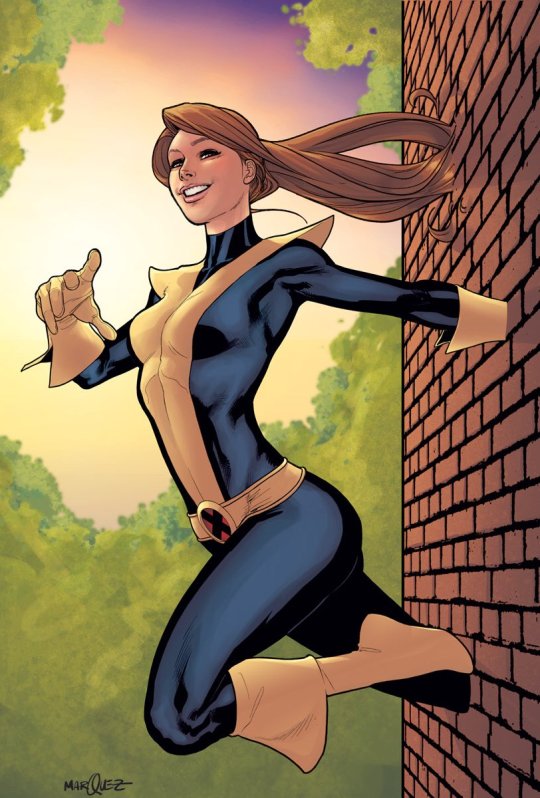
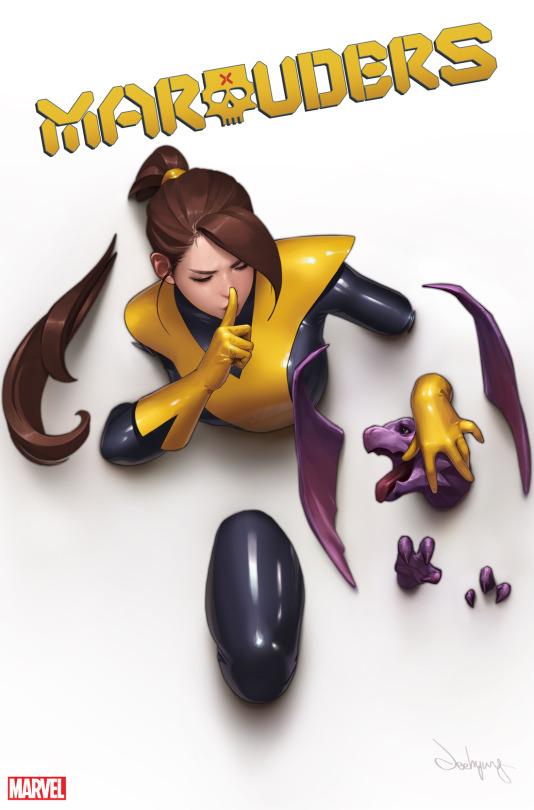

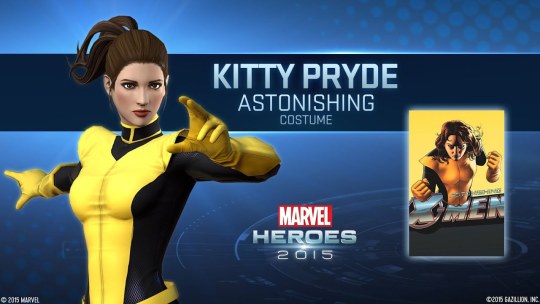
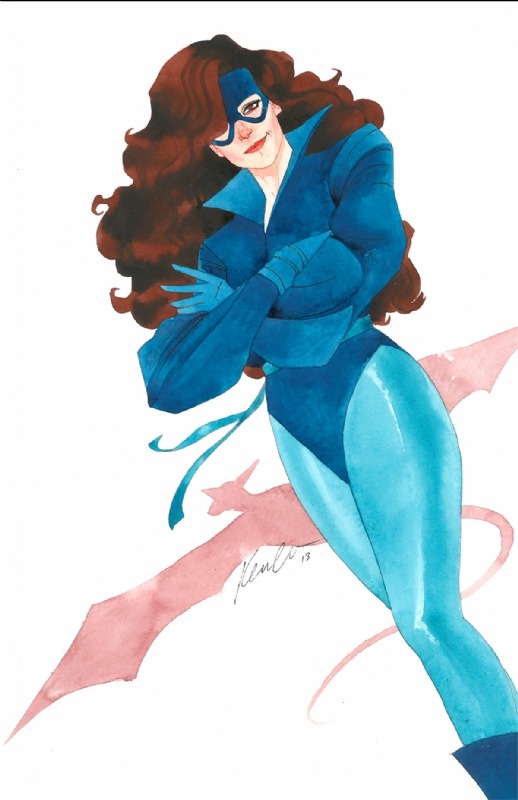
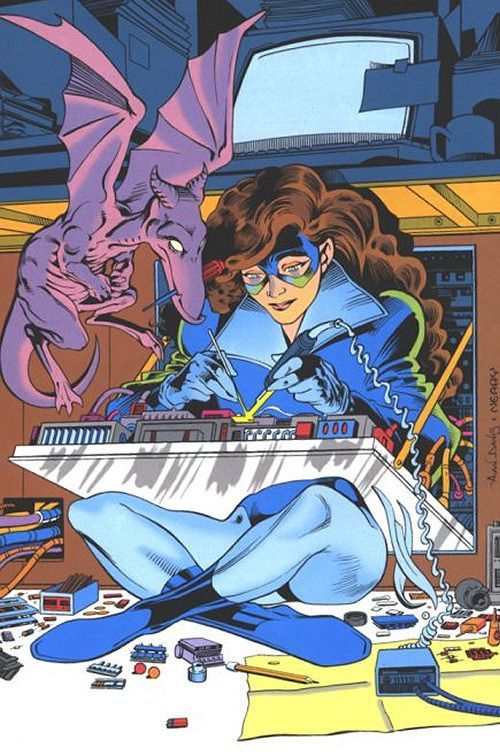
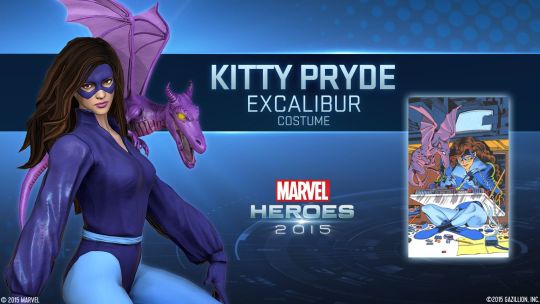
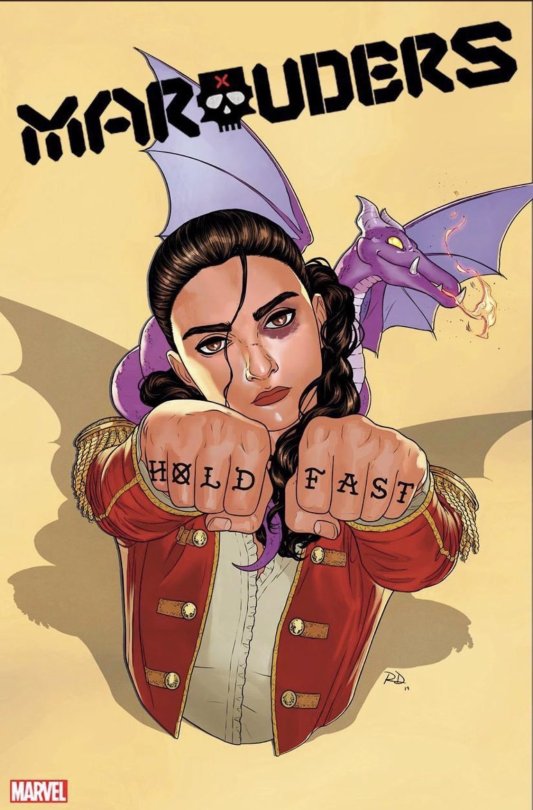
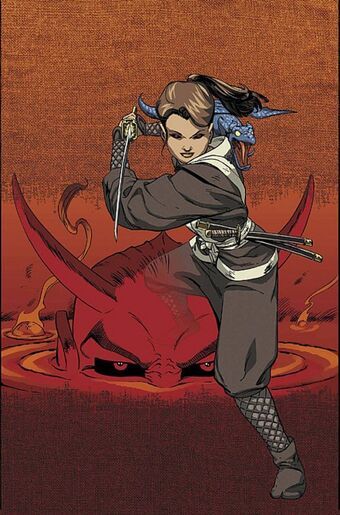
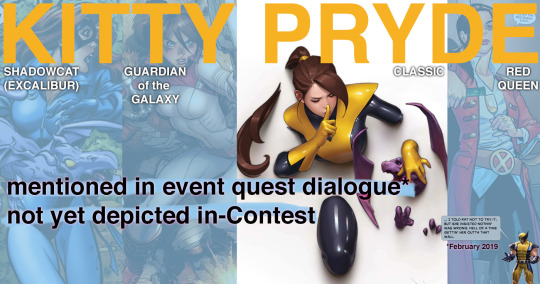
KITTY PRYDE the SHADOWCAT
The idea: a playable Marvel Contest of Champions character in the Mutant class based on any iteration of Kitty Pryde’s long and storied history in comic books. This blog entry is intended to explore whether Kitty Pryde is a strong candidate for Marvel Contest of Champions.
Why Summoners Care
She has a rich history with many team-ups (read: synergies, and not just mutants). Even though she is a classic character, her exploits are fresh, current, recent, and always relevant to big plot lines.
By most measures, she is a bigger deal than many Mutant-classed and mutant-related who are all already in MCOC, including Bishop, Cable, Domino, Havok, Mister Sinister, Omega Red, Warlock, and Sunspot.
In January 2020, Frontline: MCOC’s editor Dan was interviewed by the MCOC Content Creator Program’s Kabam Thel. (These interviews always ask the content creator what one champ they would add to the game.) Dan chose Kitty Pryde. Elaborating on Twitter in September 2020, Dan said that “For me, Kitty is on that Jean Grey/Emma Frost/Storm tier of Top X-Ladies of all-time.” He noted that “If we're going by comics, Kitty is 2x Jubilee on appearances, and just had a lot more impact in her stories. She's also the best character Chris Claremont ever created, and is the character he writes the best. So in a way, she is the definitive X-Man from the guy that made the X-Men the X-Men.”
Kitty Pryde and Summoners
She’s a widely requested champ. On the MCOC Wishlist Poll on Ranker, Kitty has been in the top 10 since 2019. She is one of only 4-5 characters to have ever been the #1 ranked champ on the poll. She is also among only a handful, as of December 2020, to have received more than 1,000 Summoner upvotes. At end of year 2020 she has 1,125 upvotes and sits comfortably at #6 most-wanted champ behind Beta Ray Bill and ahead of Morbius and Kraven.
Kitty is also content creator StarfighterMCOC's #1 most-wanted champ, and Frontline: MCOC’s #1 most-wanted champ (see above), and she lands in Katy Candy's top five most wanted.
Raw Potential for Synergies
Besides her romance with Colossus, her membership on the X-Men and Excalibur (including her affiliation with the Soul Sword), and leading the new House of X “Marauders” and “Hellfire Trading Company,” as the Red Queen, Kitty is one of the mutants who has many connections outside of mutant-oriented stories. Kitty joined and even briefly led the Guardians of the Galaxy and has shared some adventures with Spider-Man. She was also trained to be a ninja under Ogun, who figures prominently in Wolverine’s adventures connected to Japan, and who currently possesses Shogun.
The following are Other MCOC Gabe’s synergy ideas, originally listed on Kitty’s item description on the MCOC Wishlist Poll.
“X-Women” with (any four of) Phoenix, Storm, Boom-Boom, Jubilee, Psylocke, and Rogue; “Guardiennes” with (any four of) Gamora, Phyla-Vell, Mantis, Moondragon, Nebula, and Angela; “Soul Sword” with Magik, Magik II, Margali, and Colossus (Future); “Possessed” with Dracula and Ogun or "Star Lords" with Star Lord or “Romance” with any and all versions of Colossus.
She’s in Other Games
Mobile
Some mobile games in which Kitty Pryde has already appeared include Marvel Future Fight, Marvel Puzzle Quest, and on cards in Marvel War of Heroes and X-Men: Battle of the Atom.
Update December 3, 2020: she has also been teased for Marvel Strike Force.
General Character Pool
Unlike most mutants, Kitty has appeared Some Marvel games that feature the entire pool of Marvel characters have featured a playable Kitty Pryde include Marvel Super Hero Squad Online, Marvel: Avengers Alliance, and Marvel Heroes.
X-Men Video Games

Kitty has appeared as a playable character in X-Men II: the Fall of the Mutants (1990) and X-Men: Days of Future Past (2014) (pictured above with Lockheed).
She reportedly had a role in X-Men: The Official Game (2006), which was designed to reflect Ellen Page’s portrayal in the FOX motion picture of the same name. She is also reportedly mentioned in Spider-Man: Shattered Dimensions.
She’s in the Battlerealm
Wolverine mentioned her by name in the February 2019 event quest dialogue.
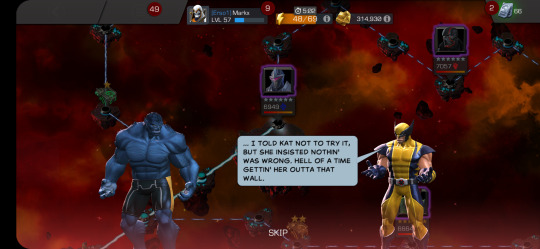
“I told Kat not to try it,” says Wolverine, “But she insisted nothing was wrong. Hell of a time gettin’ her outta that wall.”
Write-Ups by Summoners
Original Description
Migrated from the MCOC Wishlist Poll, which preexisted this blog
“She walks through ...her opponents? She can reach right past Armor Up and your Force Field. Paired with any Soulsword synergy champ, her special 2 can power lock and her special 3 does more damage per stacked buff. Add her little buddy Lockheed and you've got some fire-breathing attacks.”
Further thoughts by Other MCOC Gabe
Plausibly she should have phasing, telepathic resistance, and capabilities that can distrupt Tech champs, possibly EMP, Accuracy Reduction, and Shock.
Kitty also has the ability to disrupt any technology through which she phases, short circuiting or de-powering it. This concept forms the basis for a Theory Thursday entry suggesting that champs of all classes that employ technology could have a #circuitry hashtag that would allow Kitty to affect them.
Editor’s note. This entry remains under construction, as I have yet to do a full review of community archives searching for Summoner work-ups.
NEWS
December 3, 2020 ► Today the Marvel Strike Force Twitter account teased Kitty Pryde and Lockheed for their game. With her addition to MSF, Kitty Pryde is now in all the major Marvel mobile games except MCOC.
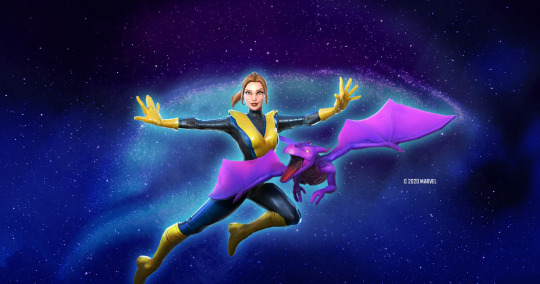
Septemper 25, 2020 ► Kitty has fallen to #4 most wanted champ.
September 14, 2020 ► According to the MCOC Wishlist Poll, Kitty Pryde is the #1 most-wanted champ among the MCOC Summoner community.
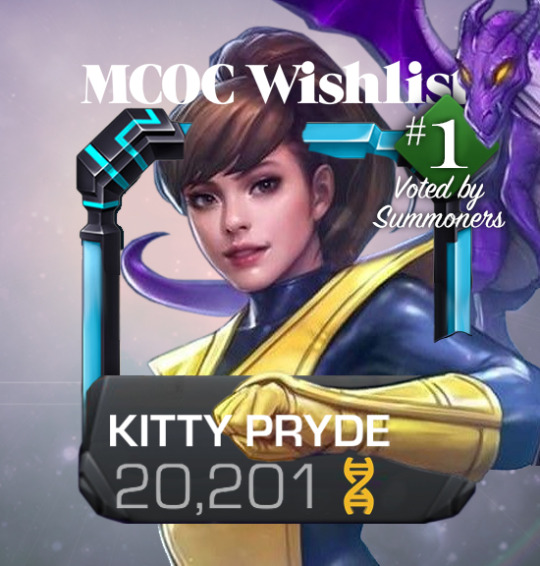
August 28, 2020 ► No dice. With the reveal of the September champs (Apocalypse and Professor X) it appears the pirate theme was not a reference to Kitty Pryde’s imminently joining any rosters.
August 26, 2020 ► In-game messages reveal that the September event quest, which some have theorized will bring the arrival of Kitty Pryde, will have a pirates theme and will be associated with Krakoa and House of X. Krakoa is the island on which Mutants congregate to live and coexist peacefully. Kitty famously failed to enter Krakoa, due to some interaction of her powers with the gateway that sorts out non-mutants. She instead became the leader of the new Marauders, ...dressed as a pirate captain.
July 1, 2020 ► (a) An in-app cutscene at the end of the monthly Event Quest features heavy House of X (“HOX”) flavor. Kitty features prominently in the HOX plot lines. (b) The “Champions of the Contest” roadmap Champion Tease suggests a coming other-half to a duo to which Magneto belongs. Many theorize this will be Professor X. In recent House of X story lines, Magneto has teamed with Professor X in leading a new Mutant civilization.
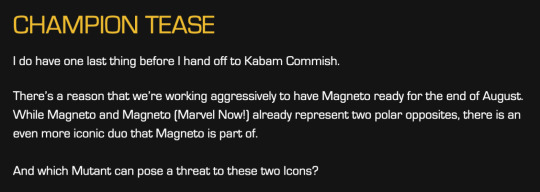
So could Kitty be the Mutant who can pose a threat to both of them? Most think a more likely fit would be Apocalypse. But Kitty does lead the pirate “Marauders” and “Hellfire Trading Company” as the captain Red Queen. The Hellfire Club has been a threat to Professor X and Magneto before. Could Kabam consider her a threat by extension?
February 6, 2019 ► In in-app Event Quest dialogue, a “Kat” is mentioned in passing during a conversation about things happening to mutants in the Battlerealm. The character gets stuck in a wall, which would seem to refer to Kitty Pryde’s phasing ability.
#Kitty Pryde#lockheed#shadowcat#Phase#a force#x men#Guardians of the Galaxy#star lord#pirate#ninja#marauders#incinerate#dragon#animal sidekick#well known mutants#Pet Avengers#Soul Sword#mystic relic magic sword#character spotlight#in game mention#Disrupt Tech
8 notes
·
View notes
Text
Disney+ What To Watch: My Top 10 Favourite Disney Classics
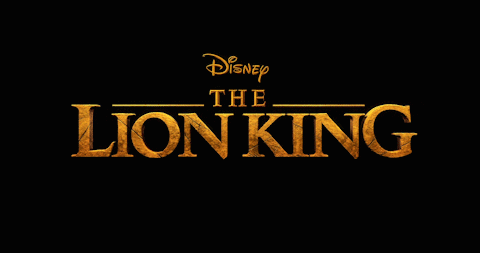
#4. The Lion King
As this list goes on I encourage people to remember that 1) I am ranking these movies as to what are my personal favourites as opposed to what I believe is the greatest movie, and 2) 5-2 do often oscillate so while The Lion King is #4 at the moment, it may not always be #4.
But there is no denying that The Lion King is definitely one of the best Disney movies out there, it just doesn’t happen to be my personal favourite despite many people potentially having reasons as to why it should be.
Much like Oliver & Company with the Dickensian foundations, I love a classic Shakespeare story with a Disney twist and The Lion King along with its sequel definitely incorporate two of The Bard’s best with this movie incorporating Hamlet.
It is a great idea to incorporate adult themes into children’s storytelling for the pure and simple reason that it acts as a gateway into Shakespeare even if the kids don’t realise or acknowledge it until years later when they’re forced to study it in secondary school.
But while The Lion King does bring in the mastery of Hamlet, it also stands on its own as a fantastic Disney movie. It is literally Shakespeare with lions and the advantages that this animated feature takes with that both elevates the original source material as well as giving people that may not be familiar with Shakespeare’s work, young and old, their first experience.
I compare it to imprinting where the version of a movie even if it’s a remake, or the version of the song you hear even if it’s a cover is traditionally the favourite of that story or song because it’s the first one you hear or see and in terms of movies or even songs the version that you may grow up with.
As I say, for me, I didn’t really know about Shakespeare until reaching secondary school and for that reason I of course would have found a version of a Shakespearean story in Disney form subliminally accessible.
But moving away from the Shakespeare comparisons, the movie holds up by itself, it just so happens that the story is essentially Hamlet with lions.
I said with Oliver & Company that I gravitate towards dog movies but I think as a child I simply gravitated towards animal movies, it just so happens that dogs became my favourite.
I just found it fascinating that you had relative human situations told through the eyes and mouths of animals particularly when you factor in that they play on the hierarchy of the Animal Kingdom with lions being royalty and how the food chain works.
It would be so easy to make an animated animal movie very corny and even square it at infants but somehow primarily up until the end of the Disney Renaissance Disney managed not to do that and The Lion King is the best example of an entirely animal-populated movie accessible to adults, kids, elders, teenagers, everybody you speak to when you talk about Disney Classics will talk about The Lion King.
In terms of characters, okay as a protagonist Simba is slightly bland. He’s very cute as a cub as far as animated lions go, Jonathan Taylor Thomas does a great job with his voice...but then when Matthew Broderick takes over as his adult self...that’s when he becomes slightly dull for me.
I mean it is almost as if his growth was stunted when his father died and he was effectively forced into exile, which they do explore rather well with the introduction of Timon and Pumbaa as giving him a way to effectively forget about his troubles...but I guess my problem with Simba is while he did face his fears and face up to his past, a lot of what went right for him in the movie really only went that way because he had help, whether from Nala, Timon and Pumbaa, even Rafiki.
Nala is slightly more interesting because she is the one that decides to take a stand against Scar and go out to find help...but obviously while she wasn’t expected to find Simba as she believed him dead...I’m not overly familiar with how quickly lions age but in the time that it took Simba to go from cub to adult...why didn’t Nala go out and find help beforehand?
Do I even need to talk about how great Mufasa is? It’s James Earl Jones who similar to Ming Na Wen has two sectors of the Disney Trifecta under his belt as a Star Wars villain and Disney Father, the only difference being that Jones was Vader before Disney acquired Star Wars but they’re under the same umbrella now.
Scar as a villain is possibly the campiest Disney male villain going and that includes Jafar, Radcliffe and Rattigan. Not only does it look like he’s wearing mascara but the way his melodramatics are apparent so much throughout the movie is just very funny but for the right reasons because he still remains a very threatening and menacing foe.
Timon and Pumbaa are the best examples of a Disney comedic duo, I struggle to think of a pairing this hilarious, it’s the way they quickly cement how strong their friendship is, how Timon is the brains while Pumbaa is the brawn and how they decide to raise Simba as their own.
Nathan Lane as Timon is also a great coo for the movie as his open and somewhat recognisable campy tones really lend themselves well to a character who at best could be bisexual given you never hear either talking about love interests.
Rafiki is my favourite character in the movie, much like how this movie made me realise I knew Shakespeare from an early age, it also made me realise I have had acknowledgement of my spiritual side since a young age as I am now of pagan beliefs and Rafiki is effectively a shaman.
The hyenas, particularly our main three Shenzi, Banzai and Ed, are really great secondary antagonists as they do fall into the category of comedic henchmen but before you know that they’re working for Scar they are just as fearsome and threatening in their own right.
I am relating back to Oliver & Company a lot but in this instance I am talking voice actors as Cheech Marin who was Tito the Chihuaua there is Banzai here and I do often think he is effectively playing the same character as when Tito is trying to act tough he sounds exactly like Banzai and both seem to have a gob on them.
But Whoopi Goldberg is definitely the standout for me out of those three. I love a lot of the voice cast here but Whoopi Goldberg, James Earl Jones and Rowan Atkinson are probably my favourites, with Nathan Lane, Jeremy Irons and Cheech Marin close behind.
Zazu is effectively similar to a lot of characters that Rowan Atkinson has portrayed so brilliantly before and after this but while his moments are great he is probably used the least out of the prominent characters.
Musically, it’s Elton John. I love Elton John, if I could sing a note in tune I would very much like to be Elton John and his music speaks absolute volumes. “Circle of Life” and “Can You Feel the Love Tonight” are the best songs in this movie. From the second that sun rises with that African chorus coming in at the start of the movie I’m smiling every time.
As for other songs “I Just Can’t Wait to Be King”, “Be Prepared” and “Hakuna Matata” they are also great, and classics. There’s no denying this soundtrack, like a lot of the Disney Renaissance soundtracks, is great, and “Be Prepared” is a fantastic villain song,
I mean Elton John did also compose “The Morning Report” but in his defence nobody is perfect.
This movie just has so many grand moments even as stills that simply resonate on the screen. From the “Circle of Life” sequence to “I Just Can’t Wait to Be King” then you have the Wildebeest Stampede which any chance I have to see on the biggest screen possible I take. Even the quieter powerful scenes like when Simba formally meets Rafiki, that’s my personal favourite scene because it has comedy, drama and emotion flowing all the way through it.
Yes the live-action remake did not turn out great...but the only reason that is is because it practically did a shot-by-shot remake of the original. There is nothing overtly wrong with how this story is told and so you could say “If it ain’t broke don’t fix it”, but fans were hoping the remake would elevate the original not just make fans want to re-watch it more.
There’s nothing else I can say about this movie, it’s Shakespeare with lions and has some of the greatest scenes of both happy and sad feelings in Disney’s history.
So what do you guys think? Post your comments and check out more Disney+ What to Watch Top 10s as well as more Top 10 Lists and other posts.
#the lion king#lion king#disney#disney+#disney plus#jonathan taylor thomas#jeremy irons#james earl jones#whoopi goldberg#cheech marin#nathan lane#rowan atkinson#shakespeare#william shakespeare#hamlet
7 notes
·
View notes
Text

⚔️ *:・゚✧┆HEADCANON : RE/MIND TRAILER ANALYSIS
I’ve been working on this since the final Re/Mind trailer was LEAKED, but now that it has been officially released I can finally POST IT! This headcanon post encompasses all three Re/Mind teaser trailers and some of the events of KH3. I know this is structured like a THEORY POST, but take it all with a pinch of salt: this is just a LORE DUMP for how I’ll be roleplaying Yozora until the DLC actually comes out. I’m not aiming to be ‘accurate’ or right, just stringing bits of CANON to line up with my portrayal ;v; So, without further ado, let’s jump right in...
( Warning, this is a stupidly long post ! )
ONE. ┆ THE TWO HALVES OF THE SKY - YOZORA VS SORA
Without a doubt, Nomura has been planning this ARC for years. It is my firm belief that he was planning SORA and NOCTIS to eventually meet, the latter being axed from the joining the KH PLOT after Nomura was removed from XV’s development. Here is what Nomura ORIGINALLY SAID in 2013 about Sora and Noctis’s dynamic:
Do you know the name Sora mean the “sky”, in Japanese and Noctis, his family name is Caelum which mean sky as well so basically, Noctis means “night sky”, so they are kind of complete opposites to each other. There is a reason why I named these characters as opposites.
I don’t believe that Sora and Yozora are the SAME PERSON, nor is Yozora a FUSION of Riku and Sora, but rather, they PARALLEL each other narratively, like what Nomura originally INTENDED for Noctis and Sora. Yozora and Sora are simply OPPOSITES of each other.
I believe as much as SORA embodies light and hope, YOZORA embodies darkness and despair. SORA, not being TECH SAVVY ( see any interaction he has with a COMPUTER, or the first time he uses a GUMMIPHONE ), and YOZORA, who uses hyper-futuristic weaponry with EASE, and comes from a world where ROBOTICS is commonplace.
Aside from the obvious VISUAL JUXTAPOSITION between the optimistic keyblade wielder and the austere newcomer, I also believe that they are going to OPPOSE each other in abilities and goals. Much as Sora used the power of waking to BRING BACK LIVES, Yozora has just as much power to TAKE THEM: see the characteristic skull motif upon Yozora’s sleeves, as well as the prominent THEME OF DEATH within Versus XIII lore.
Which ties in perfectly to my headcanon about the role of REINCARNATION within the KH and Verum Rex worlds respectively. YOZORA is a harbinger of DEATH, and SORA is the harbinger of REBIRTH. Rebirth, of course, being the meaning behind the TITLE of the DLC, as mentioned by Nomura himself:
“ ... The meaning of what I just mentioned and the double-meaning are the same. It means “remind”, “reconfirmation”, “ reclaim the heart* ”, and so forth. ”
(*Note: 心 means “heart” and also “mind”, and 再生 can mean “regeneration”, so 心の再生 can also mean “regeneration” or “rebirth” of the “mind”. Also, “Reclaim Your Heart” is a phrase used on the back of the box for Verum Rex in Toy Box)
The TWO SKIES, like day and night, perpetually maintain this SAMSARA of death and rebirth. Both UNAWARE of each other’s existence, and IMPACT upon the wider universe.
UNTIL NOW. Given the description of the DLC mentioning ‘a secret episode and boss battle’ in a separate line, this is most likely alluding to YOZORA. As such, Yozora will play an antagonistic role towards SORA, at least for the events of Re//Mind. Yozora confronts Sora, after he ABUSES the power of waking to bring back all of his FRIENDS from death. The friends YOZORA was intending to REAP. And thus, the boss battle begins.
Whether Yozora CONTINUES to antagonise Sora even after Re//Mind, it can’t be ascertained at this point. But Sora had been REPEATEDLY WARNED that he will have a price to pay for abusing the POWER OF WAKING ( see the section on YMX below for more detail ). I believe YOZORA has come to deliver this retribution.
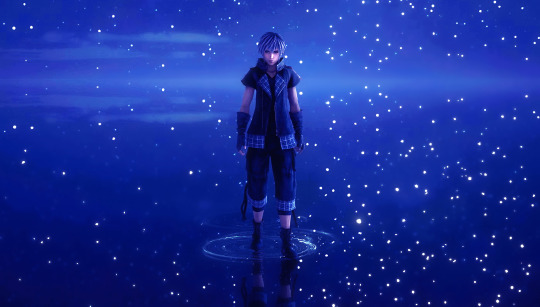
TWO. ┆ A SEA OF STARS - THE FINAL WORLD
There has been a lot of speculation about the ‘FINAL WORLD’ we see at the end of the Re//Mind trailer, and whether it IS EVEN the Final World, or the SAME 'Final World’ we have been visiting thus far with SORA.
So far, YOZORA’S WORLD has only been depicted at night. This, PAIRED with Yozora’s name meaning ‘night sky’, could imply that YOZORA HIMSELF caused the Final World to shift from DAY to NIGHT. The two ‘Final Worlds’ are one and the same.
But WHAT IS the Final World exactly? Chirithy describes the FINAL WORLD as a place where “the edges of sleep and death touch”, and that Sora had VISITED the Final World “more than once before on his visits to the Station of Awakening”. Chirithy also mentions that SORA previously came to the Final World “out of his own choice” and can’t just “wander out like his other visits”, when he came to the Final World after PERISHING at the Keyblade Graveyard. The fact that Sora QUESTIONED “What is the Final World?”, despite visiting NUMEROUS TIMES before, implies only one thing: Sora visits the Final World in his DREAMS. And, like most humans upon awakening, he fails to REMEMBER what he dreamt.
The fact that YOZORA is also present in the Final World, in a fully CORPOREAL FORM, implies that he also visits the Final World in his DREAMS, rather than simply arriving there after PERISHING. Their SHARED LINE from the KH1 opening says it all:
“I’ve been having these weird thoughts lately. Like... is any of this for real? Or not?”
The Final World is a realm one visits on the BRINK OF DEATH, and with Yozora and Sora being agents of DEATH and REBIRTH, they visit this realm even in their SLEEP. Yozora’s visits during his sleep are a PREMONITION orchestrated by the Watchmen of Fate, alluding to his destiny to ascend as the VERUM REX: aka the god of death.
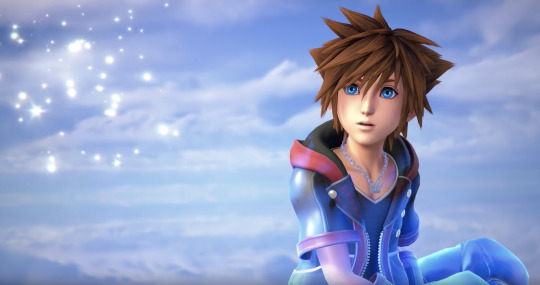
THREE. ┆ A STRONG SENSE OF PURPOSE - THE NAMELESS STAR
I joked a lot about the NAMELESS STAR being Yozora’s love interest, but it may be CLOSER TO CANON than I originally thought: especially given Yozora’s appearance in the FINAL WORLD, and how accurate her DIALOGUE is to Stella Nox Fleuret: the infamous LOVE INTEREST from Nomura’s cancelled project, Versus XIII.
Aside from the obvious indicators ( “They took away my name, everything about me” ), the male she “PINES” for also fits perfectly with MY DEPICTION of Yozora. She mentions that he has been “changed beyond recognition, his heart replaced with another’s”. Aside from the developmental parallels of NOCTIS becoming YOZORA, it’s also accurate to my Yozora’s HEART being replaced with an ASTRAL CORE, with the Gigas experimentation CHANGING HIM beyond recognition ( his hair and eye colour ).
The NAMELESS STAR also mentioned that “were he to regain his old self again, he would be distressed by my absence”. Whatever HAPPENED to Yozora that made him forget about his LOVE INTEREST, his presence in the Final World alongside SORA gives the impression that he has REMEMBERED his love interest, and has come to rescue her-- much has SORA had returned to the Final World to rescue KAIRI.
Delving a teeny bit more into my OWN META here. I find it interesting that the NAMELESS STAR gave Sora advice about how to OVERCOME the TASKS before him. What intrigued me the MOST, is how she mentions his ability to RETAIN his PHYSICAL FORM in the Final World, due to his “strong sense of purpose”. The word ‘PURPOSE’ is distinctly emphasised by her voice actress, so I want to BELIEVE that there is importance to it.
MY PORTRAYAL of Yozora and his world encircles the concept of the ‘KARMA’ that lies inside all humans, as per the back of the VERUM REX BOX COVER in Toy Box. To summarise that post, this KARMA is the sum of a person’s grasp of FATE + CONSEQUENCE, and their connection to the SPIRITUAL REALM. The stronger your hold on your DESTINY, aka your karma, the stronger your CONNECTION to the cosmos. It is Sora’s POWERFUL HOLD ON FATE that gave him his corporeal form in the Final World-- much like YOZORA at the end of the Re//Mind trailer.
It thus becomes obvious that the NAME the Nameless Star whispers to Sora is YOZORA. Which not only explains why he looked so SHOCKED after hearing it, but also why Sora RETURNS to the Final World alone in the Re//Mind trailer. He was explicitly LOOKING FOR YOZORA, and was calling out his name-- and expressed the same level of SHOCK upon discovering that Yozora is MORE THAN just a video game character.
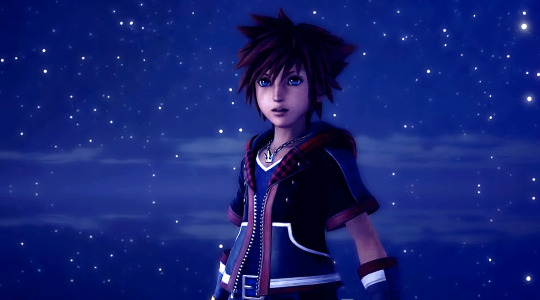
FOUR. ┆ AN AGENT IN THE SHADOWS - YOUNG MASTER XEHANORT
Puzzling enough, the Re//Mind trailers also REVEAL that Young Master Xehanort has been WORKING ALONGSIDE the Master of Masters. How is this relevant to Yozora, you ask? Consider the following:
1. YMX was the MAIN VILLAIN in the Toy Box world. He was responsible for introducing SORA to Verum Rex, quite literally, by THROWING HIM into the Verum Rex video game ( which I canon to be the ‘data’ version of YOZORA’S WORLD... but that’s for another post lol ).
2. YMX is WORKING with MoM, who appears along with Yozora in the SECRET ENDING, in the Shibuya district of Yozora’s world.
3. In Dream Drop Distance, YMX made a PROMISE with two characters from The World Ends with You, a game directed by NOMURA encircling the concept of reapers, also based in SHIBUYA. The promise being to bring them back to their world, if they brought Sora and Riku to him. Perhaps YMX did FULFIL that promise, and RETURNED the TWEWY characters to Shibuya. Which implies that HE KNOWS how to reach Shibuya: where MoM was present.
Nomura mentioned in the KH3 ULTIMANIA, that the Shibuya featured in the SECRET ENDING is in a “different reality” compared to the TWEWY Shibuya. What if the SHIBUYA of Yozora’s world, coexisted with the Shibuya of TWEWY? Much like how the worlds were SPLIT IN TWO, not only in Dream Drop Distance, but in Toy Box as well?
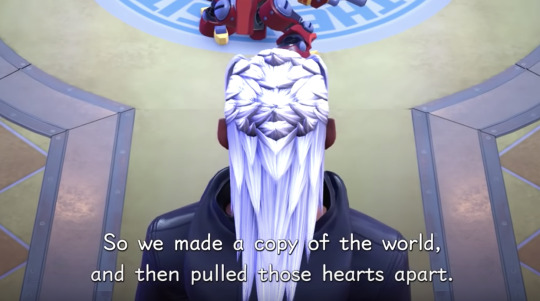
4. More specific to my META for Yozora, YMX finds it INTRIGUING that “even empty puppets can be given strong hearts”, and that “a heart can be placed in a vessel of our choosing”. My Yozora was essentially moulded into a PUPPET of Gigas Corporation after having his heart replaced with an ASTRAL CORE, with the intention of making him rise as a ‘HIGHER BEING’: an elevated version of humanity. Also note how YMX says ‘OUR’... what if he was not alluding to True Organisation XIII... but HIMSELF AND MoM?
5. YMX also plays a ROLE in Sora abusing the power of waking. Before unleashing the FINAL BOSS of Toy Box on Sora, he whispers “Find the hearts joined to yours”. In the Re//Mind trailer, SORA re-emphasises this: “But, follow my heart? Hearts are all connected. Trace the connection!”. YMX also APPEARS again, after Sora dove into all of the Sleeping Worlds, claiming that he nearly “buried himself in the dark of sleep”, TWICE OVER: once in DDD, and once again in KH3-- instances where YMX was both present.
Note how also, Nomura chose SAN FRANSOKYO as the final Sleeping World that Sora reaches, before YMX appears. San Fransokyo being very AESTHETICALLY SIMILAR to Yozora’s world ( Both being TOKYO CODED CITIES, with a night time setting ).
Despite LEADING Sora down this doomed path, YMX WARNS him that there is a “high price to pay” for wielding such power FOOLISHLY, and that he had now “paid (this) price”. The price? HIS OWN LIFE. This is reiterated several times in the GAME and PROMOTIONAL MATERIAL:
a. On the BACK of the Verum Rex box cover in Toy Box, it mentions ‘A JOURNEY WITHOUT A PLACE TO RETURN’.
b. In the Re//Mind trailer: once by XEHANORT himself: “Seeing that you have also taken the FORBIDDEN PATH, you too must be ready to make the ULTIMATE SACRIFICE”.
c. And once again by CHIRITHY, claiming that Sora will “vanish from this world”, and that “without ( his ) powers, ( he ) can’t return to the world ( he ) came from”. Sora has not only LOST the power of waking, but had also SACRIFICED HIS LIFE.
Stranded in the FINAL WORLD, with no one left to turn to, Sora calls out a NAME. The name of a person he knows is COMING to the Final World... to save his lost star.
SHOUTOUT to Steph ( @kyecupio ) for fuelling the big galaxy brain with XEHANORT and YOZORA’S connection fgjhfg.
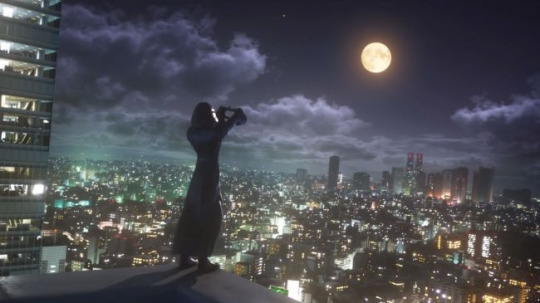
FIVE. ┆ THE WATCHMAN OF FATE - MASTER OF MASTERS
We’ve gotten an INSIGHT into YMX’s intentions, but what has the MoM got to do with all of this? Why does he APPEAR in the secret ending?
We already know that MoM is working alongside YMX from the brief Re//Mind trailer, where it is disclosed that the MoM GIFTED YMX the characteristic black coat that wards off darkness. YMX is also seemingly REPORTING to MoM about a ‘world tour’, which I assume MoM advised him to go on. What is this ‘world tour’? Difficult to tell at this point.
But what I do know is that MoM is OBSESSED on keeping universal order. He created the GAZING EYE to allow himself to see into the future and write the BOOK OF PROPHECIES, and refuses to give LUXU a copy of the book to ‘avoid temporal paradoxes’. Nomura has definitely created an ANTAGONISM between Luxu/Xigbar and Xehanort, especially NOW with it being revealed that YMX is working with MoM.
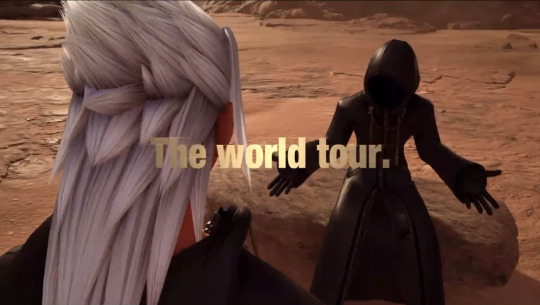
WHATEVER Nomura is planning with LUXU vs MoM/YMX, I can’t be certain. But what I do know, is MoM’s MOTIVES are extremely similar to MY META for the Watchmen of Fate, something I have come up with exclusively for MY PORTRAYAL of Yozora and his world.
The WATCHMEN OF FATE are responsible for maintaining the BALANCE AND ORDER of the universe, and are CHARACTERISED by their dark reaper’s hoods. Note how the MoM never takes his hood off, and this HOOD is strikingly uncanny to a GRIM REAPER. Furthermore, the Watchmen of Fate in my canon are not only NOTED for keeping the order of the universe, but some are also ‘TRICKSTERS’ by nature and occasionally like to manipulate fate. Note how MoM also has a PLAYFUL PERSONALITY despite his wider goal.
I believe the MoM has a greater power in the UNIVERSE, and has advised YMX to lead SORA to the Realm of the Dead where YOZORA resides. For what purpose? To UNITE the agents of DEATH and REBIRTH under the same sky. To fulfil the cycle of KARMA. To achieve the REINCARNATION of all worlds.
To reincarnate Kingdom Hearts.
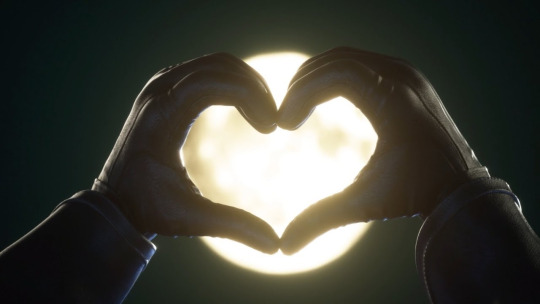
TO CONCLUDE:
1. MoM and YMX are rogue Watchmen of Fate, trying to REBIRTH the universe together via KINGDOM HEARTS.
2. They want to UNITE SORA ( who embodies rebirth ), and YOZORA ( who embodies death ), to achieve the REINCARNATION of the universe ( death + rebirth )
3. SORA is seeking Yozora because he TALKED to the Nameless Star, YOZORA is seeking Sora because he USED the power of waking to REVERSE DEATH, they both meet at the FINAL WORLD. Yozora initiates the BOSS BATTLE because “ you broke the rules, perish ”
4. YMX ( + MoM? ) possibly SPLIT SHIBUYA into two: one comprising of YOZORA’S REALITY, and one comprising of TWEWY’S REALITY ( not sure of the reasons yet but it’s suss )
5. ( Specific to my VERUM REX META ) YMX and MoM are potentially connected to GIGAS CORP, given YMX’s intrigue about placing STRONG HEARTS in EMPTY VESSELS, much like Gigas Corp are, thus already serving as ANTAGONISTS to both Yozora and Sora.
#⚔️ *:・゚✧┆a synthetic heart bled dry by the hands of fate. ❪ headcanons ❫#( this is a mess but i just want to post it jfhjfhg )#( i'll tidy it up later if this makes any sense-- )
17 notes
·
View notes
Text
I Need You: Why Evangelion Still Matters

If you’re even a casual fan of Japanese animation (colloquially known as anime) you’ve probably heard of a few classics held up as the best of the medium; films and television shows whose place in the history of Japanese culture is widely regarded as secure: Akira, Cowboy Bebop, Ghost in the Shell, Spirited Away, to name a few of the most prominent. They all have their critics, but few would dispute their place as landmarks of the industry. But there’s one classic piece of Japanese animation however whose legacy is far more contentious and which sparks controversy even today. Like the aforementioned pieces it’s well-known and has been watched by many, but unlike them it remains quite controversial, beloved by some and derided by others.
I’m talking about Neon Genesis Evangelion,¹ Hideaki Anno’s 1995 post-apocalyptic series about teenagers who pilot giant robots (known as mecha) in a war for the survival of humanity. And in my opinion it’s actually one of the best and most important television shows of all time, animated or not.
(Spoilers ahead, though I’ll try to keep major revelations to a minimum.)
I realize that in making my claim, I’m setting myself up for criticism. The value (or lack thereof) of Neon Genesis Evangelion has been one of the most heated debates in anime fandom for decades. But even on the purely objective level of its influence on the animation industry, both in Japan and beyond, NGE and its subsequent spin-offs, sequels, and re-imaginings is a significant work worth consideration. Although the show is decades old now (the first episode aired October 4, 1995), I believe it’s still worth examining why the show’s so acclaimed and why, in my opinion, it’s still relevant today, in no smal part because of the lessons it still has to teach us about self-acceptance.
(An earlier version of this essay was posted 4 years ago here.)
Weaving a Story
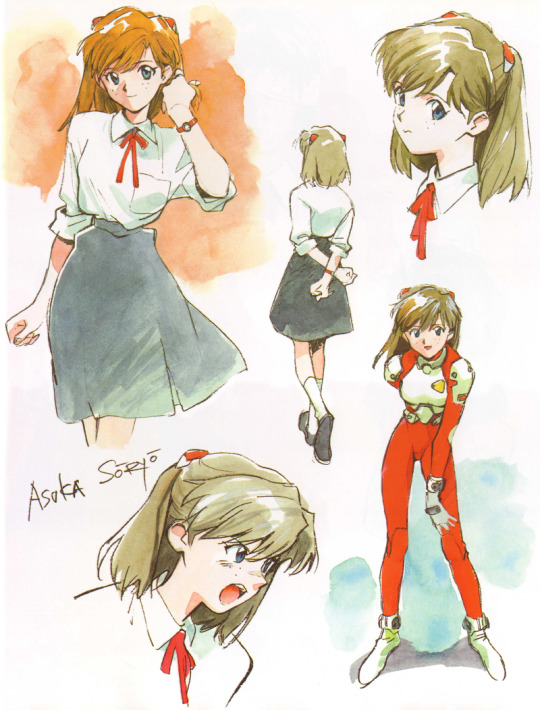
Concept art for Asuka Langley Soryu, the Second Child
Today, Evangelion is a major franchise, incorporating films, comics, video games, and more. But it all started with one TV show, Neon Genesis Evangelion, created by Hideaki Anno for Gainax. Even from the start, NGE was somewhat exceptional. In the early-to-mid 1990s when it was produced, most of the major animated shows on air (both in Japan and America) were heavily merchandise-driven and sponsored by either toy or video game companies. Nearly all were owned by a major studio like Toei or Toho. Conceived of by a single individual and owned by a small creator-run studio, Neon Genesis Evangelion was highly unusual and something of a creative risk.
The story of Neon Genesis Evangelion is, on first glance, nothing remarkable for Japanese animation. A group of teenagers are recruited by a unified global government to pilot giant robots (mecha) in a battle for the survival of humanity. In the process they have to face not only their deadly adversaries but also learn how to work together as a team, overcoming their many differences and personal issues. Gundam, Macross, and Hideaki Anno’s own Gunbuster had all covered similar territory before. But where NGE would go with its premise was far stranger, blending the well-tread concept of adolescent soldiers with theological imagery, Freudian and Lacanian analysis, and abstract writing that soon set the show apart from its contemporaries.
The show quickly caught the fascination of viewers. While Neon Genesis Evangelion started initially with solid but unexceptional ratings, it soon expanded into a massive pop cultural phenomenon as more and more people tuned in to find out what all the fuss was about, eventually reaching 25-30% of the targeted demographic.² The final two episodes, noted for their abstract nature and for seemingly leaving several plot threads hanging, prompted a highly polarized reaction. The follow-up movie The End of Evangelion, released a year later, divided audiences even further. As a consequence, despite Evangelion’s immense popularity and influence, the franchise remains one of the most controversial works to ever air on broadcast television.
Neon Genesis Evangelion’s ending was, however, just one of its controversial aspects. Moral guardians raised complaints about the show’s frank (and frequently bleak) depictions of sex, violence, and mental illness, demanding networks censor its content. Critics such as Eiji Otsuka and Tetsuya Miyazaki accused Anno of “brainwashing” his audience and affirming, rather than criticizing, anime fans’ escapist tendencies. Yoshiyuki Tomino, the director of both Gundam and Ideon, complained that Anno tried “to convince the audience to admit that everybody is sick” and that it “told people it was okay to be depressed.” Additionally, much was made of the show’s religious imagery, particularly due to the then recent sarin gas attacks by the Aum Shinrikyo cult, which like NGE utilized a blend of Western and Japanese religious imagery.
Other complaints centered on NGE’s main characters, many of whom were found to be unlikeable or unheroic. Many attacked the lead protagonist Shinji as weak and indecisive, unbecoming of the hero in a show aimed at adolescents. Some further asserted the character was an attack on the show’s audience and that Anno wanted to “punish” his audience for their anime-loving ways. The rest of the cast didn’t escape criticism either and were variably found to be cruel, schizophrenic, or perverse. All could easily be characterized as dysfunctional.
But despite the backlash against Neon Genesis Evangelion, whether it was centered on the show’s ending, its thematic elements, or its characters’ deficiencies, none of it seemed to put a lasting dent in the show’s influence or popularity. And a lot of that, perhaps, has to do with the time in which it emerged. At the time NGE was originally produced in the early to mid 1990s, Japan was in the midst of an extended economic downturn that would come to be known as the Lost Decade, following a major asset price crash in 1989. During this time, Japanese animation, like many industries, experienced a contraction, resulting in slashed budgets and an increasing reliance on merchandising and product placement to sustain both the studios producing the content and the major networks who broadcasted (and often owned) it.
In addition to these economic concerns, there was also a growing feeling in the 1990s that animation was a thing of the past, whose glory days were long gone and which only inspired passion in either adolescents or callow, sheltered men in their 20s or 30s. The content of most anime was regarded as puerile or derivative and hardly becoming of serious adult interest. The term otaku,³ a word that literally means “house” but was used to mean “shut-in,” quickly became shorthand for anime fans who spent their adulthood collecting memorabilia and memorizing lines from their favorite shows.
But Neon Genesis Evangelion helped to change all that and to reclaim anime’s respectability. Breaking through the traditional animation fandom to a wider audience and owned solely by the creator-run Gainax, NGE was an invigorating shock to the industry, shaking it up and reviving interest in what had been regarded as a dying medium. Within a few short years, new creator-owned studios were cropping up across Japan, a trend which would continue well into the next decade and bear such fruit as Bones, manglobe, Ufotable, or Gainax’s own offshoots Trigger and Khara. The animation industry was expanding again and was beginning to boom overseas, in no small part thanks to the popularity and notoriety of NGE.
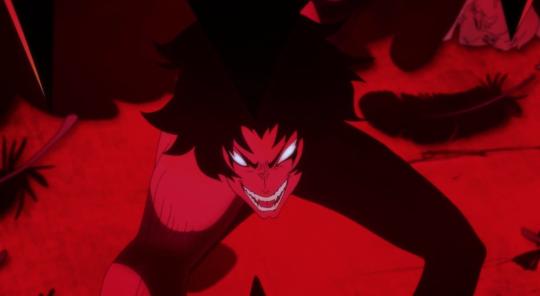
Devilman: Crybaby by Science Saru, a series itself based on one of Evangelion’s chief influences
The new anime boom would also reflect its origins in a number of different ways. More than a few of the new shows to debut in the late 1990s and early 2000s were directly influenced and impacted by Neon Genesis Evangelion, including such notables as RahXephon and Revolutionary Girl Utena. More subtly, the starkly realistic depictions of violence and sexuality in NGE as well as its bizarrely surreal imagery encouraged many directors to try similar techniques, resulting in a shift in style throughout the industry.
Neon Genesis Evangelion’s influence on later anime can be attributed in some ways to its technical sophistication. At its most basic, visceral level, NGE was startling to look at. Even compared with other Gainax works that had come before it, like Nadia: The Secret of Blue Water or Gunbuster, NGE immediately stood out as something unique in an increasingly homogeneous industry. The character designs of Yoshiyuki Sadamoto, strangely subdued yet striking and expressive, helped distinguish the cast while Ikuto Yamashita’s monstrous and biomechanical designs for the Evangelions did the same for the show’s mechs. Combined with the intense direction of Hideaki Anno, Kazuya Tsurumaki, Masayuki, and others NGE drew the eye right from the start.
The technical splendor wasn’t just limited to NGE’s art design or animation either. The voice talents provided by performers like Megumi Ogata, Kotono Mitsuishi, Megumi Hayashibara, and Yuko Miyamura gave life to the characters and helped audiences empathize with them, despite their dysfunctional and emotionally-wrought nature. Also contributing to the audio portion of Neon Genesis Evangelion was Shiro Sagisu, whose music swung significantly from jazzy to melodramatic and even to surreal, changing and evolving to match each scene with an appropriate mood. Assisting Sagisu was the vocal work of artists such as Yoko Takahashi, who made the show’s central theme, “A Cruel Angel’s Thesis,” a pop sensation.
But while the technical triumphs of Neon Genesis Evangelion certainly contributed to the show’s lasting appeal and influence, they’re hardly the whole story. For many viewers, the appeal of Evangelion went well beyond the surface, to narrative and thematic elements they felt spoke directly to them. Indeed, it is arguably NGE’s complex characterization, unorthodox narrative structure, and thematic depth which have made it stand out as one of the most legendary examples of Japanese pop culture.
A Cruel Angel’s Thesis
It’s not an exaggeration to say that essays—and books—have been written about Neon Genesis Evangelion and its thematic qualities. Most of this has been concentrated in Evangelion’s own native Japan, but the sensation has breached the other side of the Pacific as well, resulting in comparisons to the works of David Lynch and other Western directors. Contributing to this no doubt has been Anno’s own numerous references in NGE not only to native Japanese culture but to the West as well, with tributes to works like 2001: A Space Odyssey, The Andromeda Strain, and UFO found frequently throughout.
The most obvious thematic element present in Evangelion, at least to Western eyes, is its frequent allusions to Christianity, Judaism, and Islam. It’s not hard to see why: the monstrous foes besetting humanity are “Angels” who shoot cross-shaped energy bolts, which the main characters fight with “Evangelions” (the Greek word from which “evangelism” derives). Coupled with other bits and pieces here and there referring to original sin, the will of God, and ancient Judaism, these details give Evangelion a strikingly religious appearance to Western viewers.
However, while they’re certainly the most obvious elements in Evangelion, the religious references are also easily some of the most transient and insubstantial. Although initially viewed as central to the plot by many Westerners, it has since been revealed that most of the Biblical references are there for styling rather than substance and were largely intended to make the show stand out. In many respects, the usage of the Abrahamic faiths in Evangelion is similar to the use of Buddhism in The Matrix or Egyptian mythology in Stargate: a bit of fun exoticism to keep things interesting.
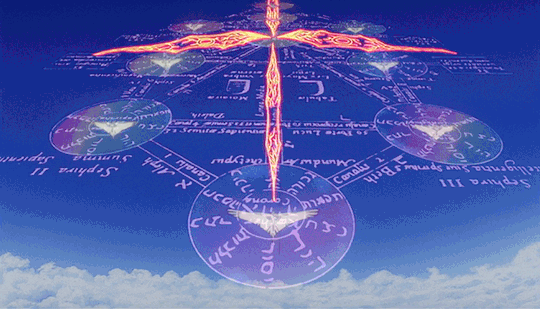
The Sephirot from Kabbalah, as represented in The End of Evangelion
That being said, the religious themes are not as vacuous as is sometimes alleged and the sheer number and obscurity of some of them indicates some real effort on the part of Anno. Each of the Angels, for instance, (which are called shito⁴ in Japanese, meaning “messenger” or “apostle”) are named after actual angels from Abrahamic mythology and their names, when translated from Hebrew or Arabic, often do indicate their nature in some way (e.g., Arael’s name means the “light of God” and it is an enormous winged being who attacks the characters with a beam of light). And while the use of the Kabbalah’s Sephiroth may be perfunctory, many other references to Jewish mysticism appear more meaningful, such as the Chamber of Guf or the duality of the Trees of Life and Wisdom.
Less obvious to Western eyes but possibly even more sophisticated are the references Evangelion makes to non-Abrahamic religions. There is, for example, the notable similarity between what the show terms “Instrumentality” and traditional descriptions of “egoless” nirvana in Buddhism (a religion also referenced by way of the Marduk Institute’s 108 dummy corporations).⁵ Japan’s native religion Shinto also shows its hand, most notably through the depiction of the Evangelions themselves, which Anno consciously designed after the monstrous oni of Japanese legend. All in all, while he may not have intended to portray a particular theological message, it’s clear that Anno put a lot of thought and research into giving Evangelion a suitably mystical appearance.
However, obsessing over the religious imagery in Evangelion obfuscates something far more important: Evangelion isn’t really about religion. Rather, where Evangelion’s thematic depth and complexity most clearly comes into play is psychology and philosophy of the mind.
Neon Genesis Evangelion is often described as a deconstruction of mecha anime. To a large extent that’s true, but it’s deconstruction is specific in outlook, focused on the psychology of its characters in the form of a question: just what kind of people would put the fate of humanity in the hands of adolescent children? And just what would that kind of stress and responsibility do to a child’s mind? In that regard, NGE is in far closer in kinship to Ender’s Game than to its natural predecessors like Macross, Gundam, or Gunbuster.
When the story of Neon Genesis Evangeliom begins, the world has already experienced disaster on an unprecedented scale. 14 years before the show begins, a massive apocalyptic event called the Second Impact devastated the Earth’s climate, precipitated global nuclear war, awakened the monstrous Angels, and resulted in the deaths of half of all humans on the planet. In response, civilization has been restructured and militarized in anticipation of an even worse Third Impact threatened by the Angels. To combat this threat, the secretive organization Nerv assembles biomechanical monsters of their own (the Evangelions) which, as it so happens, can only be piloted by teenagers.⁶
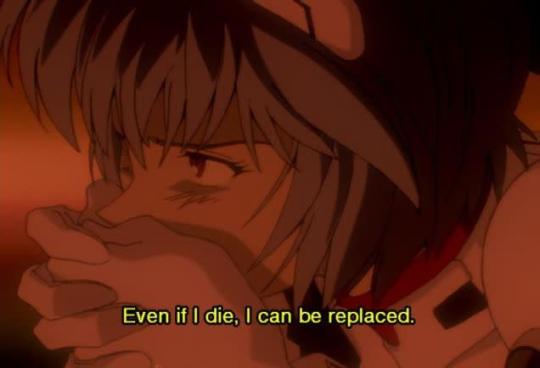
Rei Ayanami, the First Child, believes that her life is expendable
This is the kind of world people like Misato Katsuragi, Gendo Ikari, and Ritsuko Akagi live in and it’s the severity of their situation which ultimately shapes their actions. Although many of the adults, particularly Misato, wish they could let the series’ child protagonists lead a normal life, they know that’s not an option. As a result, the adult characters are driven towards a cold pragmatism that means, no matter how warm or compassionate they may act towards their wards at any given time, they’re still ready to sacrifice them when necessary.
This ruthless approach has its costs, however. The constant pressure to succeed, alongside the emotional whiplash they receive at the hands of the pilots’ supervisors and the repeated trauma they experience in combat results in each pilot’s gradual psychological degradation. Beginning as relatively competent and capable (if slightly dysfunctional) individuals, each pilot eventually succumbs to their trauma and breaks, causing them to isolate themselves from one another and resulting in a breakdown in morale which puts not only themselves but humanity itself at risk.
In keeping with this theme of psychological frailty and the ways in which we as people both intentionally and unintentionally harm those we care about, including those we care about, the series makes numerous allusions to the work of past psychologists and philosophers. Many concepts are mentioned specifically by name, such as the “oral stage,” “separation anxiety,” or the “hedgehog’s dilemma,” while others are alluded to more subtly, such as the Oedipus and Elektra complexes, post-traumatic stress disorder, schizophrenia, or Lacan’s dichotomy of the constructed and ideal selves.
Hideaki Anno has himself said he researched psychology both before and during the production of Neon Genesis Evangelion and that many of the show’s characters are based upon both these concepts and his own experiences. He has, for instance, described the protagonist Shinji as a reflection of his own conscious self, while the emotionally withdrawn Rei is a manifestation of his unconscious, and the enigmatic Kaworu is his Jungian shadow. Altogether, the works of Freud, Lacan, Schopenhauer, Hegel, Jung, and Sartre have all been identified by staff or critics as influences on the show’s characters and plot.
One of the chief psychological themes in Evangelion is abandonment, particularly by those you love or have been cared for by. Throughout the story—in its past, present, and future—each of the main characters is abandoned by people important to them: their parents, their guardians, their lovers, their friends, etc. Invariably, this abandonment leads to a breakdown in identity and self-confidence, as each character is forced to redefine themselves from within after devoting so much of their identity to how they were perceived by others. Thematically matching to this issue of personal abandonment is humanity’s own abandonment by their unknowable creator eons ago, a detail alluded to occasionally as the story progresses. Like the individual characters then, humanity must learn how to manage and master its own fate when it has no one left to depend upon.
The Hedgehog’s Dilemma
These themes, however, would have little resonance were they irrelevant to the show’s human drama. It is to Neon Genesis Evangelion’s credit that they are not; each of the characters represent the show’s themes in both significant and personal ways. It is quite arguable then that it is the show’s protagonists, however controversial they may be either as individuals or an ensemble, which have truly allowed NGE to endure for decades as an icon of Japanese pop culture.
The most important of Neon Genesis Evangelion’s characters by far is easily Shinji Ikari, the pilot of Evangelion Unit-01 and the son of Gendo Ikari, the enigmatic director of the Evangelion program. At the beginning of the series Shinji is called to Nerv by his father, who abandoned him years earlier following the death of Shinji’s mother. Shinji hopes that this sudden call is for the purpose of reunion, but he is quickly disillusioned when his father reveals to him that he needs Shinji to pilot one of the monstrous Evangelions he’s built—a machine Shinji has hitherto never heard of—and to save humanity from extinction. Brokenhearted by his father’s coldness and terrified of the task he’s been blackmailed into performing, Shinji puts off his own desires and self-identity aside for the sake of pleasing his father and others, becoming the so-called Third Child.

Series protagonist Shinji Ikari, the Third Child
Shinji’s a complicated character and one many find difficult to empathize with. He is self-consciously cowardly and phlegmatic, prone to self-criticism, and afraid of getting close to others for fear that they’ll reject him. At times he thinks seriously about running away from his responsibilities, but whenever he actually does he quickly returns, unable to commit to so blatant an act of rebellion for long. Despite this and despite his own reliance on others to define his value, Shinji does have his virtues: he’s thoughtful, easy to get along with, and proves remarkably skilled at piloting, even if he has no real passion for it.
Shinji’s commanding officer, Misato Katsuragi, is NGE’s most prominent adult character and (according to Hideaki Anno) the series’ deuteragonist.⁸ Loud, goofy, and irreverent, Misato strikes quite a different first impression than Shinji, but despite their outward differences they’re actually quite similar people with comparable issues, merely approaching them in different manners. Like Shinji, Misato feels abandoned by her father, who neglected her and her mother before his death years ago. But despite that Misato still yearns for his affection, manifesting her desires in the form of her relationship with Ryoji Kaji, a coworker and lover she admits resembles her father. And, also like Shinji, Misato fears getting close to other people for fear of being hurt, but whereas Shinji manages his anxiety by avoiding people, Misato does so by acting flippant and flirtatious in public, living lightly and maintaining only “surface level relationships.”
Shinji’s move into Misato’s apartment comes largely at her insistence and Shinji is initially quite uncomfortable with it, a feeling which does not subside when he learns she’s an extremely messy housekeeper and an alcoholic. But despite her irreverent personality, Misato turns out to be a deeply caring person who wants very much for Shinji to be happy and, over the course of the series, she tries to direct the development of Shinji as a good parent would, all the while concerned her own flaws make her an unsuitable guardian. Notably, these moments where the two of them bond are some of the most light-hearted in the series.
Although Shinji is the first pilot the series introduces, he is preceded by two others at Nerv. The first, Rei Ayanami, is arguably Neon Genesis Evangelion’s most popular (and certainly influential) character. Enigmatic and asocial to a degree that goes beyond mere awkwardness, Rei lives alone in a desolate apartment she doesn’t even bother to clean, close to no one but her pseudo-guardian Gendo Ikari. Because of her closeness to his father, who has raised her as his own daughter, Shinji initially sees Rei as a replacement for him. It soon becomes apparent however that Rei’s trust and faith in Gendo go well beyond that of a healthy parent-child dynamic. Obedient to a fault and unconcered for her own well-being, Rei causally throws herself into danger for Gendo and Nerv and comes across as emotionless to those around her.
But beneath Rei’s cold, ultra-stoic exterior beats a heart as capable of joy and sorrow as that of any other. Far from the robotic doll many assume her to be, Rei has a secret yearning for others to understand her and her them and, over the course of the series, slowly opens up to Shinji. But although she desires human contact, she doesn’t really know how to initiate it and she’s terrified of the possibility that there’s something about her that makes her fundamentally unlike other people.
Asuka Langley Soryu, the third of the child protagonists to show up,⁷ strikes about as strong a contrast to Rei as one can imagine. Egotistical, loud-mouthed, and possessed of far more bravado than either Shinji or Rei, Asuka joins the cast about a third of the way through the show, after transferring from Nerv’s facility in Germany. Raised since childhood to be a pilot, Asuka prides herself on her skills and looks with disdain on Shinji’s self-deprecating nature and inability to recognize his own accomplishments. Already a college graduate and convinced she’s as much an adult as anyone, Asuka also proves precociously sexual, pining for both Misato’s lover Kaji and, to a lesser but still significant extent, Shinji himself, whom she frequently teases for attention.
Asuka is like Shinji a controversial character; people often look at Asuka and see one of two sides to her: a selfish jerk who bullies Shinji and Rei or an accomplished young woman whose confidence and inner strength makes her the real hero of the show. The truth, however, is that in many ways she’s both. Asuka really is brave—far braver than Shinji or even Rei, who doesn’t really fear death—and she’s definitely skilled. But she’s also prone to jealousy and vindictiveness, as well as a consciously manifested attitude of not caring for anyone. In many ways, however, her bravado is a cover for own insecurity, built upon the belief that no one really likes or loves her.
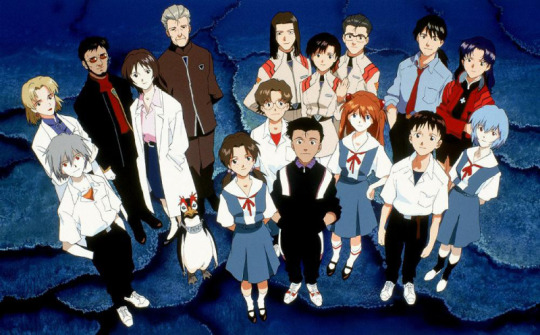
The cast of the original Neon Genesis Evangelion
There’s a lot to admire about NGE’s characters, even with all their flaws and personality disorders. It’s easily got one of the most complex and diverse casts in anime and there has to be something said for the fact that of its four principal characters, three are female, allowing it to easily pass the Bechdel-Wallace Test (which it does). The characters each have their own virtues, which in a more easygoing series could make them quite endearing. Lead protagonist Shinji’s selfless and has a fairly noble streak, though it’s hidden deep beneath his own self-doubt and loathing. The adult Misato’s fairly protective of her young charges, at least insofar as she is allowed to be given the circumstances, and is also quite a bit more capable than many expect. Selfless Rei’s loyalty and discipline easily make her one of the most sympathetic characters in the series, even if she does sometimes come across as alien or inhuman. And there’s little question that the daring Asuka has enough chutzpah for the whole cast.
But it could also be argued that the complexity and harshness of NGE’s characters which ultimately make them work, even if at times they also make the show hard to watch. Shinji, Misato, Rei, and Asuka are not the idealized paragons of humanity you’d expect to find in most television shows aimed at teenagers, but they’re not the imaginings of a bitter misanthrope either. They’re deeply flawed, yes, and when they’re hurt they keep on hurting, but they also keep going and keep trying to find a way to live with others that doesn’t result in pain. It’s this idea, the recognition that people screw up and hurt one another but want to do better, that really enlivens the franchise. For all the reputed darkness of Evangelion’s story, it is in many ways idealistic, always hopeful that it’s characters might find a way to be happy. You don’t have to be broken, it says, even if you are damaged.
And it is that core ethos of qualified hope that elevates Neon Genesis Evangelion from just another mecha anime or even a deconstruction of mecha to something more. Something sublime and, in its own strange way, even inspirational.
The Sickness unto Death
At this point I feel it’s useful to provide some personal background. I first watched Neon Genesis Evangelion when I was in high school, sometime between my third and fourth years. My initial reaction was, I think, largely typical. The first episodes interested me and as the storyline moved forward and became more complex, I became more invested in the show’s events and characters. I even appreciated to some extent the bizarre and abstract final two episodes, though I’d hoped for a more conventional ending. Then, I watched The End of Evangelion, whoch left me shocked and dismayed at its harshness. I still cared about the series, but I felt more ambivalent as a result.
Over the next few years I continued to keep up with the Evangelion fandom to a small extent, checking out the rumors about the new movies and reading some fan fiction online, but I gradually drifted away. None of the fan speculation or fiction really seemed to scratch the same itch the original series had and eventually my interests in anime shifted more towards Ghost in the Shell: Stand Alone Complex and Fullmetal Alchemist. Evangelion, as much as I’d enjoyed it before, fell gradually into the background of my life.
And then I entered college.
In my youth, I was generally regarded as a “bright” student, fawned over by teachers and regarded by my peers as either a genius or a “know-it-all,” depending on how much they liked me (or didn’t). As I entered the final years of high school it was clear that I was expected to excel in university. But when I actually began my college career I quickly faltered. Depressed, socially isolated, and exhausted from getting four to six hours of sleep a night, my grades slipped quickly and my social life evaporated. For awhile, I tried to deny my problems and ignore them, believing I could power through without help. Eventually, though, I had no choice but to confront my issues: I was put on academic suspension and my financial assistance was pulled.
I was devastated. I had no idea what to do. I didn’t know how to tell my parents, who I’d let believe I was doing fine. I didn’t know where to go with my life now that I’d failed to live up to the expectations I’d allowed other people to put on me. I didn’t even really know who I was anymore. If I wasn’t a brilliant student and child genius, who was I? In my own eyes I was worthless and contemptible.
Eventually, with the help of my family and friends, as well as staff from the university, I was able to make my way back to daylight. I began to undertake counseling. I went to community college to bring my GPA back up. I started talking more openly with my loved ones about my problems, even though I was worried it would make them think less of me. And I began to be more honest about my flaws and limitations.
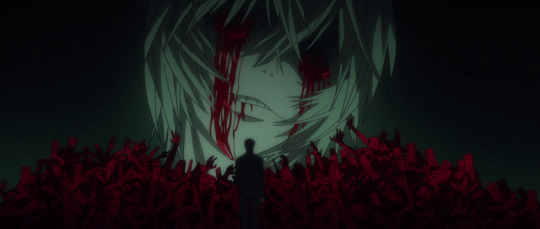
A scene from Evangelion 3.0: You Can (Not) Redo, the third Rebuild film
It was also around this time, rather coincidentally, that I began to seriously revisit Evangelion. I was prompted, as much as by anything else, by the release of the new “Rebuild of Evangelion” films. After my brothers and I attended a screening of the second film’s release in early 2011 with several of our friends, the latter (hitherto unfamiliar with Evangelion) expressed interest in catching up with the franchise. Indulging them, my brothers and I rewatched the original TV series. To my surprise, I began to see the series in a new light. Where once I had simply been sympathetic to Shinji, Misato, Rei, and Asuka’s inner turmoil, now I felt deeply empathetic. Where previously the show’s harshness had at times alienated me, now it felt deeply relatable and truthful. And where earlier the TV show’s decision to focus on the internal psyches of its main characters instead of the plot had puzzled me before, now I felt as if I understood it completely. I even began to appreciate the theatrical finale, a film so brutal some regard it (falsely) as Anno’s revenge against fans angry with him for the original ending.
What had changed? Certainly not the show. Rather, it was my perspective. I possessed now of a viewpoint I hadn’t held earlier. I knew now what it was like to be full of contempt for one’s self, to be a defeated shell of a person who felt as though their value was slipping away or was already entirely absent. I knew what it was like to believe I was a failure in every meaningful way. In other words, I’d gained the perspective of a person suffering from depression. The same perspective as that of Evangelion’s principal characters as well as their creator, Hideaki Anno.
It’s hardly secret knowledge that Hideaki Anno was suffering from depression when he first created Neon Genesis Evangelion. The extent of his depression, however, was far graver than is generally recognized. When Anno began work on the project that would become NGE, he had already been suffering from severe depression for at least four years. In a statement released with the first volume of Evangelion’s manga (comic) adaptation Anno described himself as “a broken man... who ran away for four years, one who was simply not dead.” And while the production of NGE had originally been intended to break him out of a rut, the stress only compounded the severity of his condition. By the time of the show’s completion Anno was, by his own later admission, borderline suicidal.
No one’s ever said precisely what drove Anno over the edge publicly, but it’s widely agreed it had much to do with the production of his previous work, Nadia: The Secret of Blue Water. Originally conceived by Anno’s mentor Hayao Miyazaki in the mid-1980s Nadia was eventually handed off to Anno after Gainax made a bid for the project. Far gentler and family-friendly than NGE, the comparative sweetness of Nadia obscured a troubled production that saw animation work outsourced and Anno frequently butting heads with NHK, the series’ broadcaster, over the show’s content and creative direction. Coupled with rumored trouble in Anno’s personal life, the experience proved too much for him, driving him into the deep depression that would haunt him for most of the 1990s.
The roots of Anno’s emotional troubles may go deeper, however. Long regarded by those close to him as a lonely and eccentric oddball, Anno was socially withdrawn as a child, preferring to spend his time watching and recreating scenes from his favorite anime and tokusatsu to interacting with others, a choice he’d later say he regretted. In 1983, due in large part to his social isolation and inactivity at school, he dropped out of university and lived homeless for a time before he was discovered by Miyazaki and employed as an animator for Nausicaä of the Valley of the Wind. The experience proved vital to his career and soon afterward he and a few friends gathered to form Gainax, their own animation studio. It was during this time that Anno directed Gunbuster alongside working on other projects such as Royal Space Force: The Wings of Honnêamise and Grave of the Fireflies. For a time, he seemed happy. But then came Nadia and he withdrew entirely from his work and social life, before reemerging to work on Evangelion.
Anno’s turbulent life and emotional turmoil is reflected in the characters of Evangelion, many of whom enter the story damaged but apparently functional only to completely fall apart later on. Shinji is lonely and dependent when he first appears, but he still manages to form friendships and do what’s required of him. Misato may be an alcoholic with a mess of a home, but Nerv’s trust in her is rewarded time and time again by her effectual planning and coordination of her pilots. Rei’s cold and emotionally withdrawn, but her dutiful selflessness both inspires and attracts others to her. Asuka can be arrogant and reckless, but she’s also intelligent and capable of real kindness towards those she respects. Like Anno in the early days of Gainax, they all seem to be on top of things.
But just when it seems like the team’s getting the hang of things and finding their groove, disaster strikes. Soon, as one crisis mounts on top of another, from near-death experiences to being forced to hurt his friends, everything falls apart. Shinji’s newfound self-confidence shatters and he becomes even more needy than before. Misato’s constructed domestic bliss blows apart just as her own convictions are thrown into question by new revelations about her work. Rei becomes colder and more distant than ever before, withdrawing even from Gendo, the one person she trusts implicitly. And Asuka collapses into a pit of self-loathing despair, savagely lashing out at anyone who gets close to her. It’s ugly, it’s nasty, and it’s real.
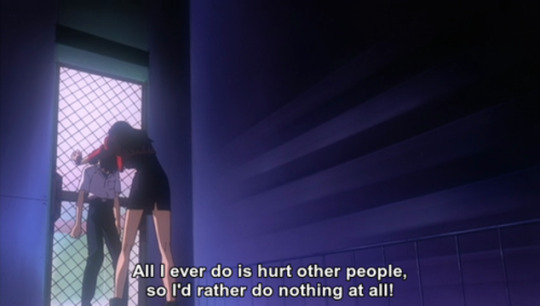
Shinji admits to his feelings of worthlessness to Misato Katsuragi, his guardian and confidante, in The End of Evangelion
This cycle of crash, despair, and recovery is not unusual for suffers of depression. Contrary to what is often thought, depression is not really something you have at one point in your life and then “get over;” it’s something that can shadow you your entire life, kept in check by momentary pleasures and good times but always threatening to surge and overwhelm you when things go awry, sending you into a spiral of self-hate and abnegation that can last for weeks, months, or even years. Friends and family help keep it in check, as does therapy and pharmaceuticals, but it never goes away completely. The only thing you can do is recognize the symptoms and do your best to confront them. You have to keep going. You can’t let your fears drive you to abandon the world. You must not, in other words, run away.
And really that’s what the characters’ struggles in Evangelion come down to: facing reality and acknowledging their flaws while also recognizing their own potential to overcome them and the painful struggle for acceptance we all, on some level, endure. The first instinct of every character in the series is to run away from their problems, to obscure them with outwardly derived duties, relationships, or purposes. Shinji and Rei both look to Gendo, Misato to her job, and Asuka to her pride as an Eva pilot, but all of them are running away and, as a consequence, are unprepared to deal with reality when it hits them flat in the face.
Or are they?
As Long As You Try to Continue to Live
It’s worth noting that when Anno created Neon Genesis Evangelion he didn’t initially set out to create a dark and cynical deconstruction of mecha anime. When asked what initially gave him the impetus to create NGE, Anno has said repeatedly that he originally meant to make a show more in the spirit of Gundam or Space Battleship Yamato, two of his favorite TV shows from his youth, but without the shackles inherent to sponsorship by a toy company, as was common practice for anime at the time. “I made Evangelion to make me happy and to make anime lovers happy,” he said in a 1996 interview, “in trying to bring together the broadest audience possible.”
But as pre-production on the series progressed (and his emotional state regressed) Anno became further disenchanted at the state of anime, concerned that fans were turning to it as a way to escape reality as he himself felt compelled to. “I wonder if a person over the age of twenty who likes robot anime is really happy,” he stated in an article for Newtype half a year before the series aired. This change in perspective, coupled with his resurgent depression, caused Anno to shift focus as he became more and more concerned with the characters’ emotional development, hoping that by the end of the series’ narrative “the heroes would change,” breaking away from their regressed emotional state and achieving the same emotional well-being and self-dependence Anno still sought for himself and which he felt his audience needed as well.
It’s this perspective of Anno’s—that anime otaku were and are caught in a kind of prolonged childhood—which has led to the impression that Anno hates otaku and believes their lives to be worthless. But the truth is that Anno’s thoughts on the subject are quite a bit subtler and more reflective than many give him credit for. Far from hating otaku, Anno counts himself among them and feels defensive whenever they’re derided by others. The issue, he thinks, is less that otaku are permanently stunted and more that they’re afraid or reluctant to open themselves to new experiences:
“I feel that otaku have already become common to all countries. In Europe, in Korea, in Taiwan, in Hong Kong, in America, otaku really do not change. I think that this is amazing. I say critical things towards otaku, but I don’t reject them. I only say that we should take a step back and be self-conscious about these things. I think it’s perfectly fine so long as you act with an awareness of what you are doing, self-conscious and cognizant of the current situation. I’m just not sure it’s a good thing to reach the point where you cut yourself off from society. I don’t understand the greatness of society, either. So I have no intention of going so far as to call for people to give up otaku-like things and become more suited to society. Only, I think there are many other interesting things in the world, and we don’t have to reject them.”
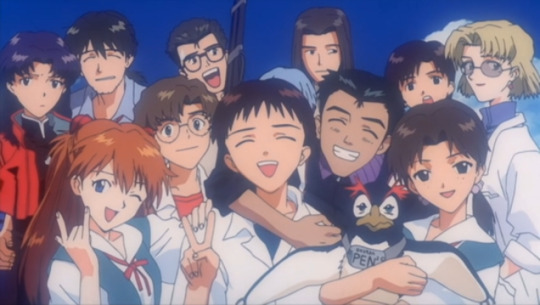
Despite everything, the characters still care for and want to see one another happy
And that’s what I mean by Evangelion’s subtle, qualified idealism. Despite Anno’s frequent cynicism and troubled state of mind during the production of the series, it’s clear that at heart he’s a person who believes people can change and improve themselves. He’s someone who believes that, even in the worst or most desperate of situations, people can find happiness if they’re open to it. “As long as you try to continue to live,” one character states in The End of Evangelion, “any place can be a heaven… there’s a chance to become happy everywhere.”
It would certainly be easy to define the characters of Evangelion by their failures and—given the magnitude of their failures—it’s understandable why many do. After all, much of the series’ narrative is caught up (as I noted earlier) in deconstructing the kind of scenario typical of mecha shows and examing what really would happen if teenagers were put in charge of the world’s salvation. As such, as in other deconstructionist narratives (such as the Battlestar Galactica reboot or Watchmen), the characters screw up about at least as often as they succeed.
That being said, more often than not, when the characters are hit with tragedy or trauma, they eventually recover and bounce back. They’re definitely damaged and shaken by their experiences, but they keep on going anyway. As much as Shinji fears and abhors piloting he’s also someone who, when people are really depending on him, will almost always get right back in the cockpit and try to help. Rei may be over-compliant and lack any regard for herself, but she’s also capable of defying orders when she knows they’re wrong. And for all Asuka’s jealousy and grandstanding, she’s also a person deeply capable of love and self-sacrifice, who would die for those she cares about.
This ray of hope at the core of Evangelion’s story is made most clear in the television series’ original broadcast ending, wherein Shinji rediscovers his own self-value and the joy of living in a world with other people and declares that, although he hates himself, “maybe, maybe I could love myself. Maybe, my life can have a greater value.” But such idealism is even found in the much more outwardly harsh vision of The End of Evangelion. After coming face to face with the world he thought he desired—a world without pain or individuality—Shinji realizes that it’s also a world without happiness. “This isn’t right,” he says. “There was nothing good in the place I ran to, either. After all, I didn’t exist there... which is the same as no one existing.” Realizing this, Shinji chooses to return to the physical world he knew, even if it means feeling pain again.
The idea that joy and pain are in many ways coterminous with one another is hardly original to Evangelion; indeed, it’s a fairly important concept to Buddhism. But I’ve rarely seen the idea expressed in quite the same way as Evangelion, in a way that’s both fully formed and strangely life-affirming. Pain is inevitable, but so is joy. You’ll be hurt, but it’s better than never feeling anything at all and may only give you more appreciation for what you have. You may feel alone, but you’re not; everyone suffers in their life at one point or another, and you don’t have to carry that burden by yourself.
Reflecting upon and considering these themes through Evangelion, as I rediscovered it during a low point in my life, allowed me to appreciate it in a way I’d never been able to before. And it also helped me to move on with my life, to accept the losses I could never recover while also believing it didn’t mean my own life was over. Like Shinji, Misato, Rei, and Asuka, I didn’t have to be defeated by my experiences. I could keep on going. I didn’t have to run away. And that’s a message I believe everyone needs to hear at least once in their life.
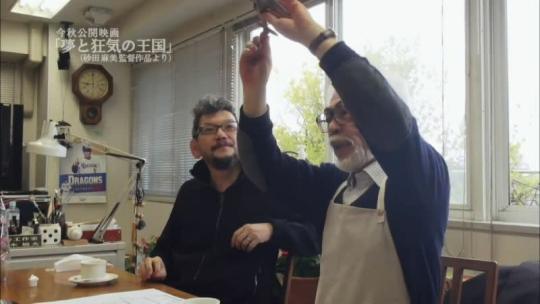
Series creator Hideaki Anno (left) with mentor Hayao Miyazaki (right)
Today, Hideaki Anno has found some peace of mind. He’s happily married, the head of his own production company, and he’s physically healthier too. He still suffers from depression—he’s not cured by any means and he probably never will be; depression isn’t that kind of disease. But he’s able to fight it now and to find the happiness he once believed illusory. He has the same hope he wanted his characters to find in Evangelion. And which I also feel I’ve found, in some small part, thanks to him.
¹Throughout this essay, Neon Genesis Evangelion or NGE refers to the original TV series, The End of Evangelion refers to its theatrical sequel, Rebuild of Evangelion refers to the series of rebooted films produced decades later, and Evangelion on its own refers to the franchise as a whole.
²Specifically, shōnen, meaning boys aged between 12 and 18.
³The term has since been adopted by Western anime fans, but in Japan the word does not necessarily refer to animation fans specifically but to anyone with an obsessive interest in something.
⁴Ironically, “messenger” is a literal translation of the word angelos from Greek—the origin of the English word “angel”—as well as the original Hebrew mal’akh.
⁵The numbers 8 and 108 are both significant in Buddhism. 8 refers to the Noble Eighfold Path to enlightenment. 108 refers to several things, including the number of beads in a Vajrayana prayer rosary, the number of questions asked of the Gautama Buddha in the Lankavatara Sutra, or the number of times Japanese Buddhist temples ring a bell on New Year’s.
⁶The reason for this is never fully explained. Behind the scenes, this was largely because of the show’s target demographic. In universe though it may be related to the secret nature of the Evangelions themselves, which have human souls.
⁷Deuteragonist is a term which means the second-most important character with whom the audience’s sympathies are intended to lie.
⁸Though referred to as the Second Child(ren) because she was the second candidate approved to pilot Evangelions, before Shinji but after Rei.
43 notes
·
View notes